THE VIGORNIAN

December,


December,
VOL. I CHRISTMAS, 1966 No. 6
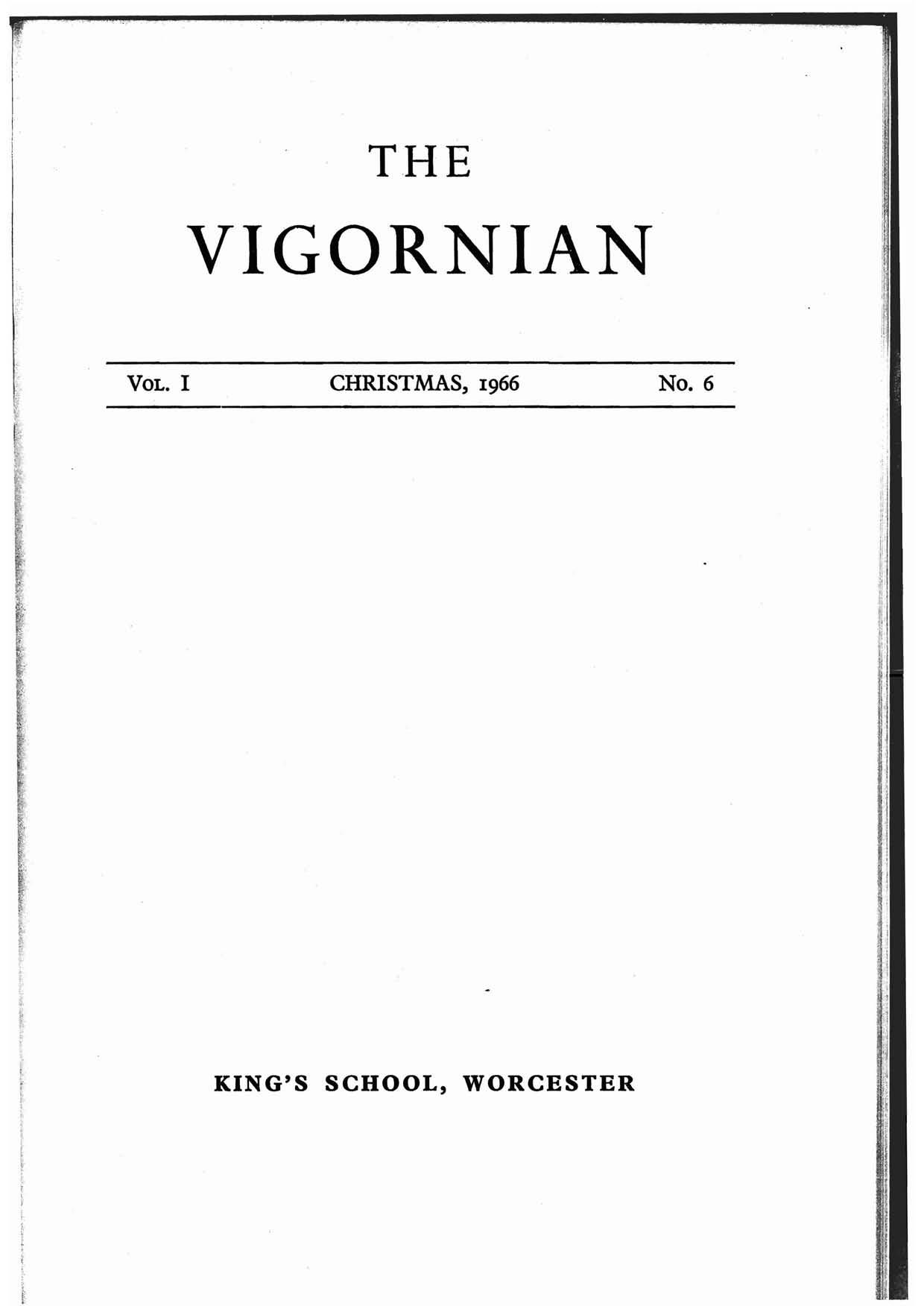
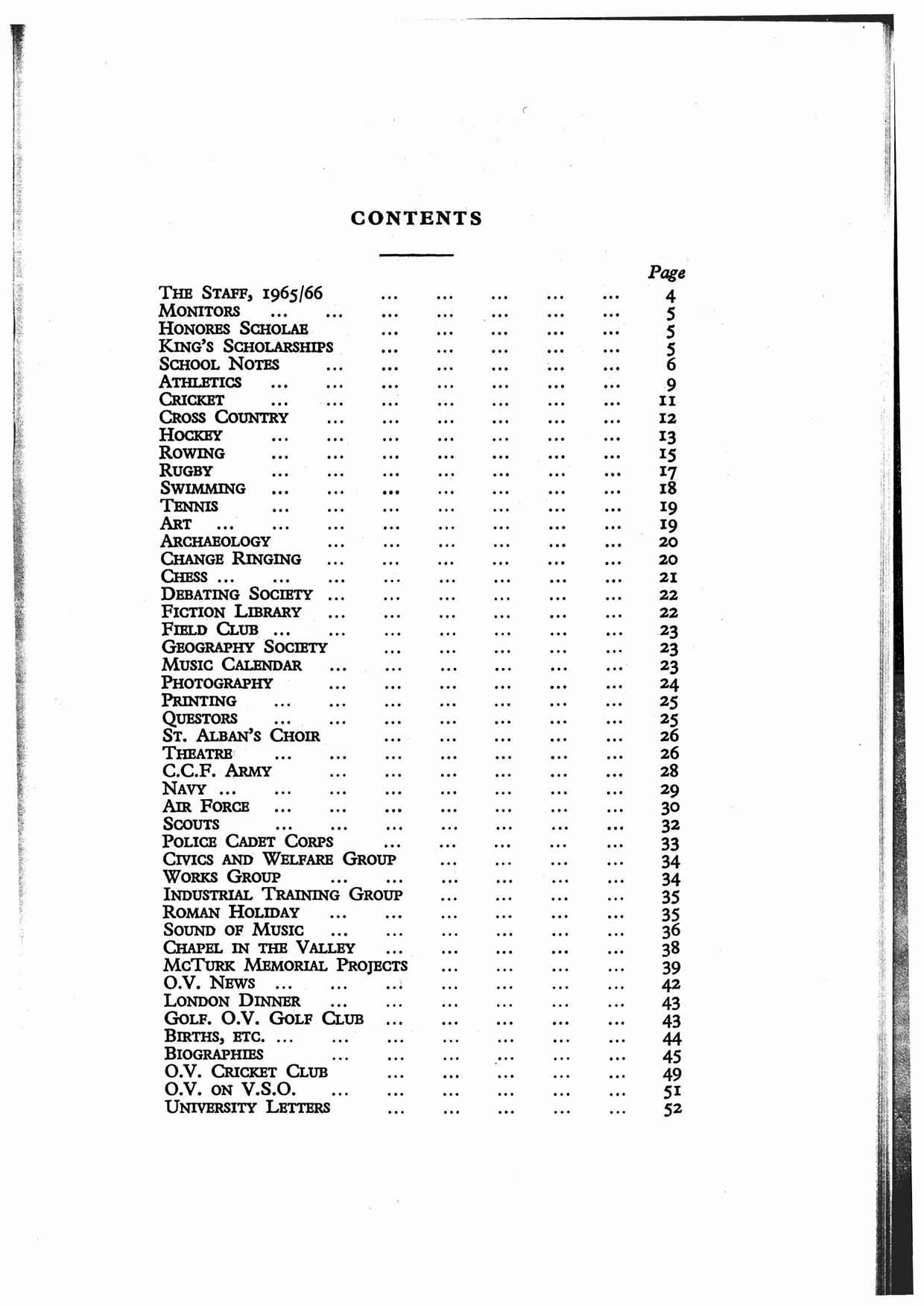
SCHOOL NOTES
ATHLETICS CRICKET
CRoss COUNTRY
HOCKEY ROWING
RUGBY SWIMMING TENNIs ART ARCHAEOLOGY
CHANGE RINGING CHEss ...
DEBATING SOCmTY FICTION LmRARY FIELD CLUB •••
GEOGRAPHY· SOCmTY
MUSIC CALENDAR PHOTOGRAPHY PRINTING
QUESTORS ••. • •.
ST. ALBAN'S CHOIR
THEATRE:
C.C.F. ARMy
NAVY ••• AIR FORCE SCOUTS
POLICE CADET CORPS
CIVICS AND WELFARE WORKS GROUP GROUP
INDUSTRIAL TRAINING GROUP
ROMAN HOLIDAY
SOUND OF MUSIC
CHAPEL IN THE VALLEY McTURK MEMORIAL PROJECTS
O.V. NEWS •.• LONDON DINNER
GoLF. O.V. GoLF CLUB
BIRTHS, ETC. BIOGRAPHIES
O.V. CRICKET CLUB
O.V. ON V.S.O. UNIVERSITY LETTERS
1965/66
Headmaster: D. M. Annett, M.A.
Second Master: H. Ferrar,
A. D. Franklin, M.A.
N. E. Dilks, B.A.
H. A. Natan
S. R. Sheppard, B.A., T.D.
L. M. Bailey, B.A., T.D.
J. M. Cash, M.C., M.A.
F. R. Logan, B.Se.
R. D. Knight, M.A.
P. G. L. CurIe, M.A.
R. H. West
K. P. Barnett, M.A.
F. S. Suteliffe, M.A.
A. H. Aldridge, M.A.
M. Shayer, M.A.
J. R. Barrett
T. L. Vivian, A.T.D. (Art)
D. Anderton, M.A.
A. L. Staeey, M.A.
D. R. Leonard

Revd. B. J. Dickson, B. Se.. (Chaplain)
J. R. Turner, B.Se. (Careers)
M. J. Points, M.A.
M. G. East, M.A., A.Inst. P.
T. D. R. Hiekson, B.A.
R. J. HazeIdine (P.E.)
Revd. L. D. Milliner, B.Se., C.F. (Retd.)
M. S. Fagg, M.A.
A. L. Cubberley, M.A.
J. L. K. Bridges, B.Se.
H. W. Bramma, M.A., F.R.C.O. (Music)
Revd. C. E. Beswiek, B.A.
P. D. T. CattermoIe, B.Se.
J. C. Pite, M.A.
G. B. Brown, B.A.
K. R. Burnett, M.A.
D. E. Hargreaves, B.A., M.Se.
Preparatory Department
Master-in-Charge : W. Thomas, M.A.
I. G. L. St. John Mrs W. Thomas, N.F.F.
A. E. Tibbs, B.D. Miss E.E. Tay!or, N.F.F.
Bursar: Group Capt. T. A. F. EIsdon, O.B.E., D.F.C.
MedicalOfficer: Dr. J. M. Duncan, M.B., Ch.B.
Caterer: Mrs N. Robson
Headmaster's Secretaries: Miss J. Yeates, Miss M. E. Baldwin
Accountant: Miss A. Turvey
Head of the School: D. R. Hooper
Second Monitor: V. A. Nicholls
School Monitors :
N. D. S. Bax
A. V. Cook
A. R. Dunn
P. S. G. Durrant
M. G. England
N. C. Garland
A. J. Judd
J. N. Lingard-Lane

M. C. W. Minchin
D. A. Phillips
A. J. Russell
W. J. Scandrett
D. F. Thomas
R. E. Wetson
N. P. Wilson
W. G. Roberts
T. J. M. Caton
Open Scholarship in Modern Languages, New College, Oxford.
Open Exhibition in Mathematics, Christ's College, Cambridge.
The following awards were made as a result of the Scholarship Examination held in May, 1966 :
King's Scholarship on the Foundation
M. S. Tolley, King"s School, Worcester.
Day-boy Scholarship
N. A. Young, The Downs School, Colwall, Malvern.
Honorary Scholarships
G. D. Baxandall, King's School, Worcester.
R. J. Granville, King's School, Worcester.
C. R. J. Byard, King's School, Worcester.
D. C. Bulgin, King's School, Worcester.

WE CONGRATULATE W. G. Roberts and T. J. M. Caton on their Open Awards, and also S. J. Cleobury on being awarded the Organ Studentship at St. John's College, Cambridge. Cleobury had distinguished himself earlier in the year by gaining his A.R.C.O. at the age of seventeen and in addition winning the Limpus Prize for the best performance in the organ-playing section of the A.R.C.O. examination.
At the end of the Summer Term, 1966, Mr A. D.Franklin retired after 44 years on the staff. Mr Franklin had for a long time been the cc doyen" of the establishment ; not only was he rightly regarded as an oracular authority on all matters of Classical lore, but his infallible memory is a storehouse. of information about personalities and events in the School's history. It is good that his connection with the School will even now not be broken, for he is still occupying his house in
College Precincts, and will continue for the time being to preside
over the Stationery Store.
At the same time we said good-bye with regret to another veteran! Sergeant-Major Barrett. Mr Barrett came to the King's School from the Irish Guards in 1947 as Staff Instructor to the O.T.C. (as it then was) and Gym Instructor. In latter years, as his work in the Gym decreased, he had taken charge of the School Cleaners and made himself responsible for many other administrative" odd jobs" around the School. Sgt.-Major Barrett and Mr Franklin have at least two things in common-long years of devoted service to the School, and remarkable gifts as raconteurs ; they will be remembered with gratitude. and affection by many generations of O.V.s.
The Revd. L. D. Milliner left the staff at Easter, 1966, to return to parochial work, and his place in the Chemistry laboratories during the Summer Term was courageously taken by Guy Claxton, who had left School at Christmas and is now up at Cambridge.
In September, 1966, we welcomed to the staff Mr J. D. Haden (St. Catherine's College, Oxford) and Mr C. J. K. Cunningham (Keble College, Oxford). We congratulate Mr I. G. L. St. John on his marriage during the Summer holidays to Miss Vivienne Baker,. and also Mr and Mrs A. L. Stacey and Mr and Mrs J. L. K. Bridges on the birth of daughters.
The vacancy on the Cathedral Chapter and the Governing Body of the King's School caused by Bishop Stuart's retirement has been filled by the appointment of Canon W. E. Purcell, Canon Theologian of I J Coventry Cathedral and Organiser of Religious Broadcasting for the Midland Region of the B.B.C. 10 College Green has been divided into two one of which is now occupied by Canon Purcell, and the other by the Revd. B. J. Dickson and his family, who have moved across from College Yard.
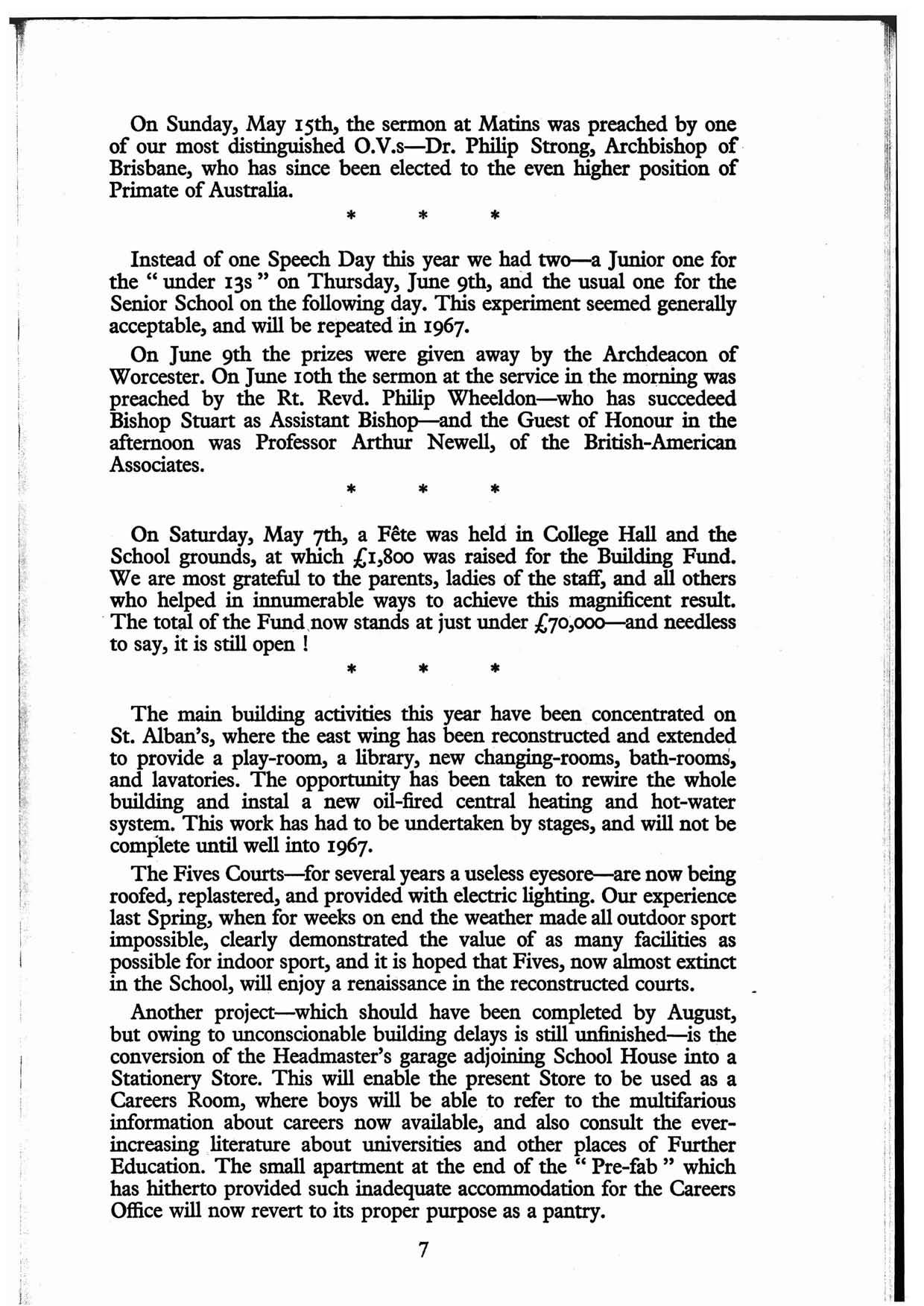
On Sunday, May 15th, the sermon at Matins was preached by one of our most distinguished O.V.s-Dr. Philip Strong, Archbishop of· Brisbane, who has since been elected to the even higher position of Primate of Australia.
Instead of one Speech Day this year we had two-a Junior one for the" under 13s" on Thursday, June 9th, and the usual one for the Senior School on the following day. This experiment seemed generally acceptable, and will be repeated in 1967.
On June 9th the prizes were given away by the Archdeacon of Worcester. On June lOth the sermon at the service in the morning was preached by the Rt. Revd. Philip Wheeldon-who has succedeed Bishop Stuart as Assistant Bishop-and the Guest of Honour in the afternoon was Professor Arthur Newell, of the British-American Associates.
On Saturday, May 7th, a Fete was held in College Hall and the School grounds, at which £1,800 was raised for the Building Fund. We are most grateful to the parents, ladies of the staff, and all others
who helped in innumerable ways to achieve this magnificent result.
The total of the Fund,now stands at just under £70,ooo-and needless
to say, it is still open!
The main building activities this year have been concentrated on
St. Alban's, where the east wing has been reconstructed and extended
to provide a play-room, a library, new changing-rooms, bath-roomS, and lavatories. The opportunity has been taken to rewire the whole building and instal a new oil-fired central heating and hot-water system. This work has had to be undertaken by stages, and will not be complete until well into 1967.
The Fives Courts-for several years a useless eyesore-are now being roofed, replastered, and provided with electric lighting. Our experience last Spring, when for weeks on end the weather made all outdoor sport
impossible, clearly demonstrated the value of as many facilities as possible for indoor sport, and it is hoped that Fives, now almost extinct in the School, will enjoy a renaissance in the reconstructed courts.
Another project-which should have been completed by August, but owing to unconscionable building delays is still unfinished-is the conversion of the Headmaster's garage adjoining School House into a Stationery Store. This will enable the present Store to be used as a Careers Room, where boys will be able to refer to the multifarious information about careers now available, and also consult the everincreasing ,literature about universities and other places of Further Education. The small apartment at the end of the " Pre-fab " which has hitherto provided such inadequate accommodation for the Careers Office will now revert to its proper purpose as a pantry.

The first stage of the extension to the Cricket, Pavilion was completed
during the Summer, and on O.V. Day-Saturday, June 25th-the President of the O.V. Club, Lt.-Col. E.R. Newcomb, formally opened
it and handed it over to the School. The improvements consist of a
tea-room with kitchen, cloakroom accommodation for ladies and gentle
men, showers and wash-rooms for home and visiting teams, and a store-room for the O.V. Cricket Club. To pay for this work £2,500 has been raised by the Club, to whom the School is extremely grateful for this improvement to its amenities. Work has now started on the second phase--a less spectacular but none the less necessary one-which consists of the provision of a pump-house and connection to the main sewer in New Road.
In July, 1966, the first boys from this School took their" 0" level Chemistry examination on the new Nuffield syllabus. The Physics department has started this year's new intake on "Nuffield Physics," and the Biology Department hopes to follow suit shortly. The Nuffield syllabuses involve a drastic reform of the content and method of science teaching in schools, and are one of the most important educational developments of recent years.
The Mathematics Department has for some years been developing a course of "New Mathematics." Mr Knight is producing his own series of text-books, the first two of which have now been published by John Murray.
A Full Inspection of the School took place dur4tg the week beginning 10th October, 1966, under the direction of Mr W. Peach, H.M.I. Mr Peach has taken a close and friendly interest in the affairs of the School for many years, and we were glad that he was able to preside over the Inspection before his imminent retirement. **
Members of the School scored a pleasing cultural " double" during the last week in May. Three of our artists-Andrew Judd, Kevin West, and Tony Dyson-were invited to· put on an exhibition of their work in the City Art Gallery, while three musicians-Stephen and Nicholas Cleobury and Roger Parkes-gave a joint organ recital in the Cathedral at the invitation of the Festival Choral Society.
An interesting addition to the " Friday Mtemoon Activities" for VI-formers is the Police Volunteer Cadet Corps established by the Chief Constable of Worcester. This is intended "to develop a fuller understanding of the aims and objects of the Police Service, and to promote a better sense of citizenship among young persons, with a particular view to improving relations between the Police and the public." The annual intake is at present limited to twelve places, six of which were offered to and taken up by volunteers from the King's School.
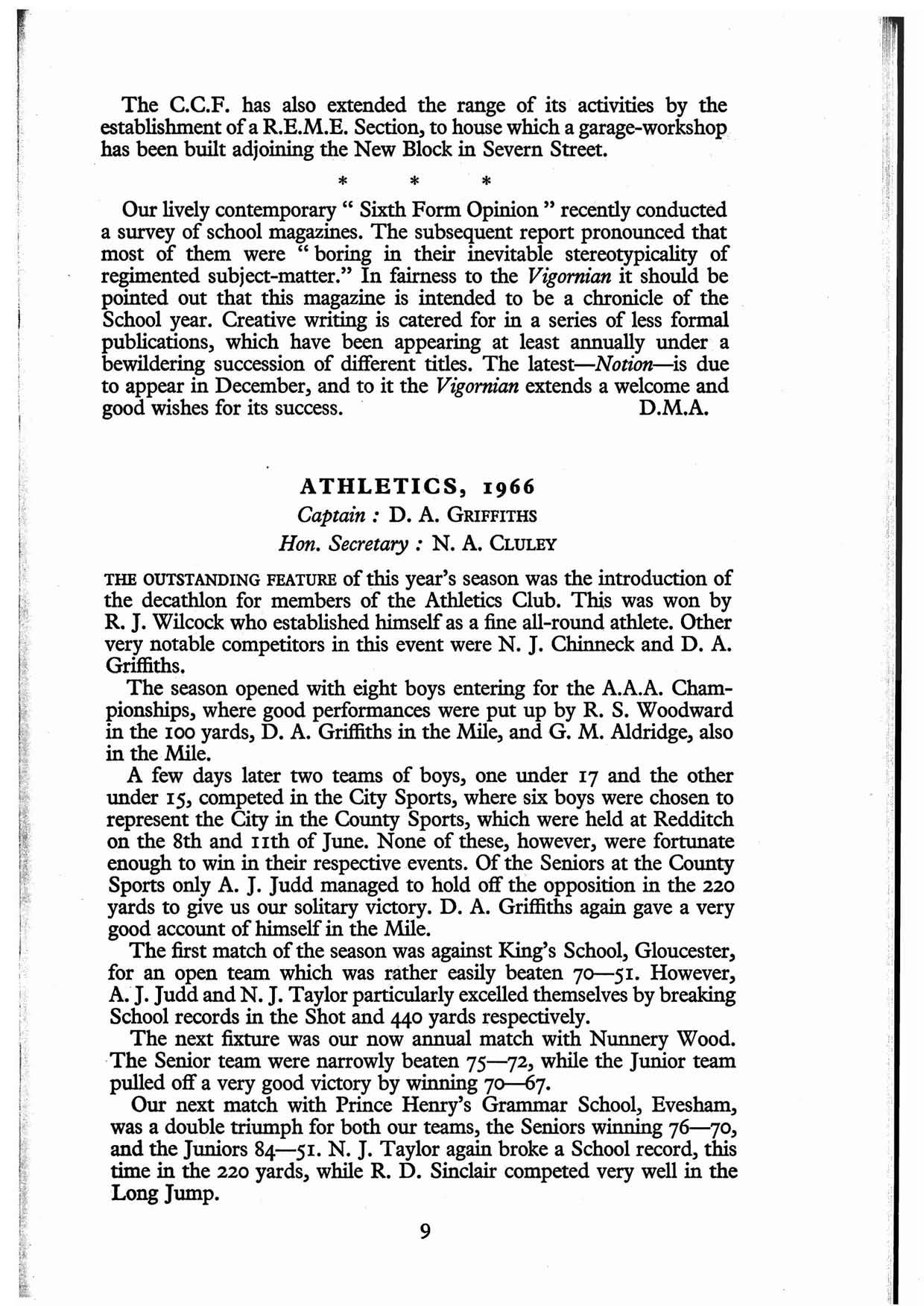
The C.C.F. has also extended the range of its activities by the establishment of a R.E.M.E. Section, to house which a garage-workshop has been built adjoining the New Block in Severn Street. .
Our lively contemporary" Sixth Form Opinion" recently conducted a survey of school magazines. The subsequent report pronounced that most of them were "boring in their inevitable stereotypicality of regimented subject-matter." In fairness to the Vigornian it should be pointed out that this magazine is intended to be a chronicle of the School year. Creative writing is catered for in a series of less formal publications, which have been appearing at least annually under a bewildering succession of different titles. The latest-Notion-is due to appear in December, and to it the Vigornian extends a welcome and good wishes for its success.
D.M.A.
Hon. Secretary: N. A. CLULEY
THE OUTSTANDING FEATURE of this year's season was the introduction of the decathlon for members of the Athletics Club. This was won by R. J. Wilcock who established himself as a fine all-round athlete. Other very notable competitors in this event were N. J. Chinneck and D. A. Griffiths.
The season opened with eight boys entering for the A.A.A. Championships, where good performances were put up by R. S. Woodward in the 100 yards, D. A. Griffiths in the Mile, and G. M. Aldridge, also in the· Mile.
A few days later two teams of boys, one under 17 and the other under 15, competed in the City Sports, where six boys were chosen to represent the City in the County Sports, which were held at Redditch on the 8th and 11th of June. None of these, however, were fortunate enough to win in their respective events. Of the Seniors at the County Sports only A. J. Judd managed to hold off the opposition in the 220 yards to give us our solitary victory. D. A. Griffiths again gave a very good account of himself in the Mile.
The first match of the season was against King's School, Gloucester, for an open team which was rather easily beaten 70-51. However,
A. J. J udd and N. J. Taylor particularly excelled themselves by breaking School records in the Shot and 440 yards respectively.
The next fixture was our now annual match with Nunnery Wood. The Senior team were narrowly beaten 75-72, while the Junior team pulled off a very good victory by winning 70-67.
Our next match with Prince Henry's Grammar School, Evesham, was a double triumph for both our teams, the Seniors winning 76-70, and the Juniors 84-51. N. J. Taylor again broke a School record, this time in the 220 yards, while R. D. Sinclair competed very well in the Long Jump. ','
The, last match of the season was against Solihull, who beat both of our·teams. The scores were,: Seniors 71-66, and Juniors 76-61.
In the School Sports nine Sports Day records were produced. These were by:
N. J. Taylor in the Senior 220 and 440.
D. A. Griffiths in the Senior Mile (also a School record) and 2 Miles.
C. Ross in the Junior Mile and 880.
M. Aldridge in the Middle 2 Miles.
R. S. Woodward in the Middle Hurdles. 1
N. J. Cbinneck in the Junior Shot.
Also two School records were equalled by :
C. Harding - Roberts in the Junior 100 and N. J. Chinneck in the
Junior 220.
Senior:
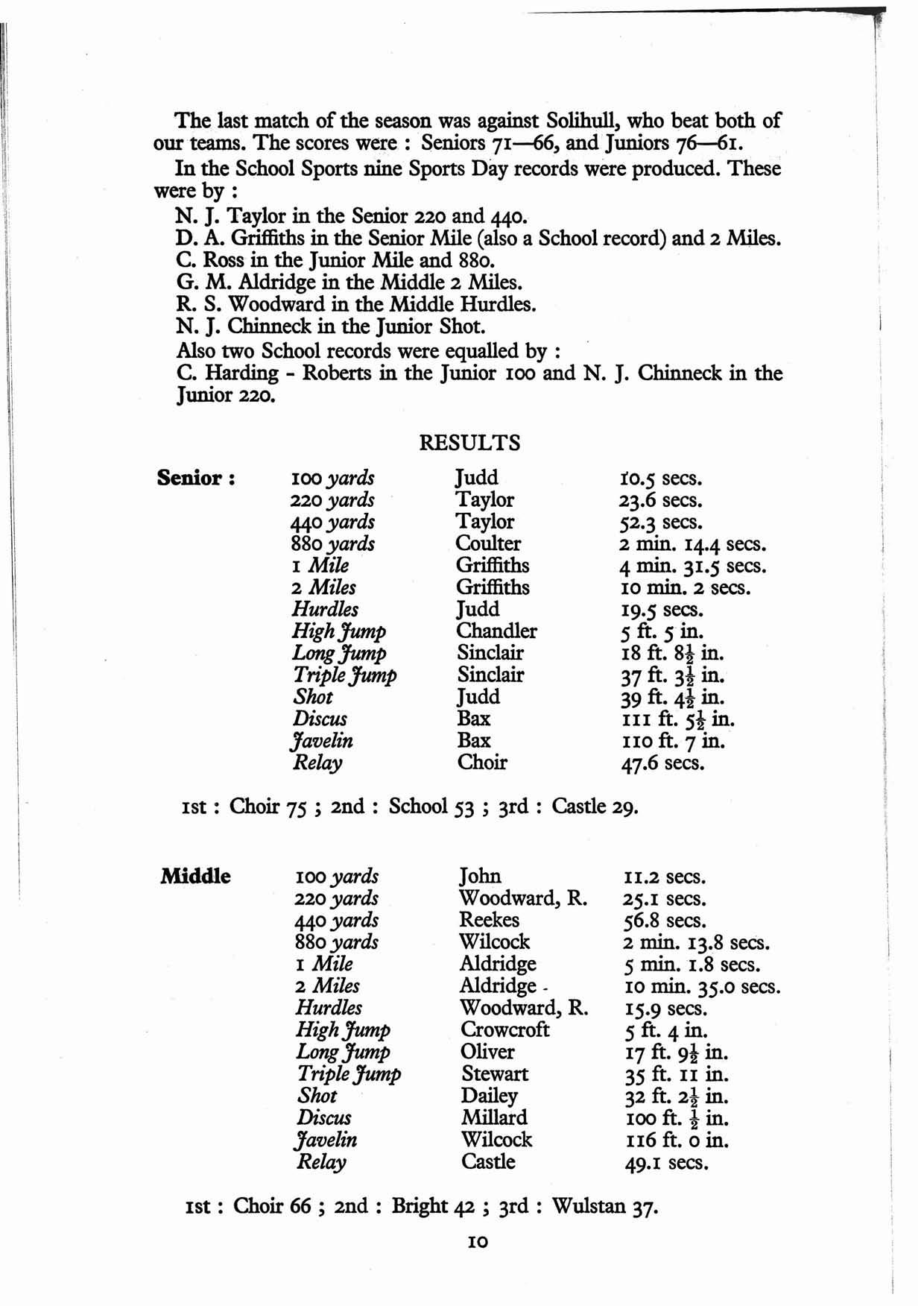
100 yards Judd to.5 secs. 220 yards Taylor 23.6 secs.
440 yards Taylor 52.3 secs.
880 yards Coulter 2 min. 14.4 secs.
I Mile Griffiths 4 min. 31.5 secs.
2 Miles Griffiths 10 min. 2 secs. Hurdles Judd 19.5 secs.
High Jump Chandler 5 ft. 5 in.
Long Jump Sinc1air 18 ft. 8i in.
Triple Jump Sinc1air
1st: Choir 75 ; 2nd: School 53 ; 3rd : Castle 29.
I Mile Aldridge
secs.
min. I .8 secs.
2 Miles Aldridge 10 min. 35.0 secs. Hurdles Woodward, R. 15.9 secs.
High Jump Crowcroft 5 ft. 4 in.
Long Jump Oliver 17 ft. 9t in.
Triple Jump Stewart 35 ft. II in. 1· Shot Dailey
.22
1st: Choir 66 ; 2nd: Bright 42 ; 3rd : Wulstan 37.
Junior:
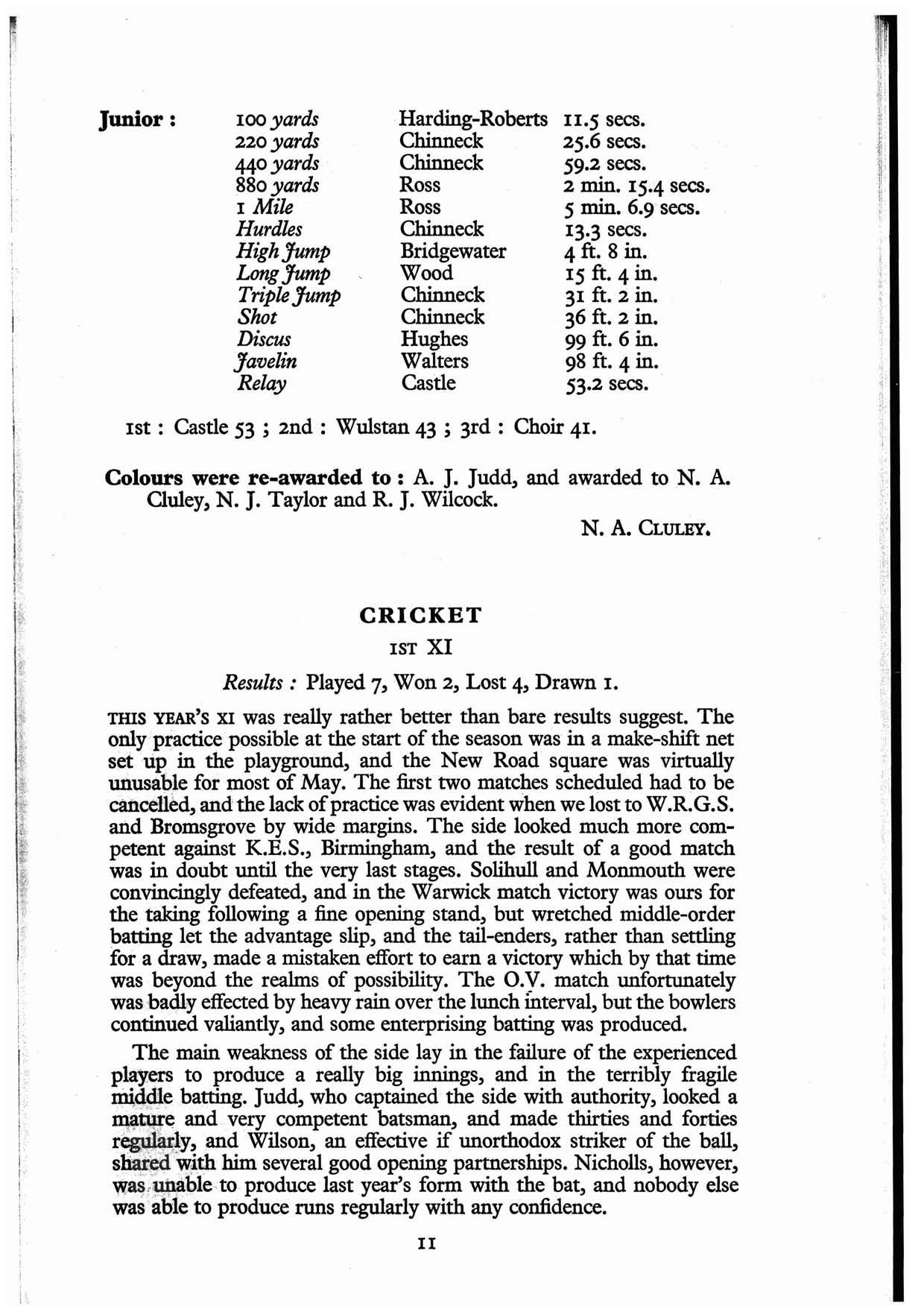
100 yards
220 yards
440 yards '
880 yards
1 Mile
Hurdles
High Jump
Long Jump
Triple Jump
Shot
Discus
Javelin
Relay
Harding-Roberts
Chinneck
Chinneck
Ross
Ross
Chinneck
Bridgewater
Wood
Chinneck
Chinneck
Hughes
WaIters
Castle
11.5 secs.
25.6 secs.
59.2 secs.
2 min. 15.4 secs.
5 min. 6.9 secs.
13.3 secs.
4 ft. 8 in. 15 ft. 4 in. 31 ft. 2 in.
ft. 2 in.
ft. 6 in.
ft. 4 in. 53.2 secs.
1st: Castle 53 ; 2nd: Wulstan 43 ; 3rd : Choir 4 1.
Colours were re-awarded to: A. J. Judd, and awarded toN. A. Cluley, N. J. Taylor and R. J. Wilcock.
N. A. CLULEY.
1ST XI
Results : Played 7,Won 2, Lost 4, Drawn I.
THIS YEAR'S XI was really rather better than bare results suggest. The only practice .possible at the start of the season was in a make-shift net set tip in the playground, and the New Road square was virtually unus,a1)le for most of May. The first two matches scheduled had to be cancelled, and the lack of practice was evident when we lost to W .R. G. S. and Bromsgrove by wide margins. The side looked much more competent against K.E.S., Birmingham, and the result of a good match was in doubt· until the very last stages. Solihull and Monmouth were convincingly defeated, and in the Warwick match victory was ours for the taking following a fine opening stand, but wretched middle-order batting let the advantage slip, and the tail-enders, rather than settling for a draw, made a mistaken effort to earn a victory which by that time
was beyond the realms of possibility. The O.y. match unfortunately
wasbadl¥ effected by heavy rain over the lunch interval, but the bowlers
continued valiantly, and some enterprising batting was produced.
The main weakness of the side lay in the failure of the experienced
playe,rs to produce a really big innings, and in the terribly fragile
11ii49Jebatting. Judd, who captained the side with authority, looked a
and very competent batsman, and made thirties and forties
and Wilson, an effective if unorthodox striker of the ball,
him several good opening partnerships. Nicholls, however,
produce last year's form with the bat, and nobody else
was 'ab1e to produce runs regularly with any confidence.
The bowling was well-balanced, with Nicholls and Barlow as an opening pair taking a useful number of wickets. Comyn's medium pace was a model of consistency, and he bowled very well indeed over the season. The spinners, Logan and Blackstock, did not quite live up to last season's promise, and were rather short of work. The fielding was reasonably good, and Rogers kept wicket soundly.
The following played for the 1st XI : A. J. Judd (Captain), V. A. Nicholls, N. P. Wilson, J. A. Comyn, F. Barlow, P. Rogers, N. J. Taylor, L. S. F. Blackstock, N. H. Logan, M. W. Brinsford, A. M. Fegan, M. R. Young, S. R. Knee, P. J. Garland.
Scores:
W.R.G.S. 170-5 dec., King's 88. King's 44, Bromsgrove 45-5.
King's 149, K.E.S., Birmingham, 152-8.
King's 162-7 dec., Solihull 65.
Warwick 144, King's 134.
King's 142-8 dec., Monmouth 56. O.V.'s 166-6 dec., King's 132-4.
2ND XI
Results: Played 7, Won 4, Lost I, Drawn 2.
THE 2ND XI, under the captaincy of J. B. Douglas-Hamilton, had a very successful season, and in each of the two drawn games needed only to take one more wicket for victory. Douglas-Hamilton and Ackred were the leading wicket takers, and while Harker was the most consistent batsman a number of other players made useful contributions.
The following played for the 2nd XI : J. B. Douglas-Hamilton (Captain), D. R. Needham, M. D. Ackred, S. R. Knee, M. R. Young, R. J. Harker, P. J. Garland, W. A. Bridgens, P. Oliver, M. W. Brinsford, A. M. Fegan, R. W. Greenhough, P. E. F. Davies.
Scores:
Bromsgrove 60 (Needham 5-25), King's 61-7. King's 104 (Fegan 50), K.E.S.B. 101 (Hamilton 6-20). King's 134-7 dec., Solihull 68-9 (Ackred 9-25). King's 122-4 dec., Warwick 123-6.
Monmouth 56, King's 57-5.
O.V.'s 61 (Hamilton 6-16), King's 62-3. King's n9-6 dec., Sebright 45-9 (Garland 5-2).
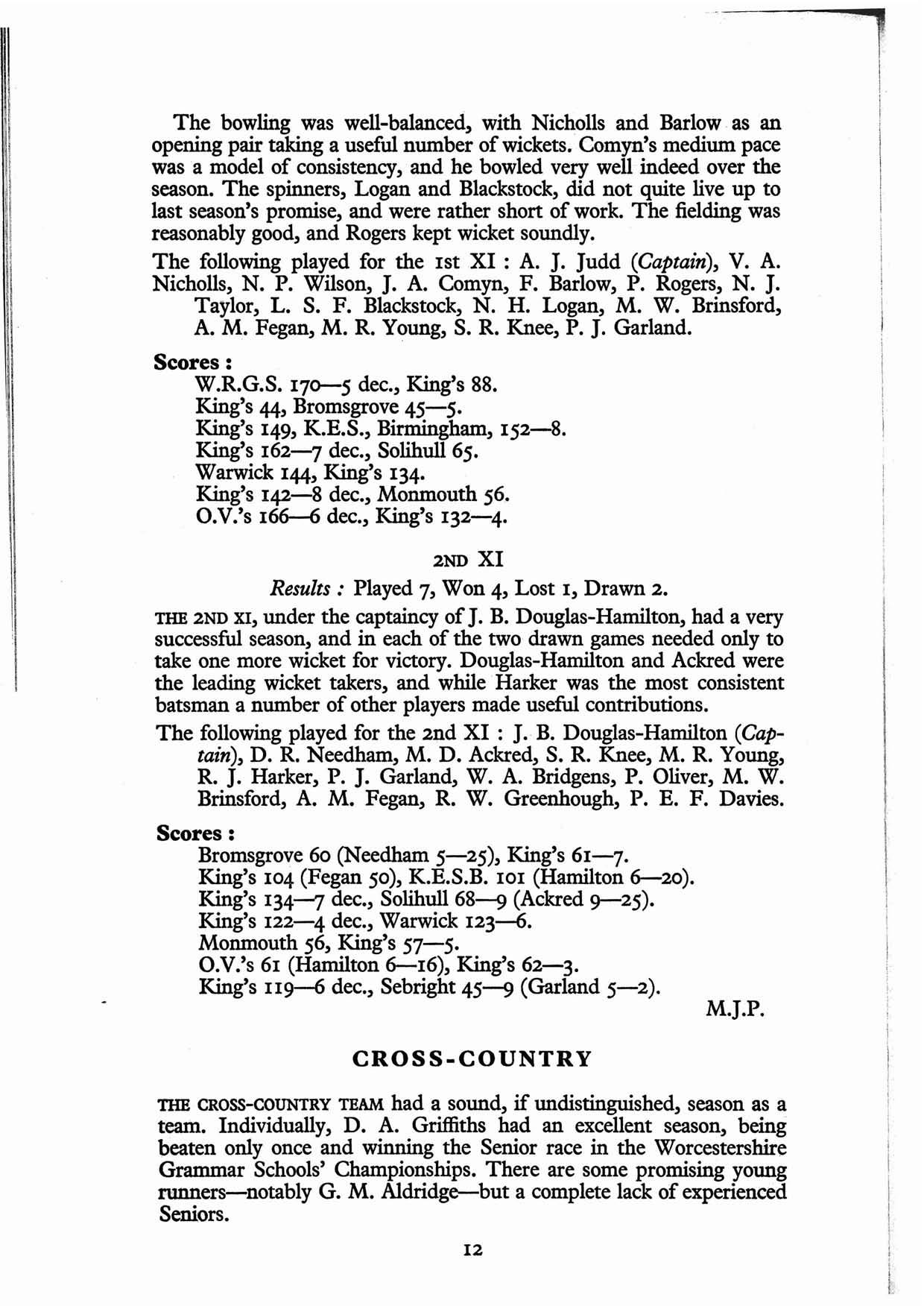
M.J.P.
THE CROSS-COUNTRY TEAM had a sound, if undistinguished, season as a team. Individually, D. A. Griffiths had an excellent season, being I beaten only once and winning the Senior race in the Worcestershire 1 Grammar Schools' Championships. There are some promising young ! runners-notably G. M. Aldridge-but a complete lack of experienced Seniors.
Feb. 2nd

P.H.G.S., Evesham
Lost 45-33
Feb. 12th Worcs. Schools' Championships Seniors 4th
Intermediate 4th Junior 9th
Feb. 19th
Dean Close 2nd VIII
Feb. 23rd Bromsgrove
Mar. 2nd Nunnery Wood
Mar. 9th Worcs. Grammar Schools' Championships
Mar. 13th
W.R.G.S.
Won IS-50
Lost 48-32
Intermediate won Junior lost
1st VIII 3rd 2nd VIII 6th
Lost 50-26
Mar. 20th City Championships Seniors 1st Juniors 3rd
In the School Cross-Country, Chappel, though providing the winners of both races, had not such good teams as in the past. Choir and Wwstan had comparatively' easy victories in the House event.
Senior Race :
1st Choir 42
2nd School 63
3rd Chappel 96
4th Hostel 142
Junior Race:
1st Wwstan 30
2nd Chappel 42
3rd School 78
4th Choir 102
1st D. A. Griffiths (Cl.)
2nd R. J. Comyn (S.).
3rd P. Garland (Ch.)
4th S. Byme (Ch.)
5th R. J. Wilcock (Br.)
1st G. M. Aldridge (Cl.)
2nd P. G. Stewart (W.)
3rd A. S. P. Phillips (Cl.)
4th C. J. Catchpole (W.)
5th C. J. Ross (W.)
Captain: N. P. WILSON
J.T.
FOR THE FOURTH TIME in the last four years the weather tried its hardest to destroy the season. However, although we never played on our own pitch and we did not raise a stick for weeks, we can still derive a portion of satisfaction from the month of interesting sport which we did manage. We must thank the Convent School for so generously allowing us to use pitch during March. But for this we should have had no season at all.
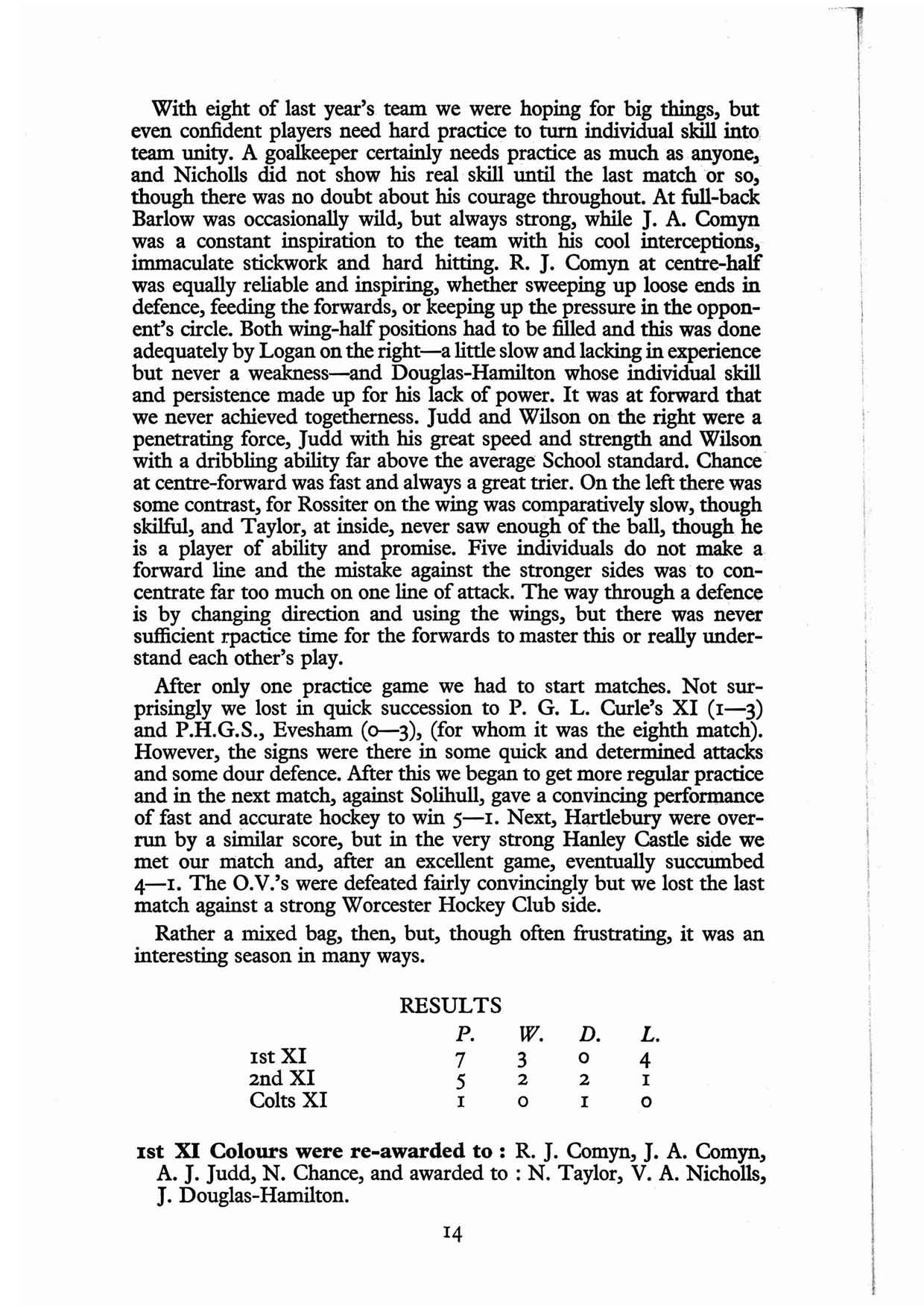
With eight of last year's team we were hoping for big things, but even confident players need hard practice to turn individual skill into team unity. A goalkeeper certainly needs practice as much as· anyone, and Nicholls did not show his real skill until the last match 'or so, though there was no doubt about his courage throughout. At full-back Barlow was occasionally wild, but always strong, while J. A. Comyn was a constant inspiration to the team with his cool interceptions, immaculate stickwork and hard hitting. R. J. Comyn at centre-half was equally reliable and inspiring, whether sweeping up loose ends in defence, feeding the forwards, or keeping up the pressure in the opponent's circle. Both wing-half positions had to be filled and this was done adequately by Logan on the right-a little slow and lacking in experience but never a weakness-and Douglas-Hamilton whose individual skill and persistence made up for his lack of power. It was at forward that we never achieved togetherness. Judd and Wilson on the right were a penetrating force, J udd with his great speed and strength and Wilson with a dribbling ability far above the average School standard. Chance at centre-forward was fast and always a great trier. On the left there was some contrast, for Rossiter on the wing was comparatively slow, though skilful, and Taylor, at inside, never saw enough of the ball, though he is a player of ability and promise. Five individuals do not make a. forward line and the mistake against the stronger sides was to concentrate far too much on one line of attack. The way through a is by changing direction and using the wings, but there was never sufficient rpactice time for the forwards to master this or really understand each other's play.
Mter only one practice game we had to start matches. Not surprisingly we lost in quick succession to P. G. L. CurIe's XI (1-3) and P.H.G.S., Evesham (0-3), (for whom it was the eighth match). However, the signs were there in some quick and determined attacks and some dour defence. Mter this we began to get more regular practice and in the next match, against Solihull, gave a convincing performance of fast and accurate hockey to win 5-1. Next, Hartlebury were overrun by a similar score, but in the very strong Hanley Castle side we met our match and, after an excellent game, eventually succumbed 4-1. The O.V.'s were defeated fairly convincingly but we lost the last match against a strong Worcester Hockey Club side.
Rather a mixed bag, then, but, though often frustrating, it was an interesting season in many ways.
P. W. D. L.
1st XI 0 73 4
2nd XI 22 5 1
Colts XI 101 o
1st XI Colours were re-awarded to: R. J. Comyn, J. A. Comyn, A. J. Judd, N. Chance, and awarded to : N. Taylor, V. A. Nichons, J. Douglas-Hamilton.
The House matches were again played on a Seven-a-side basis and, after the closest possible final, Choir emerged as the winners.
Castle Castle
Chappel
Choir
Hostel
Creighton
Wulstan
School
Bright
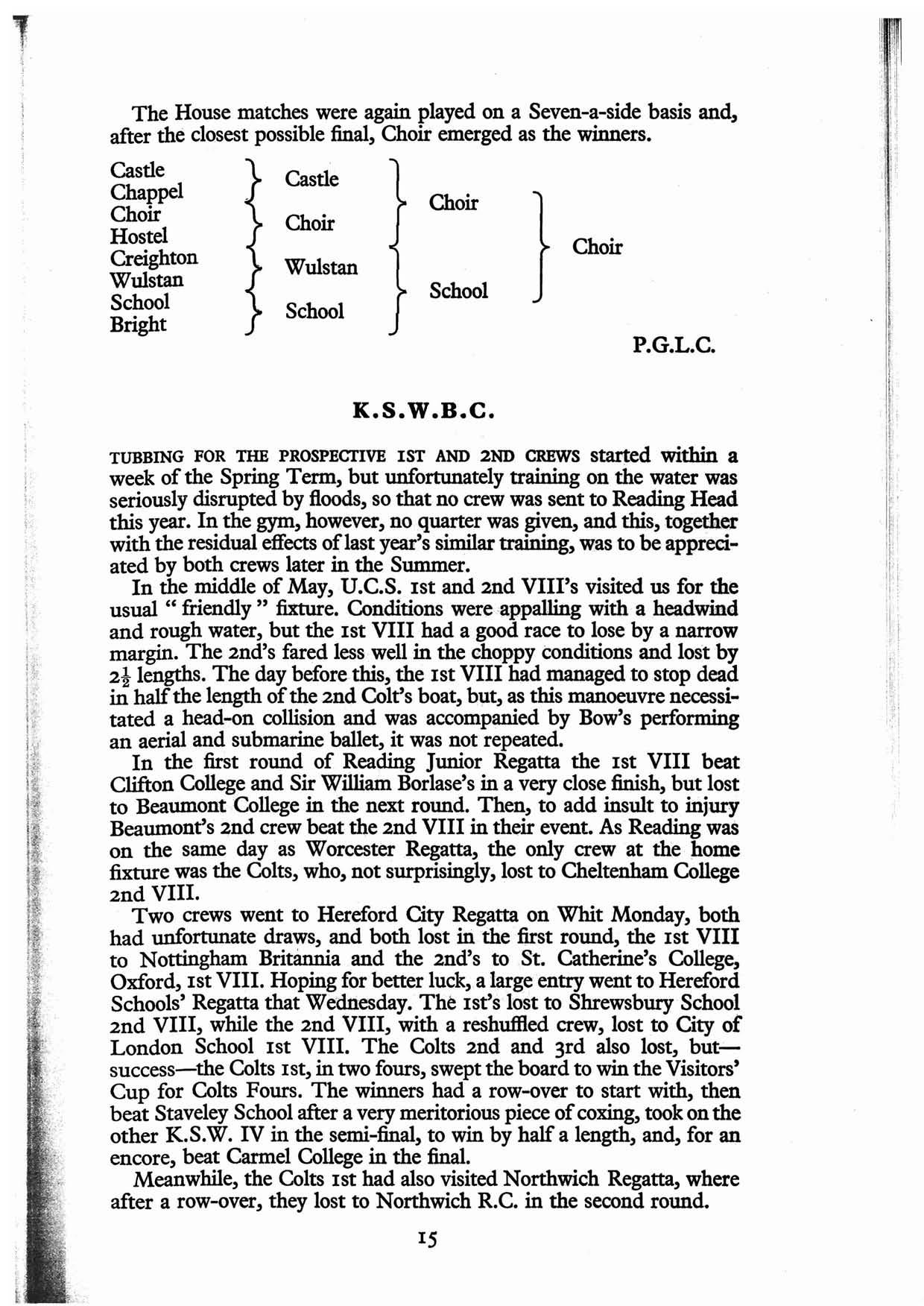
Choir
Choir
Wulstan
School
Choir
School
TUBBING FOR THE PROSPECfIVE 1ST AND 2ND CREWS started within a week of the Spring Term, but unfortunately training on the water was seriously disrupted by floods, so that no crew was sent to Reading Head this year. In the gym, however, no quarter was given, and this, together with the residual effects of last year's similar training, was to be appreei.. ated by both crews later in the Summer.
In the middle of May, U.C.S. 1st and 2nd VIII's visited us for the ( usual " friendly" finure. Conditions were appalling with a headwind ! and rough water, but the 1st VIII had a good race to lose by a narrow
! , margin. The 2nd's fared less well in the choppy conditions and lost by 2! lengths. The day before this, the 1st VIII had managed to stop dead in half the length of the 2nd Colt's boat, but, as this manoeuvre necessi.. tated a head-on collision and was accompanied by Bow's performing an aerial and submarine ballet, it was not repeated.
In the first round of Reading Junior Regatta the 1st VIII beat Clifton College and Sir William Borlase's in a very close finish, but lost to BeaumontCollege in the next round. Then, to add insult to injury Beaumont's 2nd crew beat the 2nd VIII in their event. As Reading was on the same day as Worcester Regatta, the only crew at the home fixture was the Colts, who, not surprisingly, lost to Cheltenham College 2nd VIII.
Two crews went to Hereford City Regatta on Whit Monday, both had unfortunate draws, and both lost in the first round, the 1st VIII to Nottingham Britannia and the 2nd's to St. Catherine's College, Oxford, 1st VIII. Hoping for better luck, a large entry went to Hereford Schools' Regatta that Wednesday. The 1st's lost to Shrewsbury School 2nd VIII, while the 2nd VIII, with a reshuffled crew, lost to City of London School 1st VIII. The Colts 2nd and 3rd also lost, butsuccess-the Colts 1st, in two fours, swept the board to win the Visitors' Cup for Colts Fours. The winners had a row-over to start with, then beat Staveley School after a very meritorious piece of coxing, took on the other K.S.W. IV in the semi-final, to win by half a length, and, for an encore, beat Carmel College in the final.
Meanwhile, the Colts 1st had also visited Northwich Regatta, where after a row-over, they lost to Northwich R.C. in the second round.
A fixture with Cheltenham College resulted in the Colts 1st losing by two feet to their Colts Ist-despite photographic evidence later produced to the contrary. The Colts 2nd, however, convincingly beat both Cheltenham's Senior Colts 2nd and Junior Colts, while the 3rd VIII lost.
Once again no crew was sent to Henley this year, and both 1St and 2nd VIII's entered the Junior VIII event at Marlow. The slightly altered 1st VIII started by beating Abingdon School and Reading University 2nd VIII, in spite of cutting it a little fine. The 2nd VIII beat Harrow 2nd VIII and Eton 4th VIII-the latter by about four furlongs, Eton's Stroke having gone swimming. So the two crews met in the semi-final, with the result that the 1st VIII reached the final, although not without a fast race. Molesey, however, disappointingly proved I! lengths faster in the final.
The 1st VIII and a fortified Colts 1st appeared at the National Schools' Regatta at Pangbourne. The 1st VIII, facing predictably tough opposition in the 1st VIII event and experiencing our normal Pangbourne complications, had an exciting first race, leading· bo$ Abingdon and Bedford 1st crews past the half-way mark and narrowly losing to Bedford after Abingdon had an argument with a launch. Abingdon reappeared in the next round, when, after another good race, the 1st VIII was beaten by Eton;- Pangboume and Abingdon simultaneously, the distance between all four crews being only three lengths. The Colts beat Beaumont and Canford in their first round, but lost to Radley and King's, Cantt:rbury, in the next one.
At Richmond, the Colts 1st lost in the first round, and the Colts 2nd, rowing in the School's event, lost to Wandsworth School 1st VIII. The 3rd VIII, however, went one better, not only losing their race but also an oar.
The last regatta of the season, at Monmouth, brought no change in fortune. Both 1st and 2nd VIII's had easy first rounds against Hereford C.S. and Cheltenham 4th VIII respectively, but the 1st VIII rowed an indifferent final to lose to Cheltenham 2nd VIII. The 2nd VIII rowed a good second round and led most of the way, but they were beaten by Hereford Rowing Club Junior VIII by a length.
Mrs Knight kindly agreed to present the cups all this year's School Regatta. Hostel won the Henley Shield, winning the Junior/Senior IV's, the Senior Sculls and the Tub Pairs. An unofficial challenge from School House to Hostel for a House VIII's race resulted in a very exciting race, which School House led until thirty strokes from home when Hostel were observed to activate their nuclear power plant to win by a canvas or thereabouts.

Senior IV School
J/Senior IV Hostel
Junior IV Castle
Tub Pair Hostel
Senior Sculls England
J/ Senior Sculls Ferguson
Junior Sculls Cardwell
Coxes Sculls Thomas, C. S.
1St VIII Colours were re-awarded to : M. C. W. Minchin, and awarded to : W. J. D. Scandrett, M. P. Brook, A. R. Dunn, B. H. Boyle,S. R. Coulter, A. S. Baker, D. F. Thomas.
1St VIII Coxing ,Colours were awarded to : -C. S. Thomas.
znd VIII Colours were awarded to : M. T. Pellew, A. J. H. Richardson, C. A. Richards, C. Headeach, E. J. Yoxen, J. D. C.
Vardon, M. E. Lambert, S. J. Watts.
znd VIII Coxing Colours were awarded to: N. C. Bakewell.
R.D.K.
Captain: V. A. NICHOLLS
Secretary: M. C. W. MINCHIN
Caps were awarded to: V. A. Nicholls, N. D. S. Bax.
Colours re-awarded to : N. P. Wilson, A. J. Judd.
Colours awarded to: N. B. H. Logan, N. J. Taylor, B. H. Boyle, S. J. Watts.
Results:
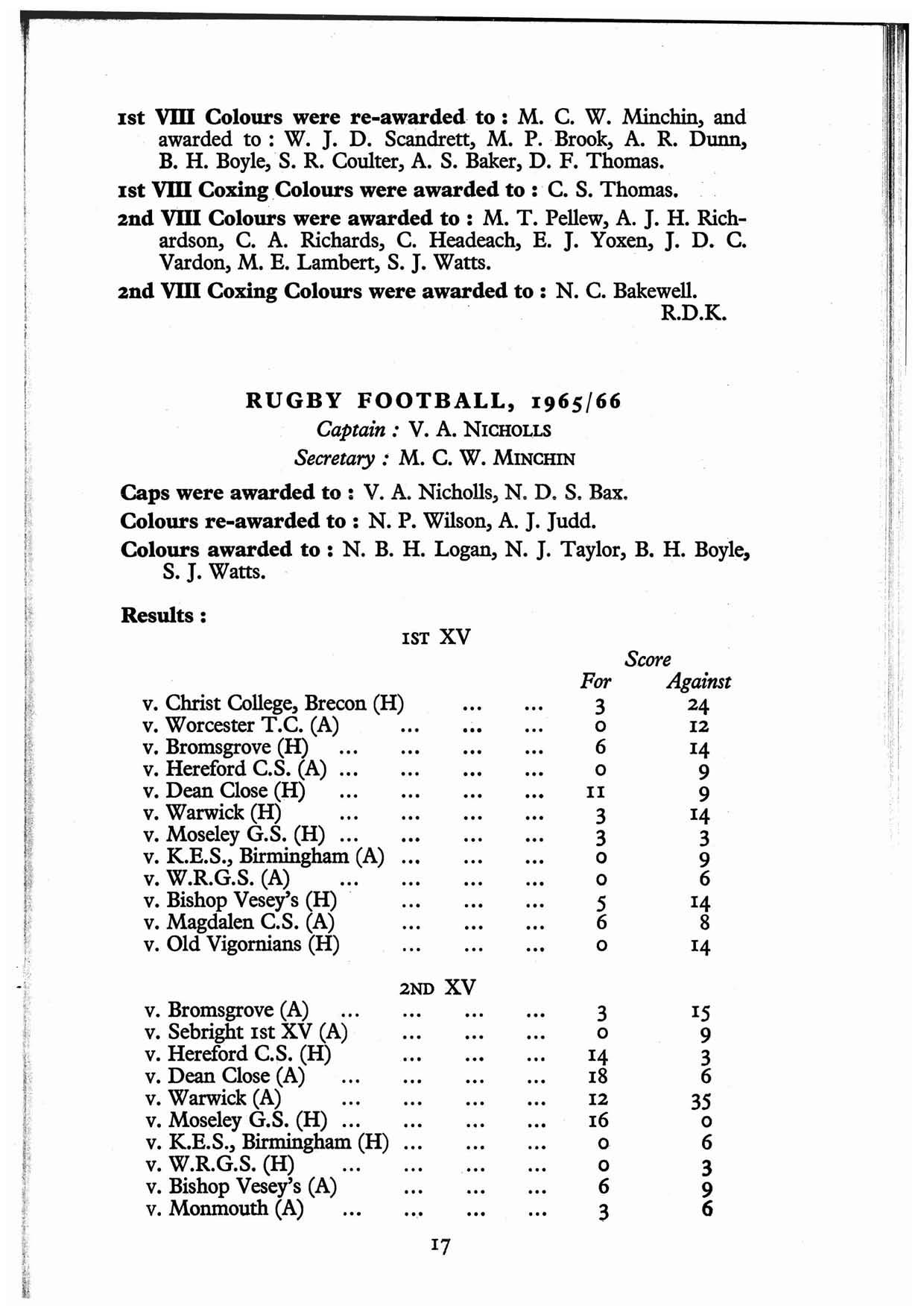
v. Christ College, Brecon CH)
v. Worcester T.C. CA)
v. Bromsgrove CH)
v. Hereford C.S. (A)
v. Dean Close (H)
v. Warwick CH)
v. Moseley G.S. (H)
v. K.E.S., Birmingham (A)
v. W.R.G.S. CA)
v. Bishop Vesey's (H) ,
v. Magdalen C.S. (A)
v. Old Vigornians (H)
v. Bromsgrove CA)
v. Sebright 1st XV CA)
v. Hereford C.S. CH)
v. Dean Close (A)
v. Warwick CA)
v. Moseley G.S. (H)
v. K.E.S., Birmingham (H)
v. W.R.G.S. (H)
v. Bishop Vesey's (A)
v. Monmouth (A)
v. Bromsgrove ·CH)
v. Sebright 2nd XV CH)
v. P.H.G.S., Evesham CH)
v. Warwick CH)
v. P.H.G.S., Evesham CA)
v. Monmouth CA)
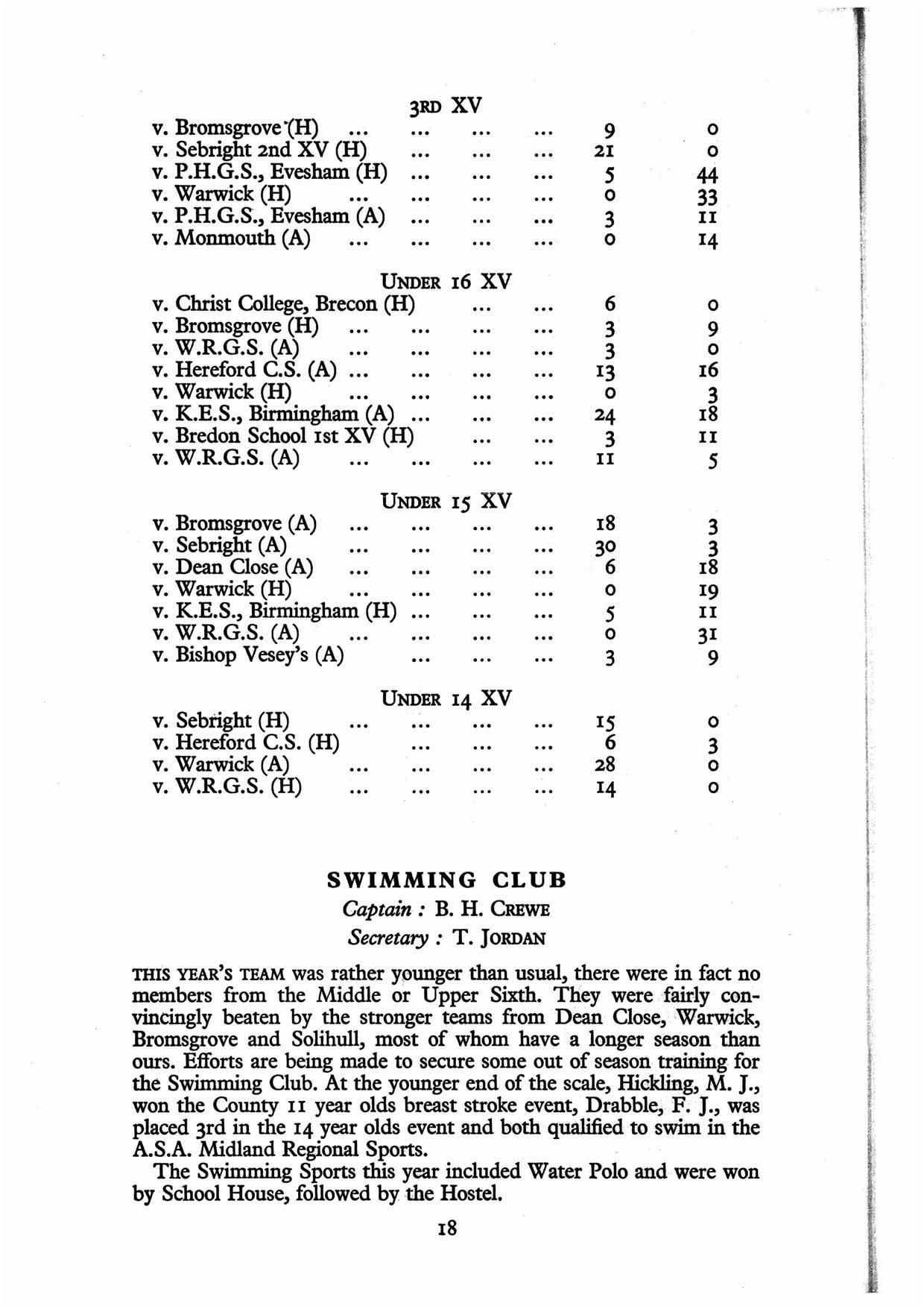
UNDER 16 XV
v. Christ College, Brecon CH)
v. Bromsgrove CH)
v. W.R.G.S. CA)
v. Hereford C.S. CA)
v. Warwick CH)
v. K.E.S., Birmingham CA)
v. Bredon School 1st XV CH)
v. W.R.G.S. CA)
v. Bromsgrove CA)
v. Sebright CA)
v. Dean Close CA)
v. Warwick CH)
UNDER 15 XV
v. K.E.S., Birmingham CH)
v. W.R.G.S. CA)
v. Bishop Vesey's CA)
v. Sebright CH)
v. Hereford C.S. CH)
v. Warwick CA)
v. W.R.G.S. CH)
UNDER 14 XV
Captain: B. H. CREWE
Secretary : T. JORDAN
mIS YEAR'S TEAM was rather ypunger than usual, there were in fact no mettlbers from the Middle or Upper Sixth. They were fairly convincingly beaten by the stronger teams from Dean Close, :Warwick, Bromsgrove and Solihull, most of whom have a longer season than ours. Efforts are being made to secure some out of season training. for the Swimming Club. At the younger end of the scale, Hickling, M. J., won the County II year olds breast stroke event, Drabble, F. J., was placed 3rd in the 14 year olds event and both qualified to swim in the A.S.A. Midland Regional Sports.
The Swimming Sports this year included Water Polo and were won by School House, followed by the Hostel.
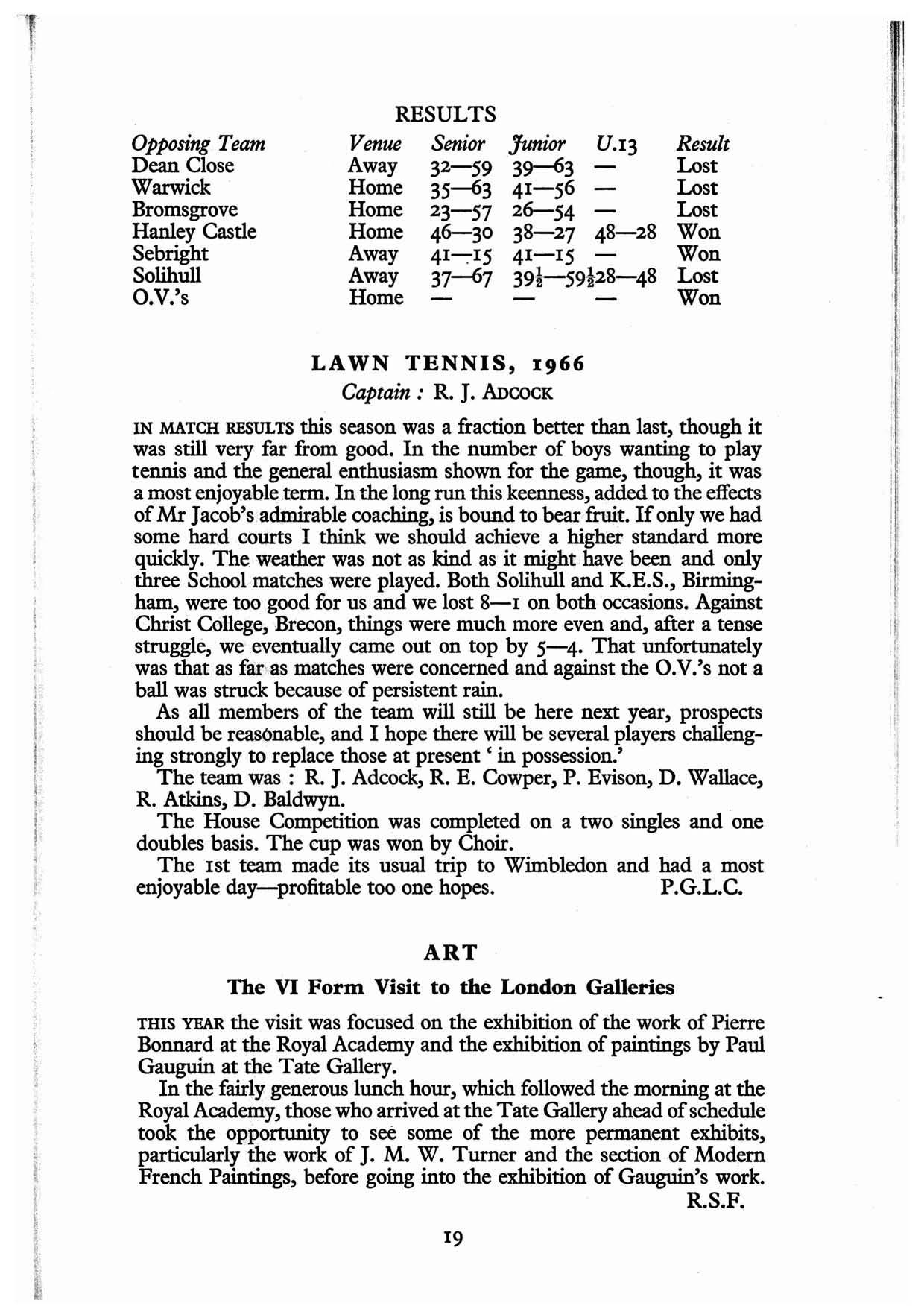
Opposing Team Venue Senior Junior U.13 Result
Dean Close Away 32-59 39-<>3
Warwick Home 35-63 4 1-5 6
Bromsgrove Home 23-57 26-54 Lost
Hanley Castle Home 46-30 38-27 48-28 Won
Sebright Away 41-,15 41-15 Won
Solihull Away 37-67 391-59128-48 Lost
D.V.'s Home Won
Captain: R. J. AnCOCK
IN MATCH RESULTS this season was a fraction better than last, though it
was still very far from good. In the number of boys wanting to play tennis and the general enthusiasm shown for the game, though, it was
a most enjoyable term. In the long run this keenness, acided to the effects
of Mr Jacob'sadmirable coaching, is bound to bear fruit. If only we had some hard courts I think we should achieve a higher standard more
quickly. The weather was not as kind as it might have been and only three School matches were played. Both Solihull and K.E.S., Birming
ham, were too good for us and we lost 8-1 on both occasions. Against
Christ College, Brecon, things were much more even and, after a tense
struggle, we eventually came out on top by 5-4. That unfortunately
was that as far"oasmatches were concerned and against the D.V.'s not a
ball was struck because of persistent rain.
As all members of the team will still be here next year, prospects
should be reasonable, and I hope there will be several players challenging strongly to replace those at present' in possession.'
The team was: R. J. Adcock, R. E. Cowper, P. Evison, D. Wallace, \ R. Atkins, D. Baldwyn.
The House Competition was completed on a two' singles and one
doubles basis. The cup was won by Choir.
The 1st team made its usual trip to Wimbledon and had a most enjoyable day-profitable too one hopes. P.G.L.C.
The VI Form Visit to the London Galleries
THIS YEAR the visit was focused on the exhibition of the work of Pierre Bonnard at the Royal Academy and the exhibition of paintings by Paul Gauguin at the Tate Gallery.
In the fairly generous lunch hour, which followed the morning at the Royal Academy, those who arrived at the Tate Gallery ahead of schedule took the opportunity to see some of the more permanent exhibits, particularly the work of J. M. W. Turner and the section of Modem French Paintings, before going into the exhibition of Gauguin's work.
R.S.F.
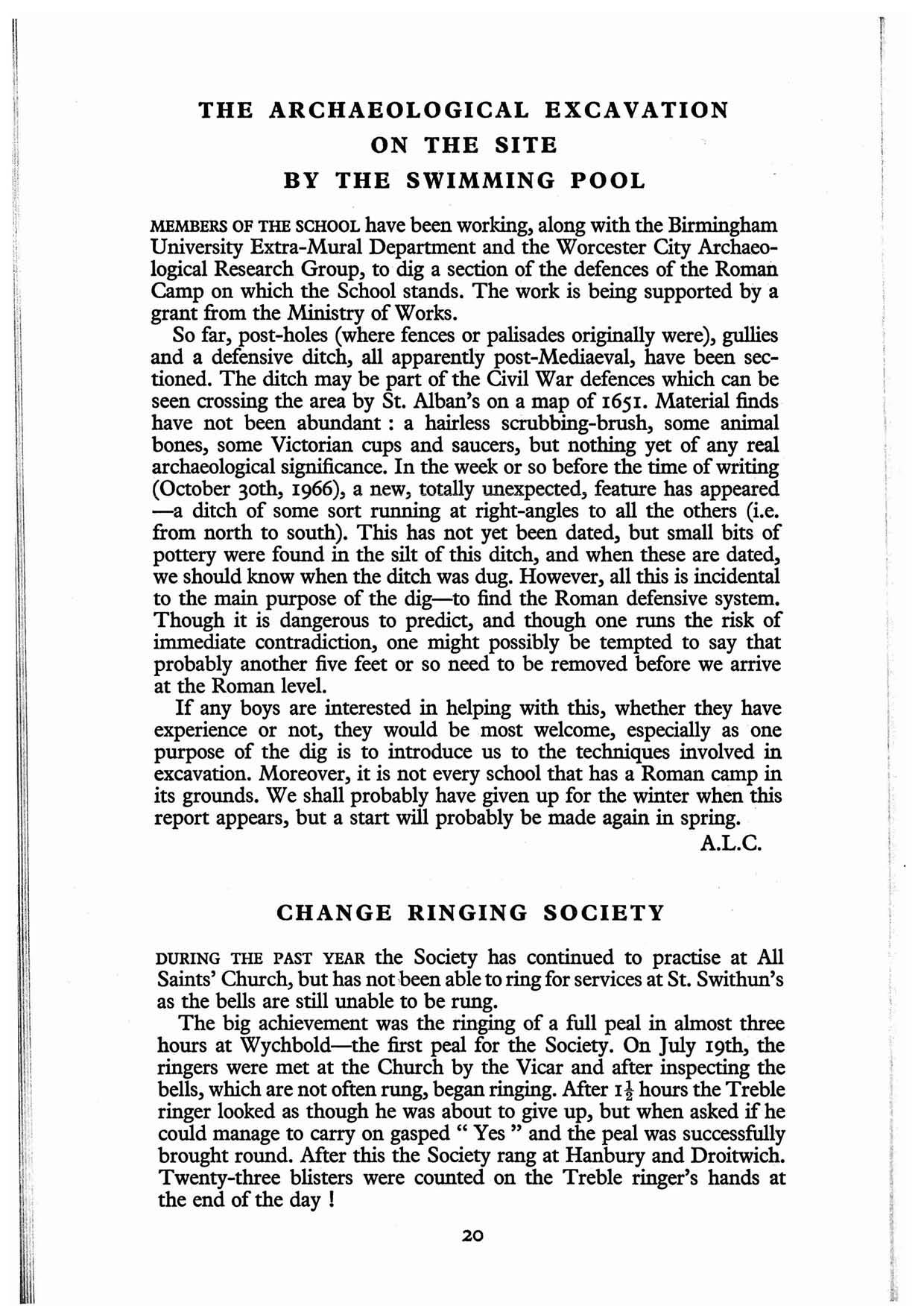
MEMBERS OF THE SCHOOL have been working, along with the Birmingham University Extra-Mural Department and the Worcester City Archaeological Research Group, to dig a section of the defences of the Roman Camp on which the School stands. The work is being supported by a grant from the Ministry of Works.
So far, post-holes (where fences or palisades originally were), gullies and a defensive ditch, all apparently post-Mediaeval, have been sectioned. The ditch may be part of the Civil War defences which can be seen crossing the area by St. Alban's on a map of 1651. Material finds have not been abundant: a hairless scrubbing-brush, some animal bones, some Victorian cups and saucers, but nothing yet of any real archaeological significance. In the week or so before the time of writing (October 30th, 1966), a new, totally unexpected, feature has appeared -a ditch of some sort running at right-angles to all the others (Le. from north to south). This has not yet been dated, but small bits of pottery were found in the silt of this ditch, and when these are dated, we should know when the ditch was dug. However, all this is incidental to the main purpose of the dig-to find the Roman defensive system. Though it is dangerous to predict, and though one runs the risk of immediate contradiction, one might possibly be tempted to say that probably another five feet or so need to be removed before we arrive
at the Roman level.
If any boys are interested in helping with this, whether they have experience or not, they would be most welcome, especially as one purpose of the dig is to introduce us to the techniques involved in excavation. Moreover, it is not every school that has a Roman camp in its grounds. We shall probably have given up for the winter when this report appears, but a start will probably be made again in spring.
DURING THE PAST YEAR the Society has continued to practise at All Saints' Church, but has not:been able to ring for services at St. Swithun's as the bells are still unable to be rung.
The big achievement was the ringing of a full peal in almost three hours at Wychbold-the first peal for the Society. On July 19th, the ringers were met at the Church by the Vicar and after inspecting the bells, which are not often rung, began ringing. Mter I l hours the Treble ringer looked as though he was about to give up, but when asked if he could manage to carry on gasped " Yes " and the peal was successfully brought round. Mter this the Society rang at Hanbury and Droitwich. Twenty-three blisters were counted on the Treble ringer's hands at the end of the day !
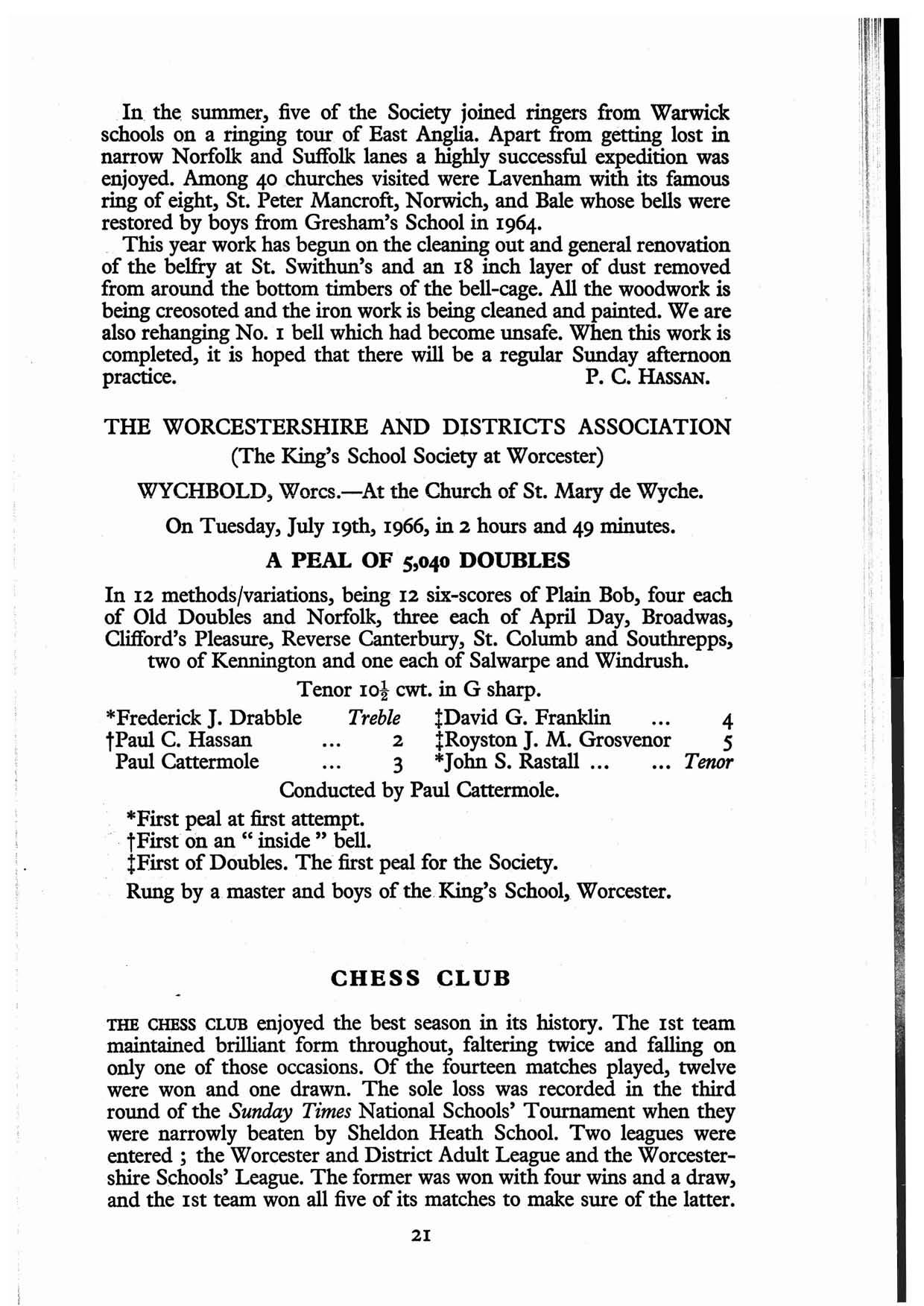
In the summer, five of the Society joined ringers from Warwick schools on a ringing tour of East Anglia. Apart from getting lost in narrow Norfolk and Suffolk lanes a highly successful expedition was enjoyed. Among 40 churches visited were Lavenham with its famous ring of eight, St. Peter Mancroft, Norwich, and Bale whose bells were restored by boys from Gresham's School in 1964.
This year work has begun on the cleaning out and general renovation of the belfry at St. Swithun's and an 18 inch layer of dust removed from around the bottom timbers of the bell-cage. All the woodwork is being creosoted and the iron work is being cleaned and painted. We are also rehanging No. I bell which had become unsafe. When this work is completed, it is hoped that there will be a regular Sunday afternoon practice. P. C. HASSAN.
(The King's School Society at Worcester)
WYCHBOLD, Worcs.-At the Church of St. Mary de Wyche.
On Tuesday, July 19th, 1966, in 2 hours and 49 minutes.
In 12 methods/variations, being 12 six-scores of Plain Bob, four each of Old Doubles and Norfolk, three each of April Day, Broadwas, Clifford's Pleasure, Reverse Canterbury, St. Columb and Southrepps, two of Kennington and one each of Salwarpe and Windrush. Tenor lot cwt. in G sharp.
*Frederick J. Drabble Treble tDavid G. Franklin 4
tPaul C. Hassan 2 tRoyston J. M. Grosvenor 5 Paul Cattermole 3
*JoOO S. Rastall Tenor Conducted by Paul Cattermole.
*First peal at first attempt. t First on an " inside " hell. , tFirst of Doubles. The- first peal for the Society. Rung by a master and boys of the. King's School, Worcester.
THE CHESS CLUB enjoyed the best season in its history. The 1st team maintained brilliant form throughout, faltering twice and falling on only one of those occasions. Of the fourteen matches played, twelve were won and one drawn. The sole loss was recorded in the third round of the Sunday Times National Schools' Tournament when they were narrowly beaten by Sheldon Heath School. Two leagues were entered ; the Worcester and District Adult League and the Worcestershire Schools' League. The former was won with four wins and a draw, and the 1st team won all five of its matches to make sure oCthe latter.

The two Under 15 teams echoed these successes. The 'A' team won three of its four matches and the ' B ' finished with a 50% record from their three matches .. The 2nd Senior team, however, had an unfortunate season, managing only to record two draws in six matches.
At the beginning of the season Mr G. Brown kindly offered to take over the nlDning of the Club and we are very grateful to him for all his help and advice. We hope he will continue to inspire us to maintain such a high standard as was evident this year, throughout the coming seasons. R. ATKINS.
THE SOCIETY'S YEAR was started off by a debate at the Alice Ottley School. The motion was concerned with the ethics of Christmas. Although well supported the discussion never got off the ground. A lot was said but little was achieved.
The only other debate in a very sparse year was again with the Alice Ottley School. The motion was : "This House opposes the Existence of the Monarchy in Britain Today." This was a far more lively affair than its predecessor. The motion was defeated by a surprisingly large majority.
It is hOPed that this year debates will be more numerous and of a higher standard. N.A.C.
THROUGHOUT 1966 the Fiction Librarians have, as in previous years, attempted to bring worthwhile novels to the attention of the whole School. In this aim they have only partly succeeded. Most of the School, in particular fifth and sixth formers, never take a book out of the library, and will give many reasons for this attitude. " But I never have time to read," and " But you never have any new books," are typical. On the contrary in the past year no less than 75 new books have been added to the library shelves. Unfortunately, a small percentage of these disappear from the library before they have been used a great deal. Eventually some return._ About forty were brought back at the end of the Spring Term and more are returned at intervals.
The librarians organised a literary competition at the School Fete which received over 100 entrants and raised a small sum for the building fund. During the Summer Term the librarians started torefile the stock, enabling books to be located more rapidly. This is continuing at the time of writing, assisted by the two new junior librarians, A. P. Mclntosh and J. A. J. Palmer.
Finally, I should like to thank A. V. Cook and N. R. Lee for their services to the library and Mr Barnett and Mr Dilks for their continued assistance.· D.K.S.

IN THE WINTER TERM, 1965, the expedition of about 20 people took place in the Cotswolds. Three groups set off fromStow-on-the-Wold to go to Northleach, 9 miles south. A group interested iti Natural History was organised by Mr Sutcliffe, another visited some local· churches of interest with Mr Bridges, while a third group studied the geology of the area. Two of the walks ended at N orthleach, and the third group was picked up on the road back.
In Spring, 1966, the expedition was organised in Wiltshire, from Chippenham to Bradford-on-Avon. Five projects were pursued in the course of the day, the two main groups with Mr Sutcliffe and Mr Bridges doing Natural History and local Architecture respectively. Thirdly was a new group of four members which surveyed farming in the district. The fourth group (of two members) visited a Bird Sanctuary, and two more members did an archaeological survey.
The expedition, in the Summer Term, was to Derbyshire, where farming, natural history, architecture and geology were studied. Mr Bridges and Mr Sutcliffe once again took the two main groups while four other people surveyed local farming and two more studied the geology. Two of the four groups started at Monyash, near Bakewell, and the other two started at Bakewe1l. Although rain brought a wet end to the day, the surveys north and south of Bakewen-the picking-up point-were fairly successful.
This ·Winter Term, the Field Club Expedition, with several new members, will take place in Shropshire-around Ludlow. N. J. DIBBEN.
SEVERAL LOCAL EXPERTS have kindly given of their time and effort this term to put reality into text book learning for sixth formers. We grate... fully acknowledge the help given in this way by-
Mr N. C. Potts, Deputy Town Planning Officer, Worcester (O.V.).
Mr E. N. J. Angelbeck, Deputy County Agricultural Advisor, Worcestershire.
Mr L. W. Haines, Engineer to the Severn River Authority (O.V. parent).
We would also express our gratitude to officers of the local establishments who. arranged for us to visit Worcester Royal Porcelain Works, Worcester Power Station, Heenan & Froude Ltd.
DURING THE PAST YEAR we have continued to hold two or three lunchtime recitals each term. Support for these continues to rise, and a very good number came to hear the School Rules sung to Anglican chants! Mr Cubberley's "Desert Island Discs" also proved very popular.
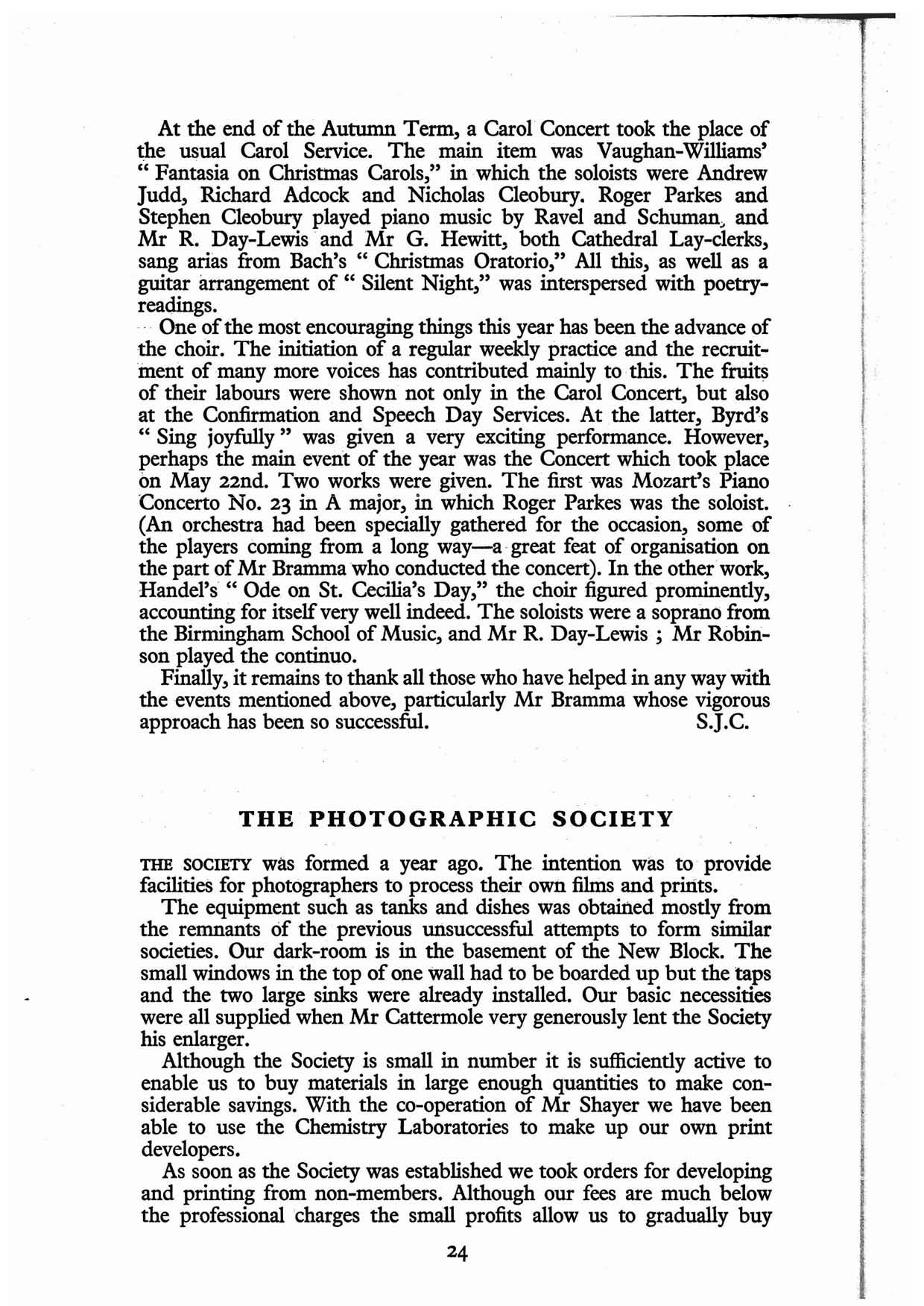
At the end of the Autumn Term, a Carol Concert took the place of the usual Carol Service. The main item was Vaughan-Williams' " Fantasia on Christtnas Carols," in which the soloists were Andrew Judd, Richard Adcock and Nicholas Cleobury. Roger Parkes and Stephen Cleobury played piano music by Ravel and Schuman;. and Mr R. Day-Lewis· and Mr G. Hewitt, both Cathedral Lay-clerks, sang arias from Bach's" Christmas Oratorio," All this, as well as a guitar arrangement of" Silent Night," was interspersed with poetryreadings.
One of the most encouraging things this year has been the advance of -the choir. The initiation of a regular weekly practice and the recruitment of many more voices has contributed mainly to this. The fruits of their labours were shown not only in the Carol Concert, but also at the Confirmation and Speech Day Services. At the latter, Byrd's " Sing joyfully" was given a very exciting performance. However, perhaps the main event of the year was the Concert which took place on May 22nd. Two works were given. The first was Mozart's Piano Concerto No. 23 in A major, in which Roger Parkes was the soloist. (An orchestra had been specially gathered for the occasion, some of the players coming from a long way-a -great feat of organisation on the part of Mr Bramma ·who conducted the concert). In the other work, Handel's " Ode. on St. Cecilia's Day," the choir figured prominently, accounting for itself very well indeed. The soloists were a soprano from the Birmingham School of Music, and Mr R. Day-Lewis ; Mr Robin
son played the continuo.
it remains to thank all those who have helped in any way with the events mentioned above, particularly Mr Bramma whose vigorous approach has been so successful. S.J.C.
THE SOCIETY was formed a year ago. The intention was to provide facilities for photographers to process their own films and pOOts.
The equipment such as tanks and dishes was obtained mostly from the remnants of the previous unsuccessful attempts to form similar societies. Our dark-room is in the basement of the New Block. The small windows in the top of one wall had to be boarded up but the taps and the two large sinks were already installed. Our basic necessities were all supplied when Mr Cattermole very generously lent the Society his enlarger.
Although the Society is small in number it is sufficiently active to enable us to buy materials in large enough quantities to make considerable savings. With the co-operation of Mr Shayer we have been able to use the Chemistry Laboratories to make up our own print developers.
As soon as the Society was established we took orders for developing and printing from non-members. Although our fees are much below the professional 'charges the small profits allow us to gradually buy
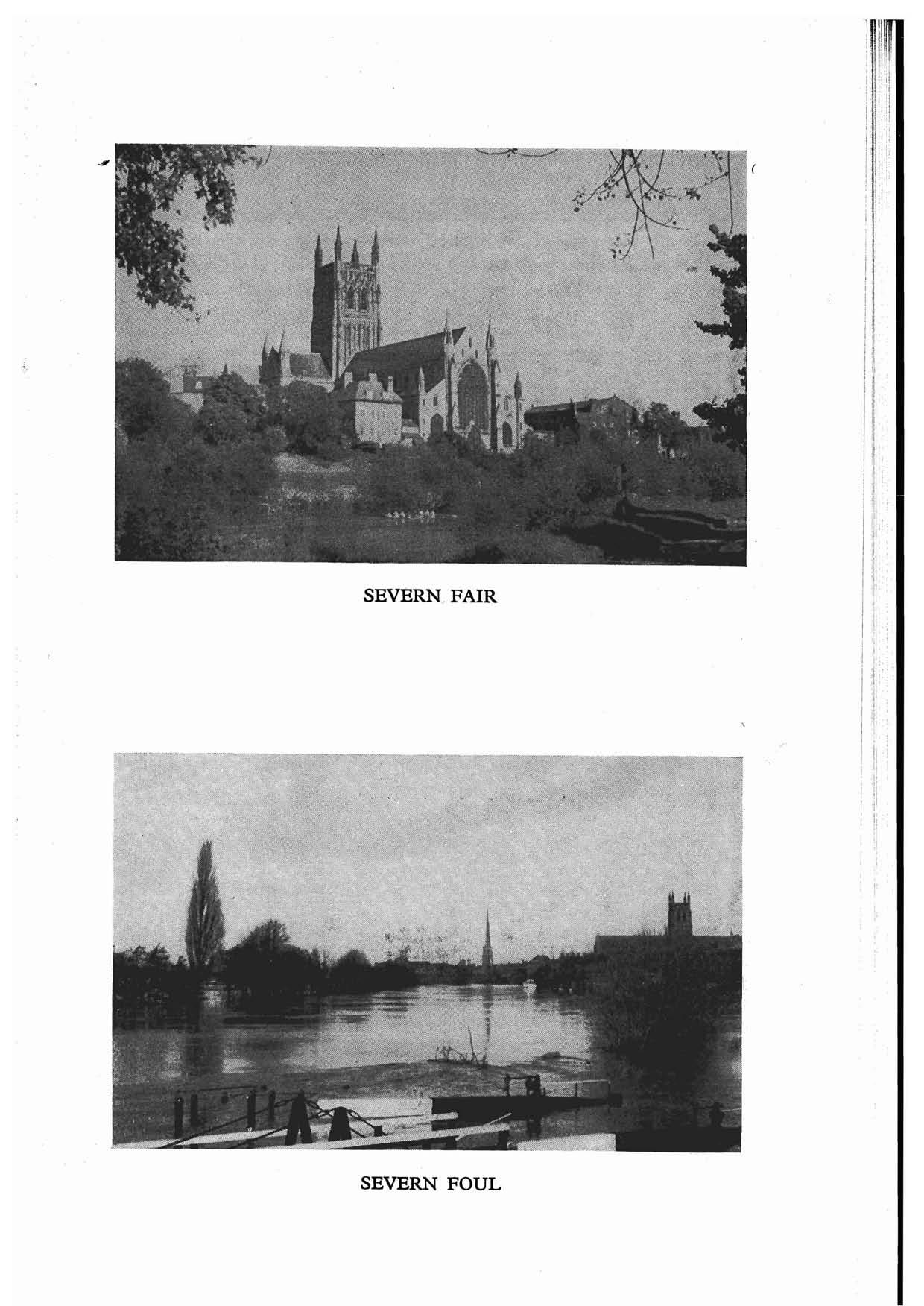
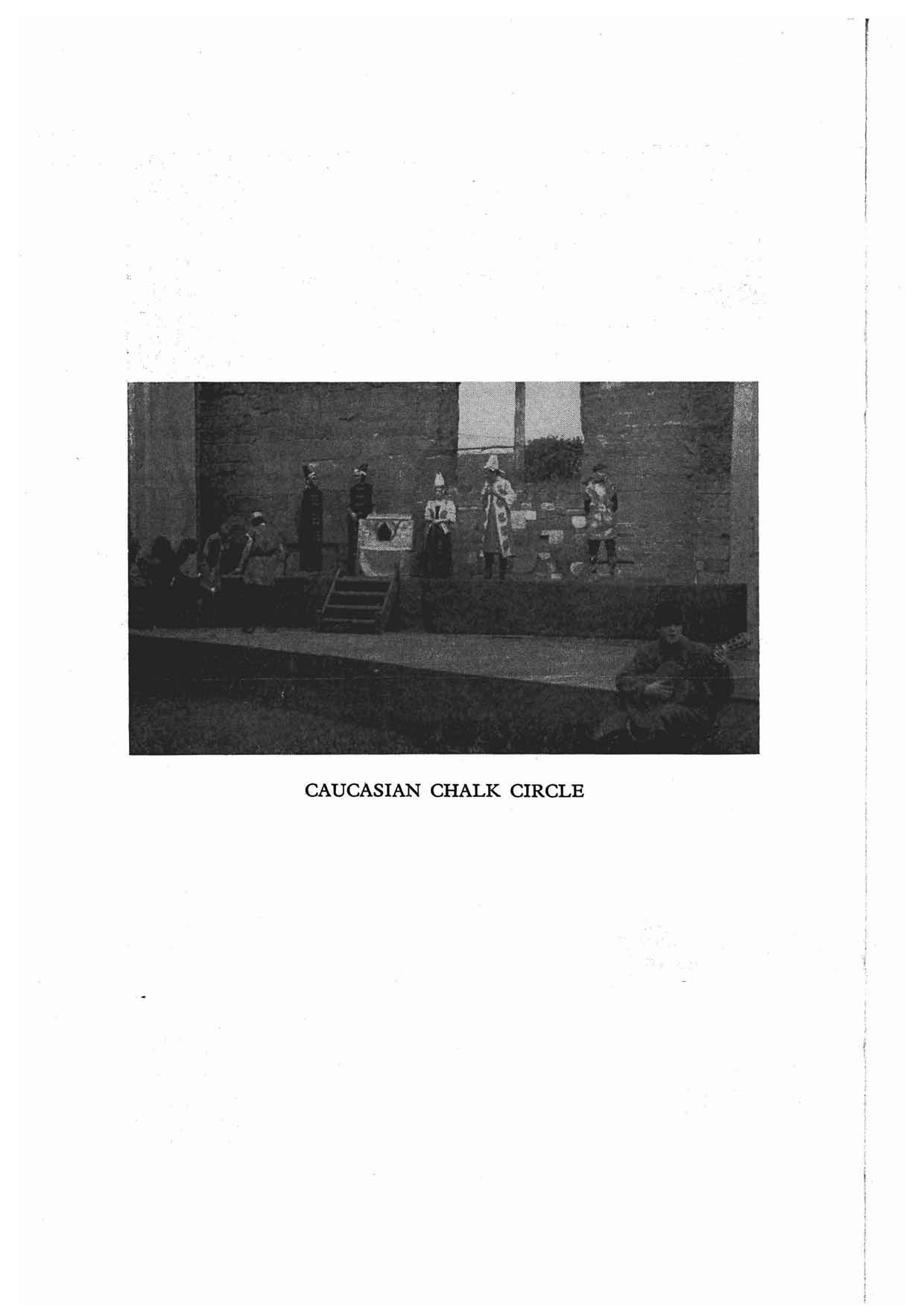
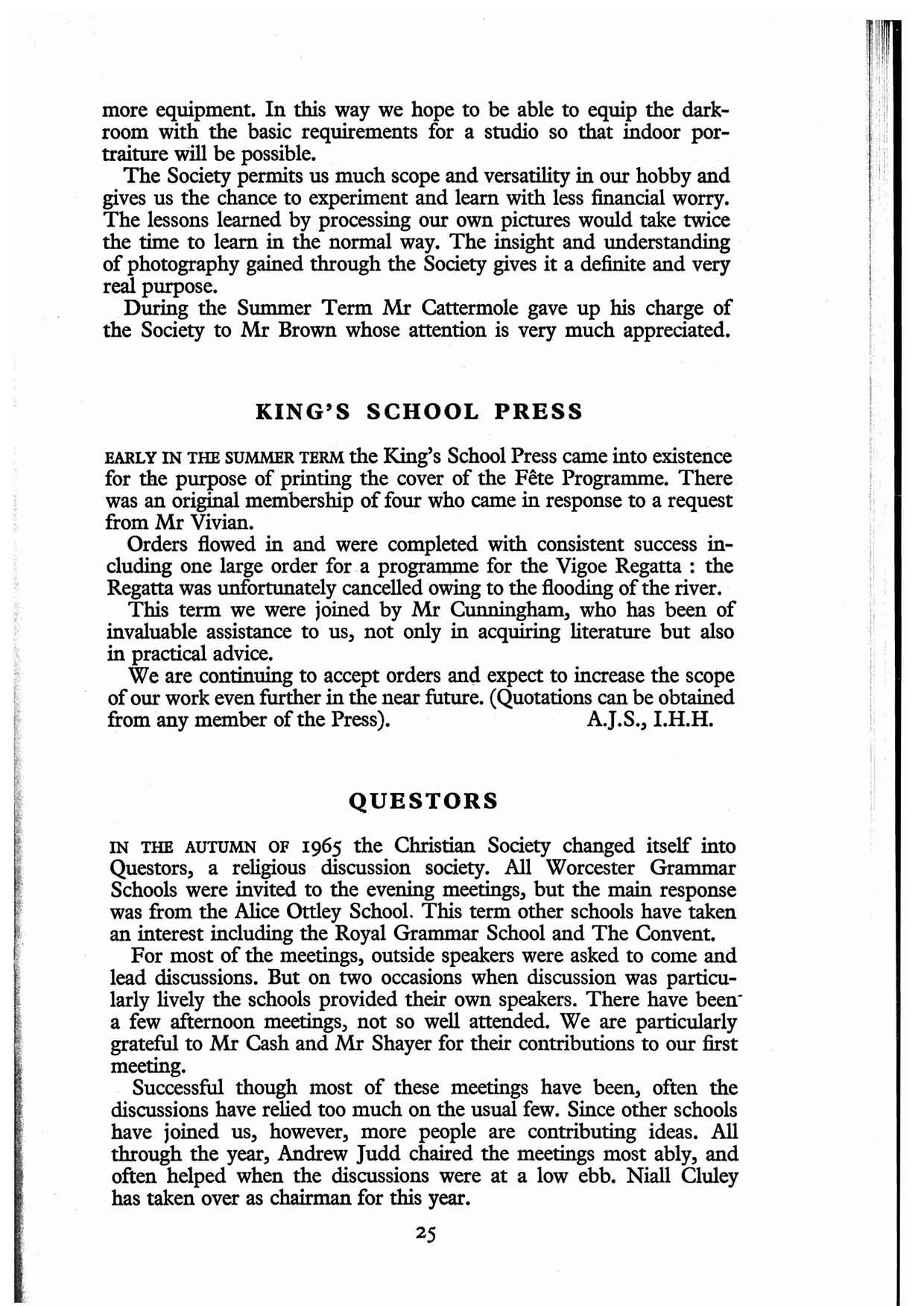
more equipment. In this way we hope to be able to equip the darkroom with the basic requirements for a studio so that indoor portraiture will be possible.
The Society permits us much scope and versatility in our hobby and gives us the chance to experiment and learn with less financial worry. The lessons learned by processing our own pictures would take twice the time to learn in the normal way. The insight and understanding of photography gained through the Society gives it a definite and very real purpose.
During the Summer Term Mr Cattermole gave up his charge of the Society to Mr Brown whose attention is very much appreciated.
EARLY IN THE SUMMER TERM the King's School Press came into existence for the purpose of printing the cover of the Fete Programme. There was an originai membership of four who came in response to a request from Mr Vivian.
Orders flowed in and were completed with consistent success including one large order for. a programme for the Vigoe Regatta : the Regatta was unfortunately cancelled·owing to the flooding of the river.
This term we were joined by Mr Cunningham, who has been of invaluable assistance to us, not only in acquiring literature but also in practical advice.
We are continuing to accept orders and expect to increase the scope of our work even further in the near future. (Quotations can be obtained from any member of the Press).
A.J.S., I.H.H.
IN THE AUTUMN OF 1965 the Christian Society changed itself into Questors, a religious discussion society. All Worcester Grammar Schools were invited to the evening meetings, but the main response was from the Alice Ottley School. This term other schools have taken ;. an interest including the Royal Grammar School and The Convent.
" For most of the meetings, outside speakers were asked to come and lead discussions. But on two occasions when discussion was particularly lively the schools provided their own speakers. There have beena few afternoon meetings, not so well attended. We are particularly grateful to Mr Cash and Mr Shayer for their contributions to our first meeting.
Successful though most of these meetings have been, often the discussions have relied too much on the usual few. Since other schools have joined us, however, more people are contributing ideas. All through the year, Andrew J udd chaired the meetings most ably, and often helped when the discussions were at a low ebb. Niall Cluley has taken over as chairman for this year.

We are very grateful to Mrs Robson for her help with the coffee
arrangements, and to Miss Millest for kindness in allowing us the use, of the Alice Ottley School on two occasions. N.R.C.
THE CHOIR consists of about ten boarders, who are not Cathedral choristers. They sing Sunday services, and lead the chapel singing during the week. The organist is Nicholas Cleobury, who, with the invaluable help of Mr Cattermole, trains the choir and arranges, with . him, the music. The choir has sung evensongs at various churches,
and at Trinity College, Oxford, earlier this term. Last Spring they gave
a concert in St. Swithun's Church, and at the end of this term are to
give a Carol Concert at St. Peter's, Droitwich.
The music library is increasing, and we receive some music from the Cathedral. The programme for the Carol Service is ambitious, and includes much music not performed in the chapel before.
July, 1966
THIS PRODUCTION was the culmination of a year's aettVltles in the Experimental Theatre Club. Starting with a small production of The Long and the Short and the Tall last Summer in Edgar Tower, the group did a variety of plays in readings, put on a production of Endgame in College Hall that had the quality of an experience-so much were the actors identified with the play-and then, in the Summer Term had the audacity, madness, innocence, or perhaps just confidence to decide to stage a production of this great Brecht play.
I think Brecht would have been pleased with this. He was a playwright writing for a theatre that did not exist, a theatre that would be a communal activity, a theatre which would have more in common with the medieval moralities than with the West End theatre that provides entertainment in a context divorced utterly from that in which the audience and actors live their work or their private lives. In fact, at one period of his life Brecht was' writing plays for schools, when he had given up all hope of work in the existent theatre. A strange thought. In this production many of his ideas about the theatre found a natural place, with much less self-conscious effort than would be possible with a London Company, simply because of the circumstances of the Club, of the fact that the play was being put on in a community by a part of that community. There was no sense of this being an amateur
production in the sense that a few people with some technique as actors carry along the rest of a company of wooden performers. Rather in every scene one was aware of the co-operative nature of the playing : no-one stood out as inadequate, a foil for the stars, or unabsorbed in the scene which was taking place.

The count of the cast comes to 90 : by doubling up of parts this was reduced to 38. In addition, there were 17 other people named on the programme as with the staging of the play. This is quite a sizeable enterprise ! In fact, in the last week or two it seemed as if about a quarter of the School were involved in some way or another with the play : this is why I have named no-one apart from the pr<r ducer in this notice. It is notewortthy that this is the first full-scale theatrical production in which every aspect, including the direction, has been in the hands of the pupils of the School : the general pr<r duction having been in the firm hands of James Pettifer.
I gather that rehearsals started about nine weeks before the play was staged, and that after about four weeks it could be said that most people knew their parts. Thereafter the scenes could, be worked on from the aspect of their action and effectiveness, and tended to change in rehearsal. At the same time there was a number of practical problems to be worked on. The stage, in the Guesten gardens, was constructed, and there were the usual technical problems of lighting and sound effects. In addition there was the design both of the masks and costumes, which needed to work in the play according the Brecht's ideas. Then a score of music needed composing to carry the songs of the Story Teller. I mention these questions of logistics to emphasise thatthe.play that was seen was only the visible part of the iceberg, as it were! What of the result ? There is in many of Brecht's plays a strange mixture of archaic material and modern political theory, of a controlling intelligence, which the actor and the audience are expected to co-operate in, and a compassion which cannot be commanded by the intellect at all. These combine to produce an irony : the irony being between the play as a play, and the implications of the play. To my mind this irony was successfully created by the cast. To begin with, the Story Teller's music was in the folk-song idiom, and was sung by a familiar performer in the folk-club. Now the folk-song idiom tends to cosiness, tends to put the mind to sleep. It is possible (T do not say it is always like'this!) to sit on the floor singing "We Shall not be Moved," and in fact be just that : not moved to do anything except enjoy the feeling of participation. But here in the play, the person with the guitar comes out and stands between the play and the audience, by that act creating thought, and as the Noblemen and wives prepare to quit their palace in panic at the approaching enemy, leaving behind the baby Heir-on stage alone with a servant girl-the singer says :
" Don't you know, woman, that she who does not listen to a cry for help
But passes by shutting her ears, will never hear
The gentle call of a lover
Nor the blackbird at dawn .... " and as the girl acts silently the decision to take the baby herself, the singer sings :
, Terrible is the temptation to do good ! ' one was suddenly aware of a familiar part of ones own world being subject to irony just as much as the play itself, and the folk-song is made to carry thought.
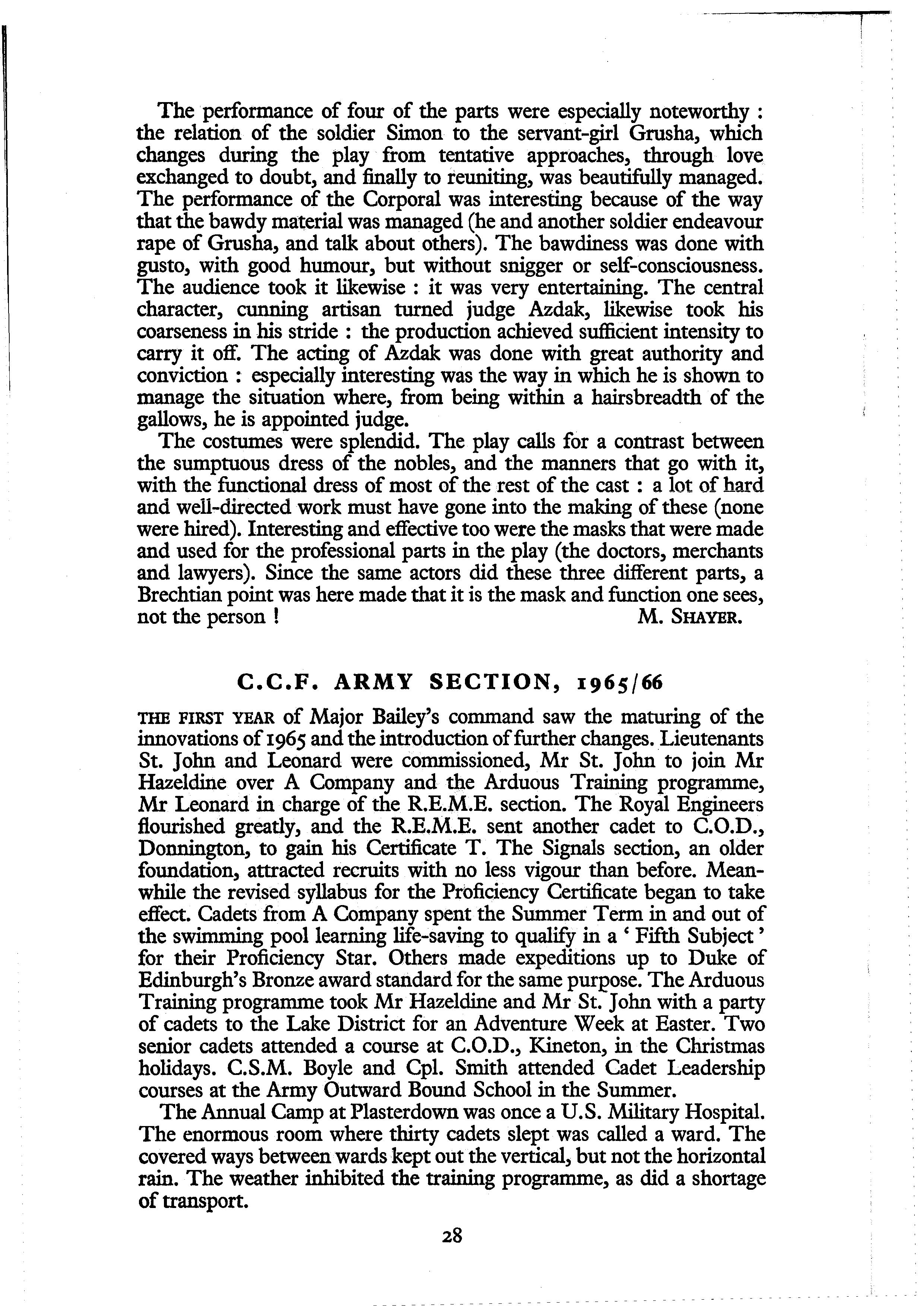
The 'performance of four of the parts were especially noteworthy: the relation of the soldier Simon to the servant-girl Grusha, which changes during the play from tentative approaches, through· love. exchanged to doubt, and finally to reuniting, was beautifully managed. The performance of the Corporal was interesting because of the way that the bawdy material was managed (he and another soldier endeavour rape of Grusha, and talk about others). The bawdiness was done with gusto, with good humour, but without snigger or self-consciousness. The audience took it likewise: it was very entertaining. The central character, Cllnning artisan turned judge Azdak, likewise took his coarsenessin·his stride : the production achieved sufficient intensity to carry it off. The acting of Azdak was done with great authority and conviction :. especially interesting was the way in which he is shown to manage the situation where, from being within a hairsbreadth" of the gallows, he is appointed judge.
The costumes were splendid. The" play calls for a contrast between the sumptuous dress of the nobles, and the manners that" go with it, with the functional dress of most of the rest of the cast : a lot of hard and well-direetedwork must have gone into the making of these (none were hired). Interesting and effective too were the masks that were made and used for the professional parts in the play (the doctors, merchants and lawyers). Since the same actors did these three different parts, a Brechtian point was here made that it is the mask and function one sees, not the person! M. SHAYBR.
THE FIRST YEAR of Major Bailey's command saw the maturing of the innovations of I96sand the introduction offurther changes .. Lieutenants
St. John and Leonard were commissioned, Mr St. John to join Mr Hazelditie over A Company and .t1Ie Arduous Training programme, Mr Leonard in charge of the R.E.M..E. section. The Royal Engineers flourished greatly, and the R.E.M.E. sent another cadet to C.O.D., Donnington, to gain his Certificate T. The Signals section, an older foundation, attracted recruits" with no less vigour than before. Meanwhile the revised'syllabusfor the Proficiency Certificate began to take effect. Cadets from A Company spent the Summer Term in and out of the swimming pool learning life-saving to qualify in a' Fifth Subject ' for their Proficiency Star. Others made expeditions up to Duke of Edinburgh's Bronze award staJidardfor the same purpose. The Arduous Training programme took Mr· Hazeldine and Mr St. John with a party of cadets to the Lake District for an "Adventure Week at Easter. Two senior cadets attended a course at C.O.D., Kineton, in the Christmas holidays. C.S.M. Boyle and Cpl. Smith attended Cadet Leadership courses at the Army Outward Bound School in the Summer. The Annual Camp at Plasterdown was once a D.S. Military Hospital. The enormous room where thirty cadets slept was called award. The covered ways betweenwards·keptoutthe vertical, but not the horizontal rain. The weather inhibited the training programme, as did a shortage of transport.
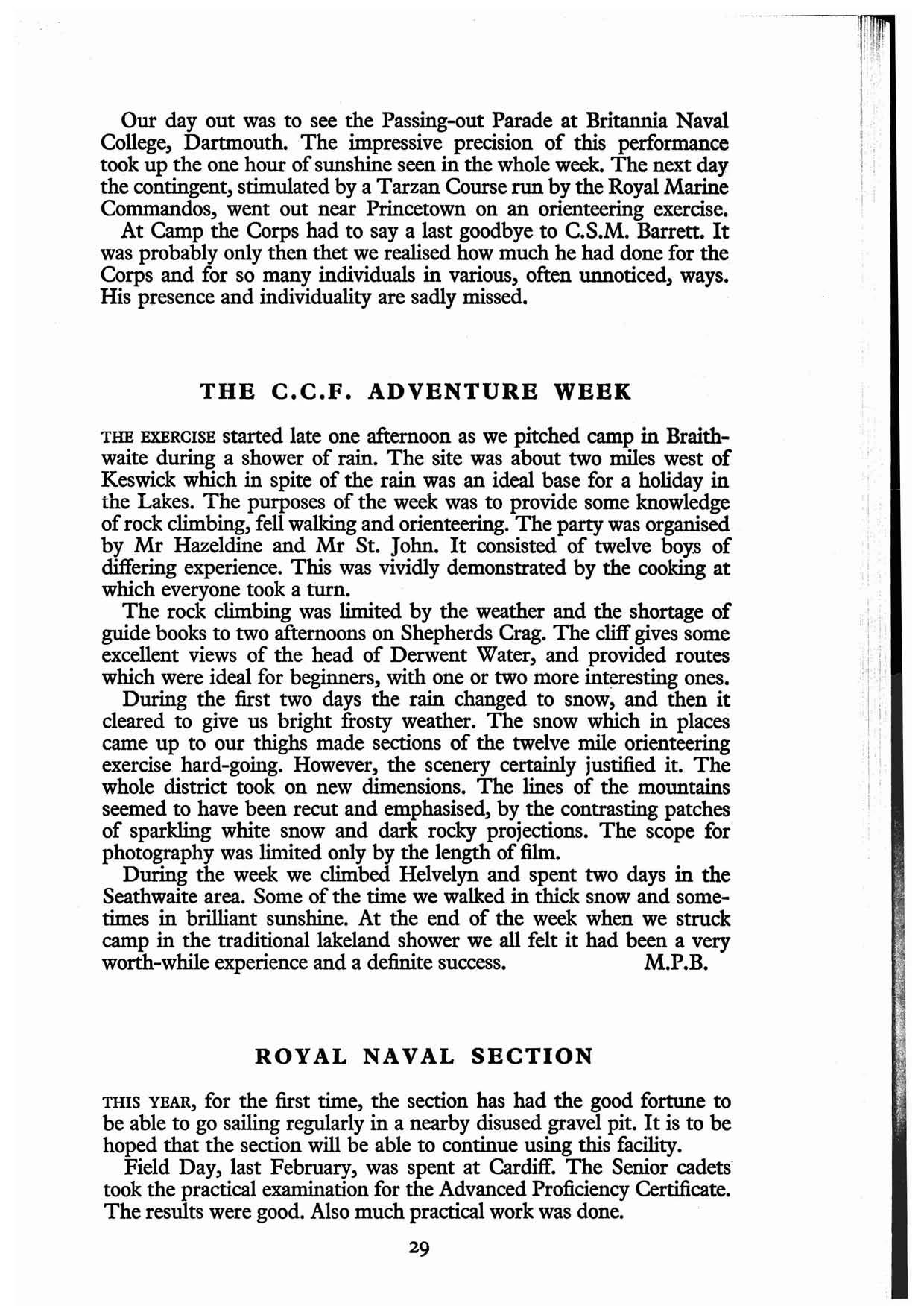
Our day out was to see the Passing-out Parade at Britannia Naval College, Dartmouth.The impressive precision of this took up the one hour of sunshine seen in the whole week. The next day the contingent, stimulated by a Tarzan Course run by the Royal Marine Commandos, went out near Princetown on an orienteering exercise.
At Camp the Corps had to say a last goodbye to C.S.M. Barrett. It was probably only then thet we realised how much he had done for the Corps and for so many individuals in various, often unnoticed, ways. His presence and individuality are sadly missed.
THE EXERCISE started late one afternoon as we pitched camp in Braithwaite during a shower of rain. The site was about two miles west of Keswick which in spite of the rain was an ideal base for a holiday in the Lakes. The purposes of the week was to provide some knowledge of rock climbing, fell walking and orienteering. The party was organised by Mr Hazeldine and Mr St. John. It consisted of twelve boys of differing experience. This was vividly demonstrated by the cooking at which everyone took a turn.
The rock climbing was limited by the weather and the shortage of guide books to two afternoons on Shepherds Crag. The cliff gives some excellent views of the head of Derwent Water, and provided routes which were ideal for beginners, with one or two more interesting ones. During the first two days the rain changed to snow, and then it cleared to give us bright frosty weather. The snow which in places came up to our thighs made sections of the twelve mile orienteering exercise hard-going. However, the scenery certainly justified it. The whole district took on new dimensions. The lines of the mountains seemed to have been recut and emphasised, by the contrasting patches of sparkling white snow and dark rocky projections. The scope for photography was limited only by the length of film.
During the week we climbed Helve1yn and spent two days in the Seathwaite area. Some of the time we walked in thick snow and sometimes in brilliant sunshine. At the end of the week when we struck camp in the traditionallakeland shower we all felt it had been a very worth-while experience and a definite success. M.P.B.
THIS YEAR, for the first time, the section has had the good fortune to be able to go sailing regularly in a nearby disused gravel pit. It is to be hoped that the section will be able to continue using this facility. Field Day, last February, was spent at Cardiff. The Senior cadets took the practical examination for the Advanced Proficiency Certificate. The results were good. Also much practical work was done.

At Easter, twelve cadets from the section went for a week's training in an M.F.V. in the Firth of Clyde. This trip benefitted all who went in the field of practical seamanship, which is, unfortunately, impossible at Worcester. Apart from this, the most enjoyable week provided an unusual and satisfying way of seeing a little-known part of Scotland. The weather was clement. Other cadets also went on a variety of interesting courses for Annual Training. These included an aviation course at Culdrose, a ship in harbour, H.M.S. Scarborough, and a week at the Portsmouth Seamanship School.
Field Day, in June, was spent in doing practical rope work. The General Inspection also presented a fine chance for the section to demonstrate its skills in practical rope work to the inspecting officers.
In October, the section went shooting on the open range at Tiddsely Wood. This is the first time for many years that the section has been shooting and it was a very successful day.
OVER THE PAST TWO YEARS the section has been expanding, with the result that a complement of 60 cadets has now been reached, while Mr Burnett has effectively doubled the numerical strength of the officers.
At the beginning of the year Sergeant Minchin was promoted to Flight Sergeant, Corporal Scandrett to Sergeant and Leading Cadets Gale, Franklin and Walton to Corporals.
The results of' B' Flight's Proficiency examination in March were disappointing on the whole, although Cadet Stallard gained a Distinction, and Cadets Briggs, Condlyffe, John, Holbeche and Robinson recorded passes. Advanced Proficiency presented a brighter picture, with Distinctions for Cadets Ferguson, Lawrenson and Story, Credits for Cadets Baldwyn and Brook and a Pass for Cadet Sinclair-no failures.
Field Day in the Autumn Term took the form of a trip to Filton for Air Experience flights in Chipmunks for' A ' and 'B' Flights, while , C' Flight continued their basic training at School. In February the whole section visited the Navigation Training School at R.A.F., Gaydon, where they were exceptionally we'll looked after, and, although bad weather prevented flying, everyone had a short "trip" at the controls of a full-blown V-Bomber simulator. Summer Field Day was a very fine day in early June, when the section took part in a mapreading and initiative exercise. The map-reading left plenty to be desired, but this did provide opportunity for the use of initiative.
Camp this year, at R.A.F., Colerne, near Bath, was grim, partly because of the weather and partly because of the large number of cadets .. on the station. Flying was unfortunately limited to one or two flights each in a Hastings, while a map-reading exercise was provided,
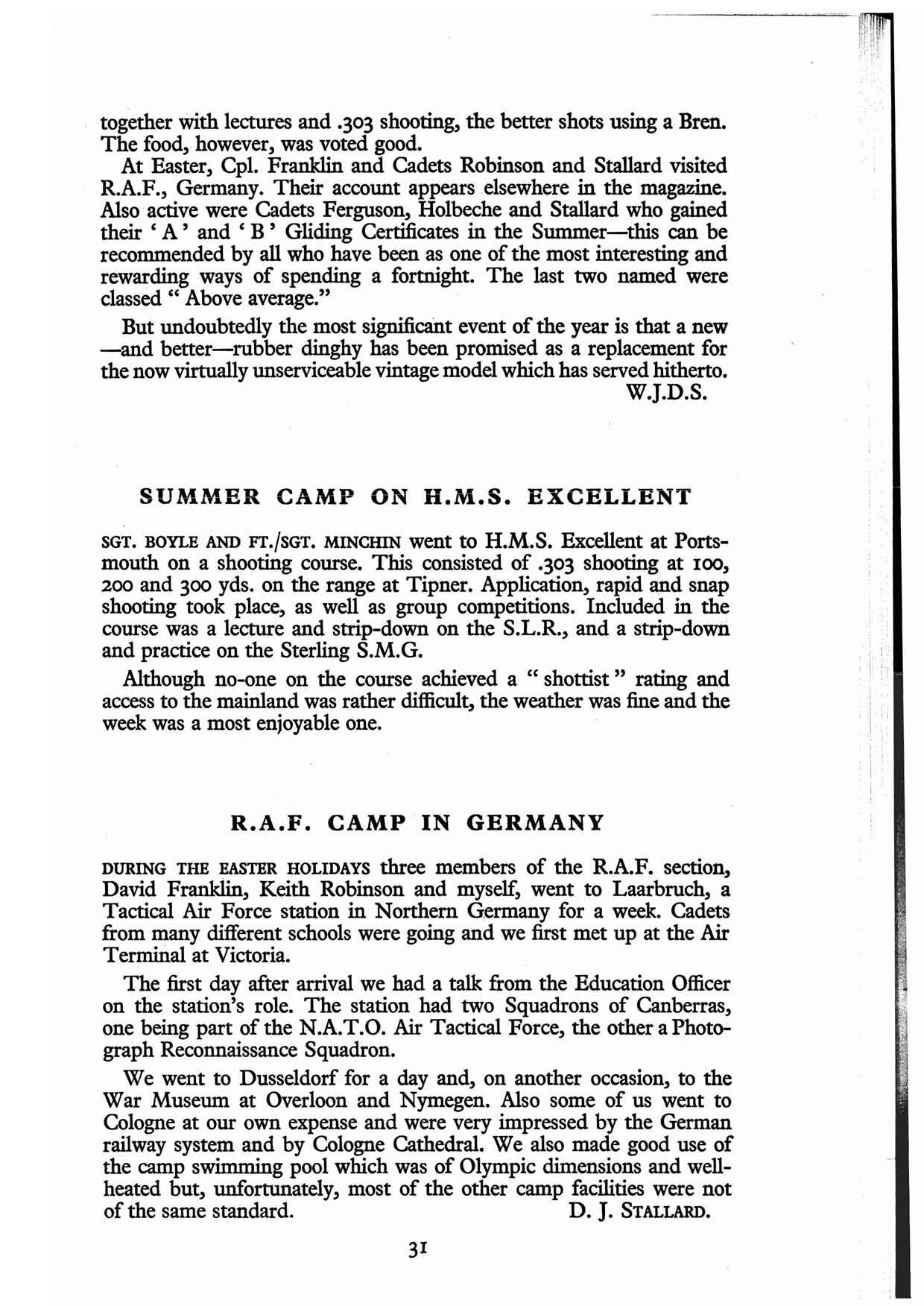
together with lectures and .3°3 shooting, the better shots using a Bren. The food, however, was voted good.
At Easter, Cpl. Franklin and Cadets Robinson and Stallard visited R.A.F., Germany. Their account appears elsewhere in the magazine. Also active were Cadets Ferguson, Holbeche and Stallard who gained their ' A ' and ' B' Gliding Certificates in the Summer-this can be recommended by all who have been as one of the most interesting and rewarding ways of spending a fortnight. The last two named were classed" Above average."
But undoubtedly the most significant event of the year is that a new -and better-rubber dinghy has been promised as a replacement for the now virtually unserviceable vintage model which has served hitherto.
W.J.D.S.
SGT. BOYLE AND FT.!SGT. MINCHIN went to H.M.S. Excellent at Portsmouth on a shooting course. This consisted of .3°3 shooting at 100, 200 and 300 yds. on the range at Tipner. Application, rapid and snap shooting took place, as well as group competitions. Included in the course was a lecture and strip-down on the S.L.R., and a strip-dowri and practice on the Sterling S.M.G.
Although no-one on the course achieved a "shottist" rating and access to the mainland was rather difficult, the weather was fine and the week was a most enjoyable one.
DURING THE EASTER HOLIDAYS three members of the R.A.F. section, David Franklin, Keith Robinson and myself, went to Laarbruch, a Tactical Air Force station in Northern Germany for a week. Cadets from many different schools were going and we first met up at the Air Terminal at Victoria.
The first day after arrival we had a talk from the Education Officer on the station's role. The station had two Squadrons of Canberras, one being part of the N.A.T.O. Air Tactical Force, the other a Photograph Reconnaissance Squadron.
We went to Dusseldorf for a day and, on another occasion, to the War Museum at Overloon and Nymegen. Also some of us went to Cologne at our own expense and were very impressed by the German railway system and by Cologne Cathedral. We also made good use of the camp swimming pool which was of Olympic dimensions and wellheated but, unfortunately, most of the other camp facilities were not of the same standard.
D. J. STALLARD.
THE TOTAL MEMBERSHIP of the Group this year has been 123. This is a rise of seven over last year. With some reluctance the Scouters' Council has agreed that the process of continual expansion will have to, be arrested and reversed. It is clear that as numbers rise above the hundred mark, the quality of the Scout training deteriorates. To prevent this problem reaching serious proportions, the Council intend gradually to reduce numbers to nearer the hundred mark by restricting the entry
and introducing a waiting list.
During the year a Queen's Scout Badge has been gained by M. V. B.
Nelson. Senior Training Courses have included Meteorologist, Forester, Fireman and Civics Badge courses. The Scout Section have been occupied with second and first class badge requirements ; but have also found time to gain badges for canoeing, cooking, camping, stalking, swimming and public-speaking. We have been indebted to the Fire Service for the Fire Training and to Mr John Dale for the courses in Forestry and Civics. Mr Dale also organised a most successful joint C.C.F. and Scout night initiative hike during the Summer Term. The highlight of this was without doubt the post which required competitors to cross the swift-flowing Teme in a single-seater paddleless canoe.
Other 'activities have been numerous. During the Michaelmas Term, the Seniors spent Field Day map-reading in the Forest of Dean; the Scouts went to the Wyre Forest and got themselves thoroughly lost on a wide-game. Also during this term the Scout P.L.'s had a week-end training course at the Cape!.
During the Easter Term, the Seniors spent Field Day at Richards Castle, ending the day with a hike to LUdlow ; Troop 1 went to Bredon to brave the hill in a torrential storm; Troops 2 and 3 went to Ryhdd Covert to try to cook in the same conditions. In the holidays the Seniors went to camp at Kinver, where they constructed a variety of hazardous apparatus, and whither they were subsequently joined by some of the Juniors who held Patrol camps there. Other patrol camps were held at Rhydd Covert; and two had to be cancelled owing to the return of Winter conditions. Towards the end of the holidays a party of twelve Juniors went to T.S. Foudroyant at Gosport for a week's sail training.
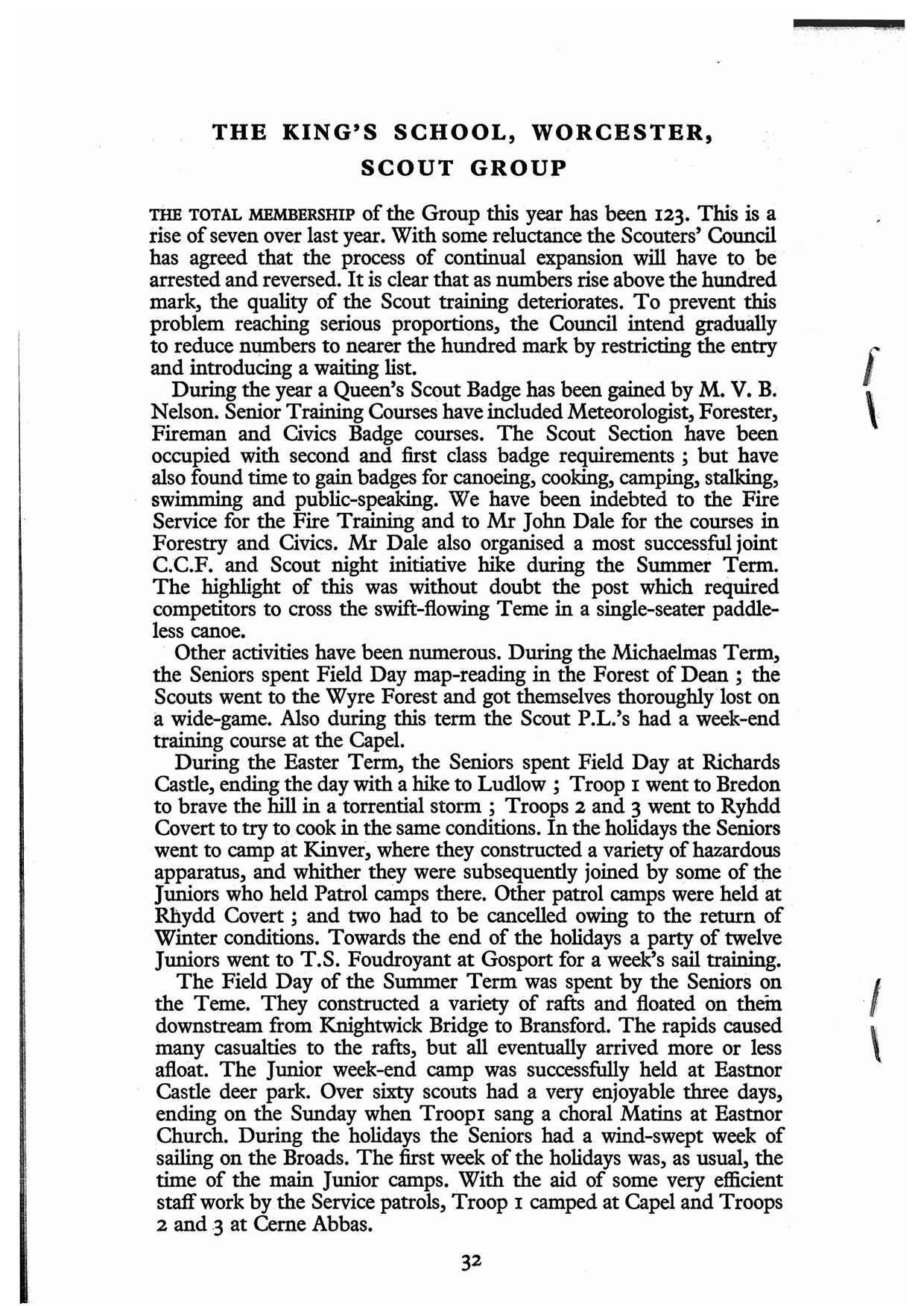
IThe Field Day of the Summer Term was spent by the Seniors on the Teme. They constructed a variety of rafts and floated on them 'I downstream from Knightwick Bridge to Bransford. The rapids caused '\1" many casualties to the rafts, but all eventually arrived more or less afloat. The Junior week-end camp was successfully held at Eastnor Castle deer park. Over sixty scouts had a very enjoyable three days, ending on the Sunday when Troopl sang a choral Matins at Eastnor Church. During the holidays the Seniors had a wind-swept week of sailing on the Broads. The first week of the holidays was, as usual, the time of the main Junior camps. With the aid of some very efficient staff work by the Service patrols, Troop I camped at Capel and Troops 2 and -3 at Ceme Abbas.
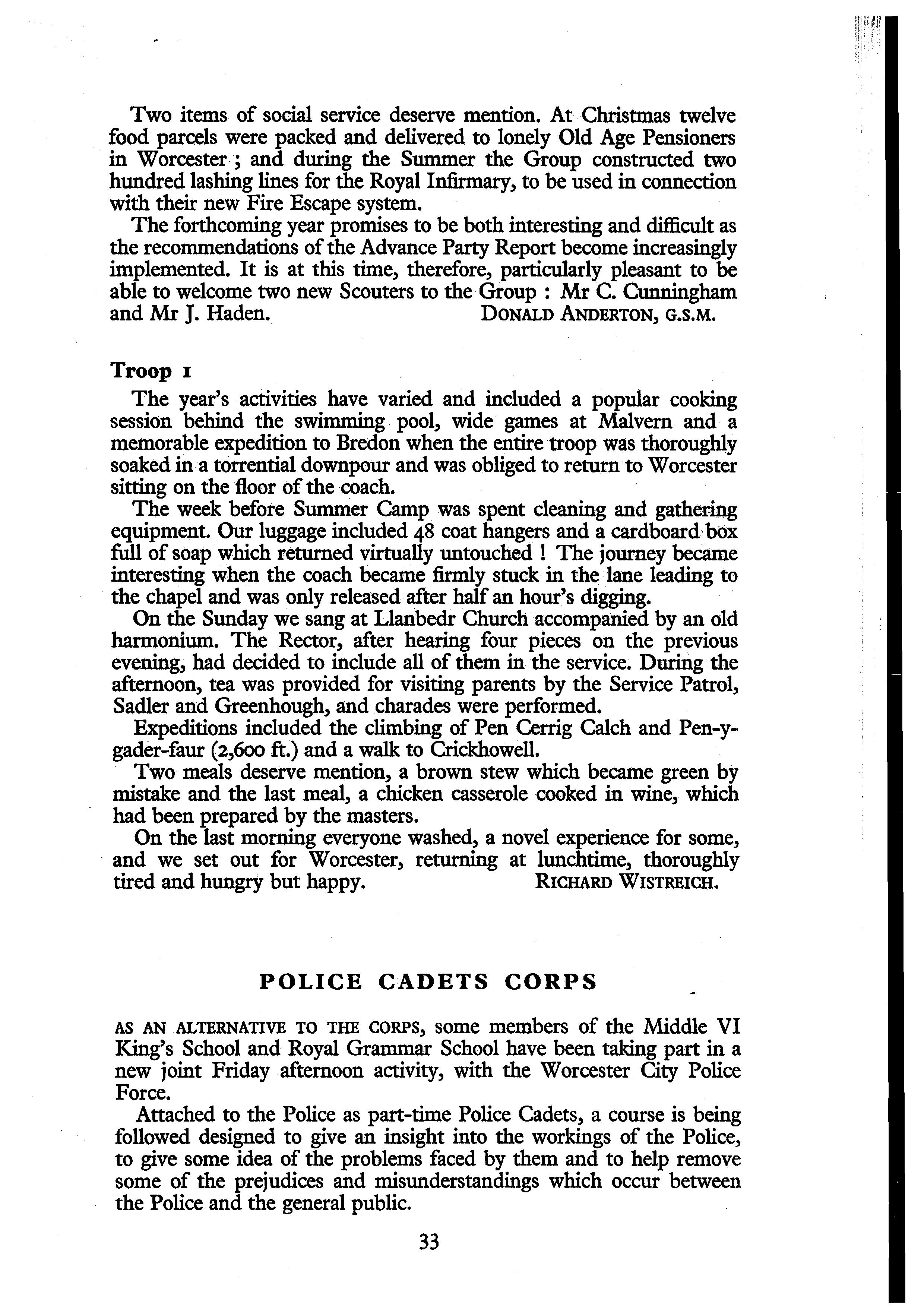
Two items of social service deserve mention. At -.Christmas twelve . food parcels were packed and delivered to lonely Old Age Pensioners . in Worcester-; and during the Summer the Group constructed two hundred lashing lines for the Royal Infirmary, to be used in connection with their new Fire Escape system.
The forthcoming year promises to be both interesting and difficult as the recommendations of the Advance Party Report become increasingly implemented. It is at this time, therefore, particularly pleasant to be able to welcome two new Scouters to the Group: MrC. Cunningham and Mr J. Haden. DONALD ANDERTON, G.S.M.
The year's activities have varied arid· included a popular cooking session behind the swimming. pool, wide games at Malvern. and a memora:ble expedition to Bredon when the entire ·troop 'was thoroughly soaked torrential downpour and was obliged to return·to Worcester 'sitting on the floor of the ·coach.
The week before Summer Camp was spent cleaning and gathering equipment. Our luggage included 48 coat hangers and a cardboard· box full of soap which returned virtually untouched! The journey became interesting when the coach became firmly stuck· in the lane leading to . the chapel and was only released-after. an ·hour's digging.
On the Sunday we sang- at Llanbedr Church;accompQniedbyan -old harmonium. The Rector, after hearing four pieces on the previous evening, had decided to include all of them in the service. During the afternoon, tea was provided for visiting parents by the Service Patrol, Sadler- and Greenhough, and charades were performed.
Expeditions included the climbing of Pen Cerrig Calch and Pen-ygader-faur (2,600 ft.) and a walk to Crickhowen.
Two meals deserve mention, a brown stew which became green by mistake and the last meal, a chicken casserole cooked in wine,. which . had been prepared by the masters.
On the last morning everyone washed, a novel experience for some, and we set out for Worcester, returning at lunchtime, thoroughly tired and hungry but happy. RICHARD WISTREICH.
AS AN ALTERNATIVE TO THE CORPS, some members of the Middle VI King's School and Royal Grammar School have been taking part in a new joint Friday afternoon activity, with the Worcester City Police Force.
Attached to the Police as part-time Police Cadets, a course is being followed designed to give an insight into the workings of the Police, to give some idea of the problems faced by them and to help remove some of the prejudices and misunderstandings which occur between the Police and the general public.
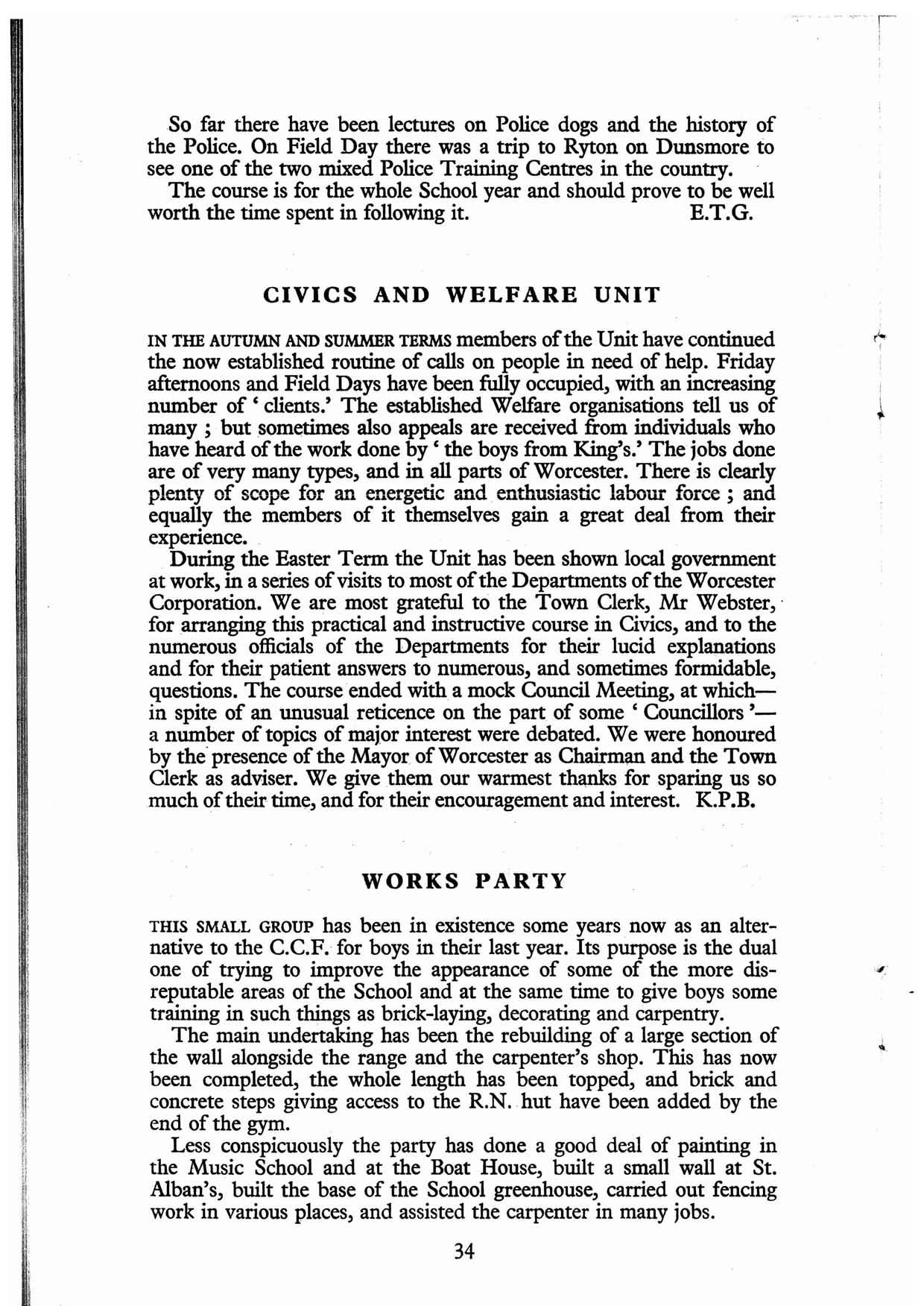
So far there have been lectures on Police dogs and the history of the Police. On Field Day there was a trip to Ryton on Dunsmore to see one of the two mixed Police Training Centres in the country. The course is for the whole School year and should prove to be well worth the time spent in following it.
E.T.G.
IN THE AUTUMN AND SUMMER TERMS members of the Unit have continued the now established routine of calls on people in need of help. Friday afternoons and Field Days have been fully occupied, with an increasing number of' clients.' The established Welfare organisations tell us of many ; but sometimes also appeals are received from individuals who have heard of the work done by , the boys from King's.' The jobs done are of very many types, and in all parts of Worcester. There is clearly plenty of scope for an energetic and enthusiastic labour force ; and the members of it themselves gain a great deal from their expenence.
During the Easter Term the Unit has been shown local government at work,in a series of visits to most of the Departments of the Worcester Corporation. We are most grateful to the Town Clerk, Mr Webster,' for arranging this practical and instructive course in Civics, and to the numerous officials of the Departments for their lucid explanations and for their patient answers to numerous, and sometimes formidable, questions. The course·ended with a mock Council Meeting, at whichin spite of an unusual reticence on the part of some ' Councillors'a number of topics of maior interest were debated. We were honoured by the' presence of the Mayor of Worcester as Chairman and the Town Clerk as adviser. We give them our warmest for sparing us so much of their time, and for their encouragement and interest. K.P.B.
THIS SMALL GROUP has been in existence some years now as an alternative to the C.C.F. for boys in their last year. Its purpose is the dual one of trying to improve the appearance of some of the more disreputable areas of the School and at the same time to give boys some training in such things as brick-laying, decorating and carpentry.
The main undertaking has been the rebuilding of a large section of the wall alongside the range and the carpenter's shop. This has now been completed, the whole length has been topped, and brick and concrete steps giving access to the R.N. hut have been added by the end of the gym.
Less conspicuously the party has done a good deal of painting in the Music School and at the Boat House, built a small wall at St. Alban's, built the base of the School greenhouse, carried out fencing work in various places, and assisted the carpenter in many jobs.
Progress on any big undertaking is necessarily slow, for a maximum of two hours on a Friday afternoon, to assemble equipment, cement and clear away;does not leave very long for actual Perhaps it is as well to make this point as we start on a new wall at the garage end of the Science block. A further disadvantage is that boys are only in the party for one year, so that they leave almost as soon as
they are "trained," and each September we have to start afresh.
Despite all this, though, I think some useful work gets done, and, when a boy leaves the party, I hope he is a better handyman than when he
joined.

THIS IS A COURSE held at the Worcester Technical College, jointly with the W.R.G.S., for sixth formers, instead of normal Friday afternoon activities. The course consists of a number of visits to local firms, like Metal Box, Heenan and Froude, Redmans, as well as a few visits to Worcestershire farms. This enables one to gain a considerable insight into the functioning and management of industry. The important points, which arise from the visits, are emphasised and clarified by a series of talks and discussions with union, management and college officials as well as with the aid of films, and it is both interesting and most worthwhile.
IN AUGUST, 1966, Mr Cubberley and the Precentor took a party of 32 members of the School to Rome and Florence for thirteen days. The entire journey was made by rail. The crossing of the Channel was boisterous, but most members of the party enjoyed it. To the delight of the railway enthusiasts on the trip, the first part of the journey through Northern France was made behind a steam engine. We breakfasted at Basle and crossed the Alps through the St. Gotthard tunnel ; the beautiful scenery of the Alps was marred by the torrential rain, though it was still impressive.
We changed trains at Milan, and it was here that we were first introduced to the barbaric behaviour ofthe plebeian Italian rail traveller. It is a great wonder that the coaching stock was not severely damaged; we were fortunate in having reserved compartments.
We arrived at Rome at about midnight, having spent over thirty hours travelling. We were transported swiftly and not without peril in a 'bus to our accommodation at the Hotel Cristallo.
The stay at Rome lasted for five days, during which optional excursions were made to various places of interest. Rome is a commercial city, swarming with Americans, peasants and other races, but abounding in interesting churches, palaces and, of course, impressive Roman
I'
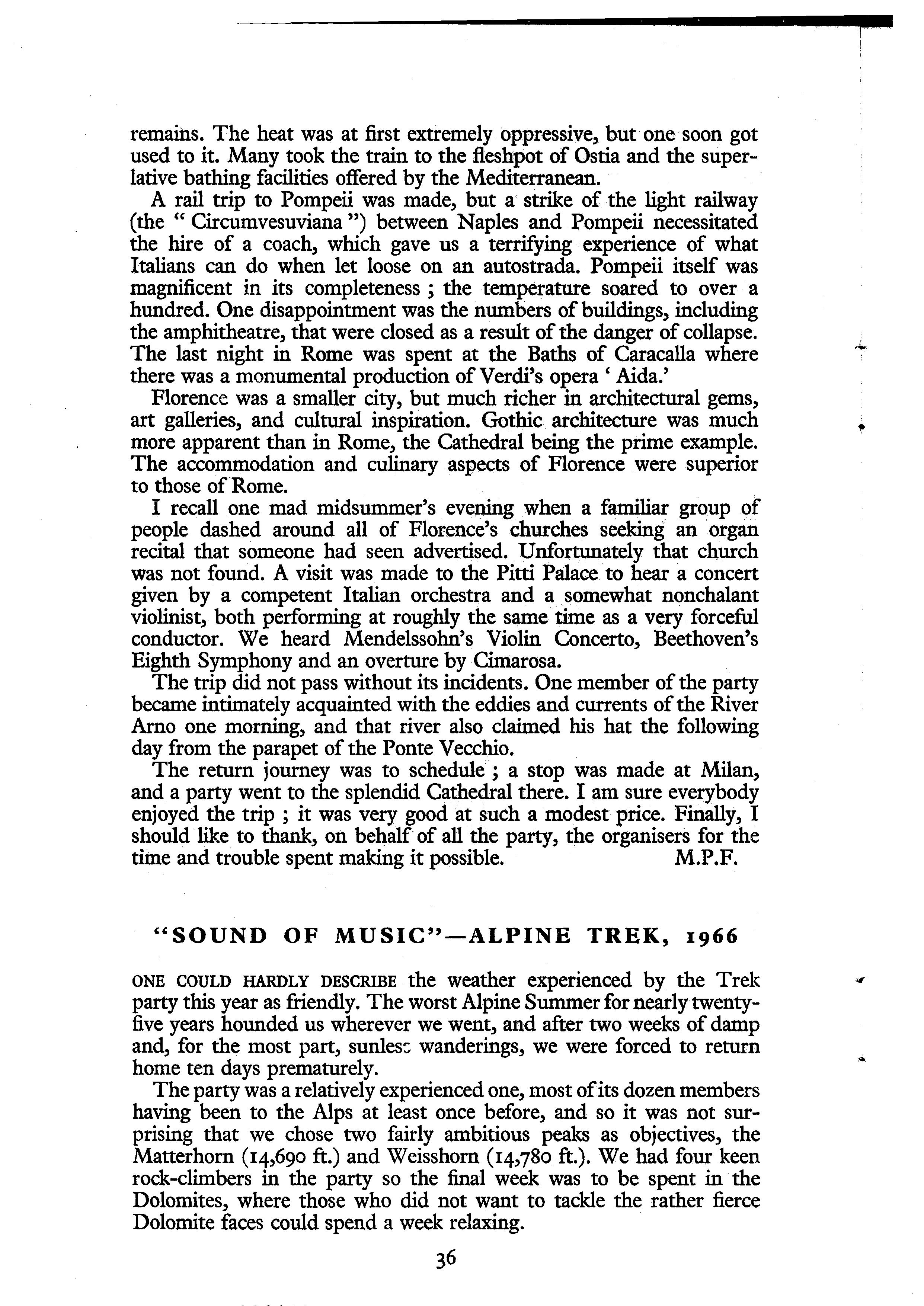
remams. The heat was at first extremely op.pressive, but one-soon got used to it. Many took the train to the fieshpot of Ostia and the superlative bathing facilities offered by the Mediterranean. '
A rail trip to Pompeii was made, but a strike of the light railway (the " Circumvesuviana ") between Naples and Pompeii necessitated the hire of a coach, which gave us a terrifying experience of what Italians can do when let loose on an autostrada. Pompeii itself was magnificent in its completeness; the temperature s'oared to over a hundred. One disappointment was the numbers of buildings, including the amphitheatre, that were closed as a result of the danger of collapse. The last night in Rome was spent at the Baths of Caracalla where there was a monumental production ofVerdi's opera' Aida.'
Florence was a smaller city, but much richer in architectural gems, art galleries, and cultural inspiration.GQtbic architecture was much more apparent than in Rome, the Cathedral being the prime example. The acco1l1111odation and culinary . aspects <;>f Florence were superior to those of "Rome.
l recailone mad midsummer's eveJ).ing ,when. a .group of people dashed around all of Florence's churches seeking' an organ recital that someone had seen advertised.. Unfonunately that church was not found. A visit was made to the Pitti Palace to hear a concert given by a competent Italian orchestra and a ,&omewhat n()nchalant violinist, both performing at roughly the same time as a very: forceful conductor. We heard Mendelssohn's Violin Concerto, Beethoven's Eighth Symphony and an overture by Cimarosa.
The trip did not pass without its incidents. One member of the party became intimately acquainted with the eddies and currents of the River Arno one morning, and that river also claimed his hat the following day from the parapet of the Ponte Vecchio.
The return journey was to schedule; a stop was made at Milan, and a party went to the splendid there. lam sure everybody enjoyed the trip; it was very good 'at such a modest-price. Finally,. I should'like to thank, on of all'the party, the organisers for-the tUne and trouble spent making it possible. M.P.F.
ONE COULD HARDLY DESCRIBE the weather experienced by the Trel{ party this year as friendly. The worst Alpine Summer for nearly twentyfive years hounded us wherever we went, and· after"'two ·weeks of damp and, for the most part, sunles: wanderings, we were forced to return home ten days prematurely.
The party was a relatively experienced one, most of its dozen members having been to the Alps at least once before, and so it was not surprising that we chose two fairly ambitious peaks as objectives, the Matterhorn (14,690 ft.) and Weisshorn (14,780 ft.). We had four keen rock-climbers in the party so the final week was to be spent in the Dolomites, where those who did not want to tackle the rather fierce Dolomite faces could spend a week relaxing. '
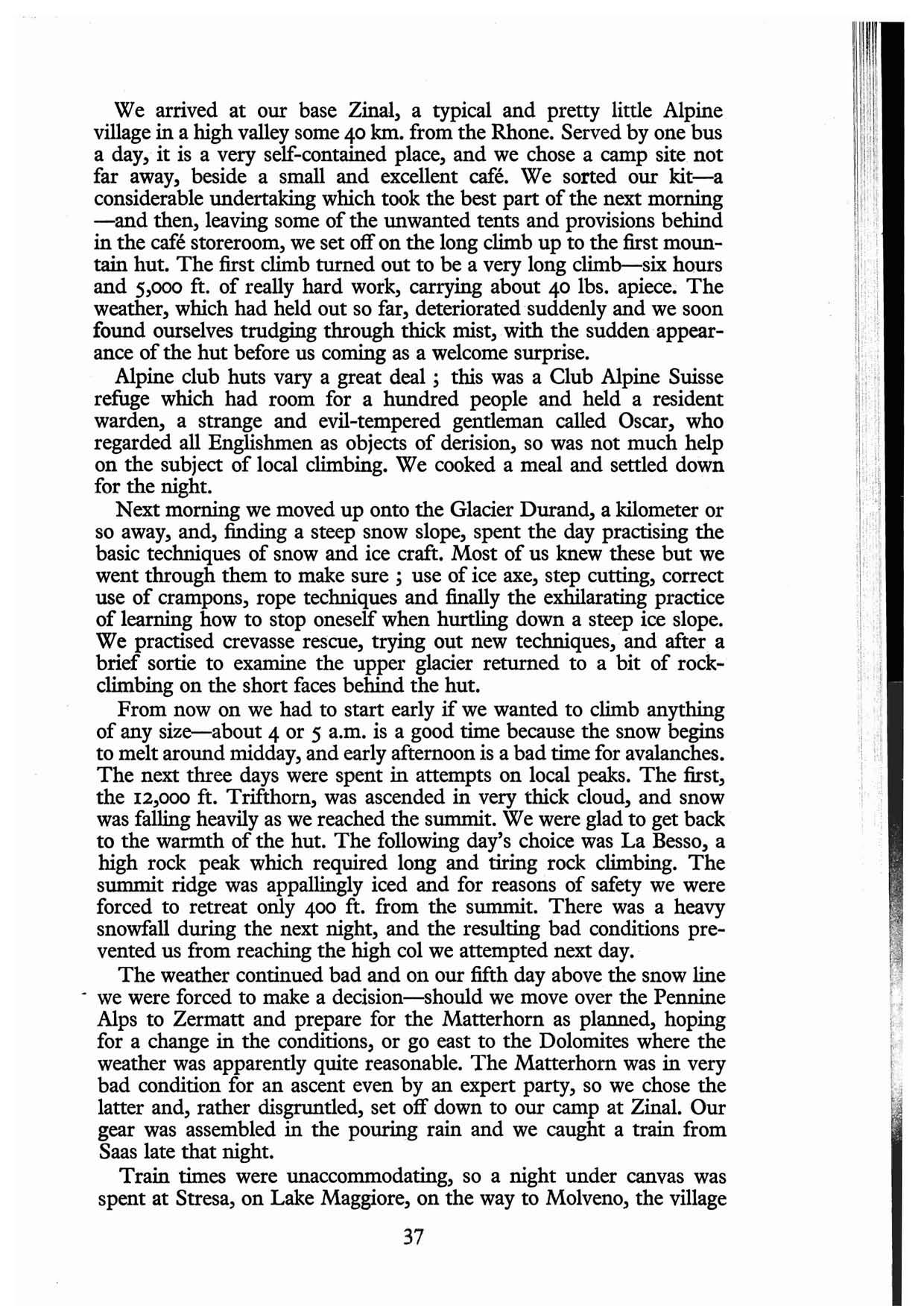
We arrived at our base Zinal, a typical and pretty little Alpine village in a high valley some 40 km. from the Rhone. Served by one bus a day, it is a very self-contained place, and we chose a camp site not far away, beside a small and excellent cafe. We sorted our kit-a considerable undertaking which took the best part of the next morning -and then, leaving some of the unwanted tents and provisions behind in the cafe storeroom, we set off on the long climb up to the first mountain hut. The first climb turned out to be a very long climb-six hours and 5,000 ft. of really hard work, carrying about 40 lbs. apiece. The weather, which had held out so far, deteriorated suddenly and we soon found ourselves trudging through thick mist,. with the sudden appearance of the hut before us coming as a welcome surprise.
Alpine club huts vary a great deal; this was a Club Alpine Suisse refuge which had room for a hundred people and held a resident warden, a strange and evil-tempered gentleman called Oscar, who regarded all Englishmen as objects of derision, so was not much help on the subject of local climbing. We cooked a meal and settled down for the night.
Next morning we moved up onto the Glacier Durand, a kilometer or so away, and, finding a steep snow slope, spent the day practising the basic techniques of snow and ice craft. Most of us knew these but we went through them to make sure ; use of ice axe, step cutting, correct use of crampons, rope techniques and finally the exhilarating practice of learning how to stop oneself when hurtling down a steep ice slope. We practised crevasse rescue, trying out new techniques,· and after a brief sortie to examine the upper glacier returned to a bit of rockclimbing on the short faces behind the hut.
From now on we had to start early if we wanted to climb anything of any size-about 4 or 5 a.m. is a good time because the snow begins to melt around midday, and early afternoon is a bad time for avalanches. The next three days were spent in attempts on local peaks. The first, the 12,000 ft. Trifthorn, was ascended in very thick cloud, and snow was falling heavily as we reached the summit. We were glad to get back to the warmth of the hut. The following day's choice was La Besso, a high rock peak which required long and tiring rock climbing. The summit ridge was appallingly iced and for reasons of safety we were forced to retreat only 400 ft. from the summit. There was a heavy snowfall during the next night, and the resulting bad conditions prevented us from reaching the high col we attempted next day.
The weather continued bad and on our fifth day above the snow line - we were forced to make a decision-should we move over the Pennine Alps to Zermatt and prepare for the Matterhorn as planned, hoping for a change in the conditions, or go east to the Dolomites where the weather was apparently quite reasonable. The Matterhorn was in very bad condition for an ascent even by an expert party, so we chose the latter and, rather disgruntled, set off down to our camp at Zinal. Our gear was assembled in the pouring rain and we caught a train from Saas late that night.
Train times were unaccommodating, so a night under canvas was spent at Stresa, on Lake Maggiore, on the way to Molveno, the village
we· had chosen in Italy. It proved to. be an excellent little place on the side of a large lake, and three hours walking distance from the heart of the Brenta Dolomites. The rock-climbers among us could not wait to get their hands· on these gleaming limestone towers, so they set off as soon as possible and spent three days doing some excellent climbing, even though it rained incessantly, and generally having a fine time, details of which would fill a small book. The rest of the party fished, swam, went walking or just lazed. When it rained most of them suc-· ceeded in learning a little Italian from the local girls.
Mter four days in these delightful surroundings the weather was still overcast and rainy, and a phone call to Zermatt revealed that conditions there were very bad indeed. We reluctantly decided to abandon hopes of climbing the Matterhorn, and as our stay in Italy was governed mainly by the weather, we had little alternative but to try to chase what sun there was over the border to Austria.
On then to Innsbruck, for a stormy night, thence to Lucerne. The single day there was quite pleasant, but· forecasts were so bad that this was our last stop before Boulogne, London and Worcester.
Disappointing weather, yes. Only one peak conquered To outward appearances, perhaps the 1966 Alpine Trek was not such a success. But to those involved, an experience like this cannot fail to be a success ; whatever the achievements, whatever the weather, one inevitably gains tremendously from the friendship and interdependency of a party of this type. Many of those who have been once have asked to go again, most have .developed a lasting love for the mountains and all will remember the Alpine Trek for many years to come.
M.E.L.

"CHAPEL
Once again this year a group of old choristers with Messrs Beswick, Bramma and Cattermole went down to the Chapel at Llanbedr for the week after the Three Choirs' Festival. Stores were fetched from Crickhowell and milk from a nearby farm. The Headmaster visited us on two occasions, and there were rumours that the Dean might also come.
Every day we went for walks, including one to a most beautiful church at Partrishow, on a typically wet Welsh day. Other walks included going up the whole valley to Waun Fach and back.
N.R.C.
This year during the summer holidays Mr Hargreaves and Mr St. John took a party of fifteen Lower Remove boys to a camp in the grounds of the School Chapel at Llanbedr in Brecknocl,shire. The purpose of this was to give us some idea of camping, walking, and rock climbing.
During the week we set off with maps and compasses on several combined fell walks over the Black Mountains and one -over the Brecon Beacons in all of which we took turns to lead Fimilly,:towards the end of the week we',were dropped off the 'bus at various poihtsin groups of three and left to make our own way back to' the chapel via two mountain tops.
As well as these walks we did some rock climbing on two afternoons, and had an orienteering race. This is a Swedish sport in which we had to find our way to several barns, footbridges, or gates, map references for each. The main objects were speed, endurance, and accurate compass and map reading.
, However, the most popular events were two "night excercises" which took place on a boggy, nettle-ridden 300 yard course in the pitch dark. The winning team was the one which was first to get'the bucket from the opposition's enclosure to their own. There were, of course, (almost) no holds barred in stopping your opponents.
The camp was such a success that I am sure that everyone who went this time would not hesitate if a chance to go again next year was given.
A. MVSSETr, P. M. RICHARDs, R. C. SMITH.
The total sum contributed was £546. The Committee decided that £500 of this should be invested to provide an income for annual grants, while £46 should be set aside for the purchase of furniture for a " quiet room" in School House to be known as the McTurk Room.
This year grants from the Fund have been made for 3 projects. Brief accounts of these are given below: more detailed and technical reports are being submitted to the Trustees of -the Fund.
I. A. J. Dyson-A study of (£10).
2. C. J. Tolley-A survey of the, breeding of on the Fame Islands (£5). ,
3. A. C. Swindell and I. D. Sykes-An investigation into the origin and history of railway lines in Worcestershire and the surrounding counties (sum 1J.ot yet allocated).
If anyone who has not yet contributed to the Fund would like to do so" donations will be gratefully received by the Headmaster.
Worcestershire Railways
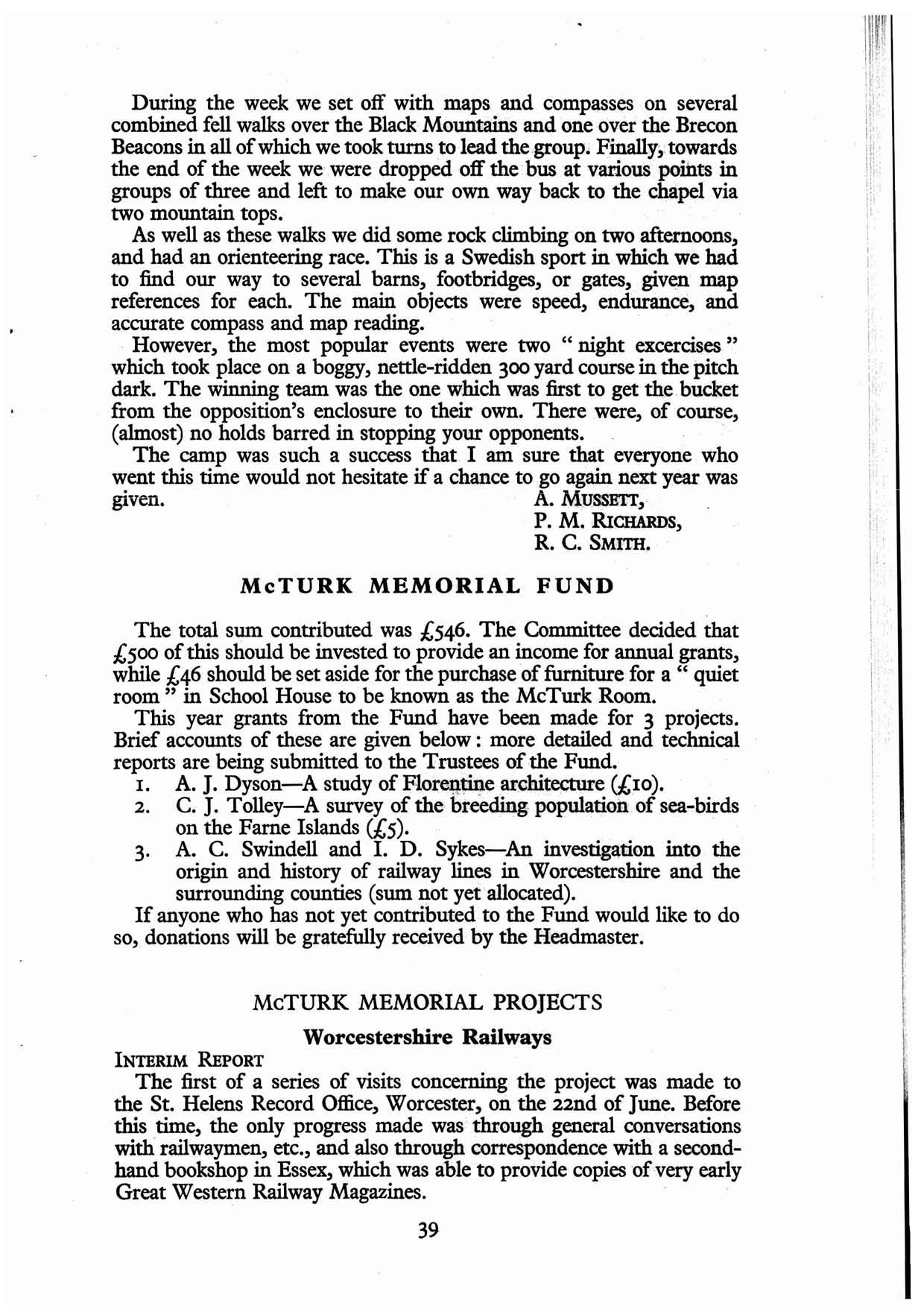
INTERIM REpORT
The first of a series of visits concerning the project was made to the St. Helens Record Office, Worcester, on the 22nd of June. Before this time, the only progress made was tlu:ough general conversations with railwaymen, etc., and also through correspondence with a secondhand bookshop in Essex, which was a:bleto provide copies ofvery early Great Western Railway Magazines.

During mid-July a number of visits were paid to libraries in Worcester, Malvern and Kidderminster, with a view to examining old documents and out-of-print books with some degree of success.
At last, on the lOth of August, a trip was made to Shrewsbury by: car, following the route of the Severn Valley Railway for much of the way, calling at Bridgenorth, Ironbridge, Buildwas and Cressage to take photographs and survey the sites. About two hours were spent actually at Shrewsbury Station, where the Severn Valley bay-platforms wasinspeeted and where, much to our delight we found a small collection of old G.W. parcel-labels bearing the name HAMPTON LOADE -an old S.V.R. station. We also paid a brief visit to Much Wenlock Station.
On the 16th of August was the first of a number of visits to the offices of· the Kidderminster Shuttle ; the generous assistance of the staff there enabled the compilation of a great deal of information relating to local railway lines prior to 1880.
On the 17th of August, after negotiation with British Rail, we made a journey from Kidderminster Goods Yard to Alverley, in the guard's van of a goods train. Fortunately, it was an extremely good day and we were able to obtain good photographs of a line no longer used by passenger trains indeed only used by a few coal trains. Mter arrival at Alverley, we traversed the section onwards to Hampton Loade on foot before returning home on the late-afternoon coal train to Kidderminster.
On the 27th of August an inspection was made of the old Clee Hill Mineral Railway but unhappily the only visible remains were in the form of old rails bent to make fencing. On the same day we called at Tenbury Wells station (long since closed), photographed some ancieBt signs, of pre-1923 vintage, and worked out the original station layout.
On the 30th of August, we called at the house of the Precentor, who allowed us to refer to an early book of Parliamentary transportacts, which he had generously uncovered in the Cathedral library.
The3rd of September saw the Dowty Railway Preservation Society Open Day at Ashchurch, and we were there.
A. C. SWINDELL,1. D. SYKES.
It is difficult to sum in one short account that whic_h will probably take me months of consideration to tie together. The study of Florentine Architecture I made last Summer went much deeper than I anticipated. The atmosphere of Florence was such that it was almost impossible to "study" in a cold-blooded way. One talked and discussed, experienced and considered, rather than mechanically noting academic facts.
I arrived in Florence with Mr Cubberley's Party which returned to England·after four days. I stayed for a further eight days during which time I existed on my McTurk Bursary. I stayed in a student hostel and ate where I could in the city.
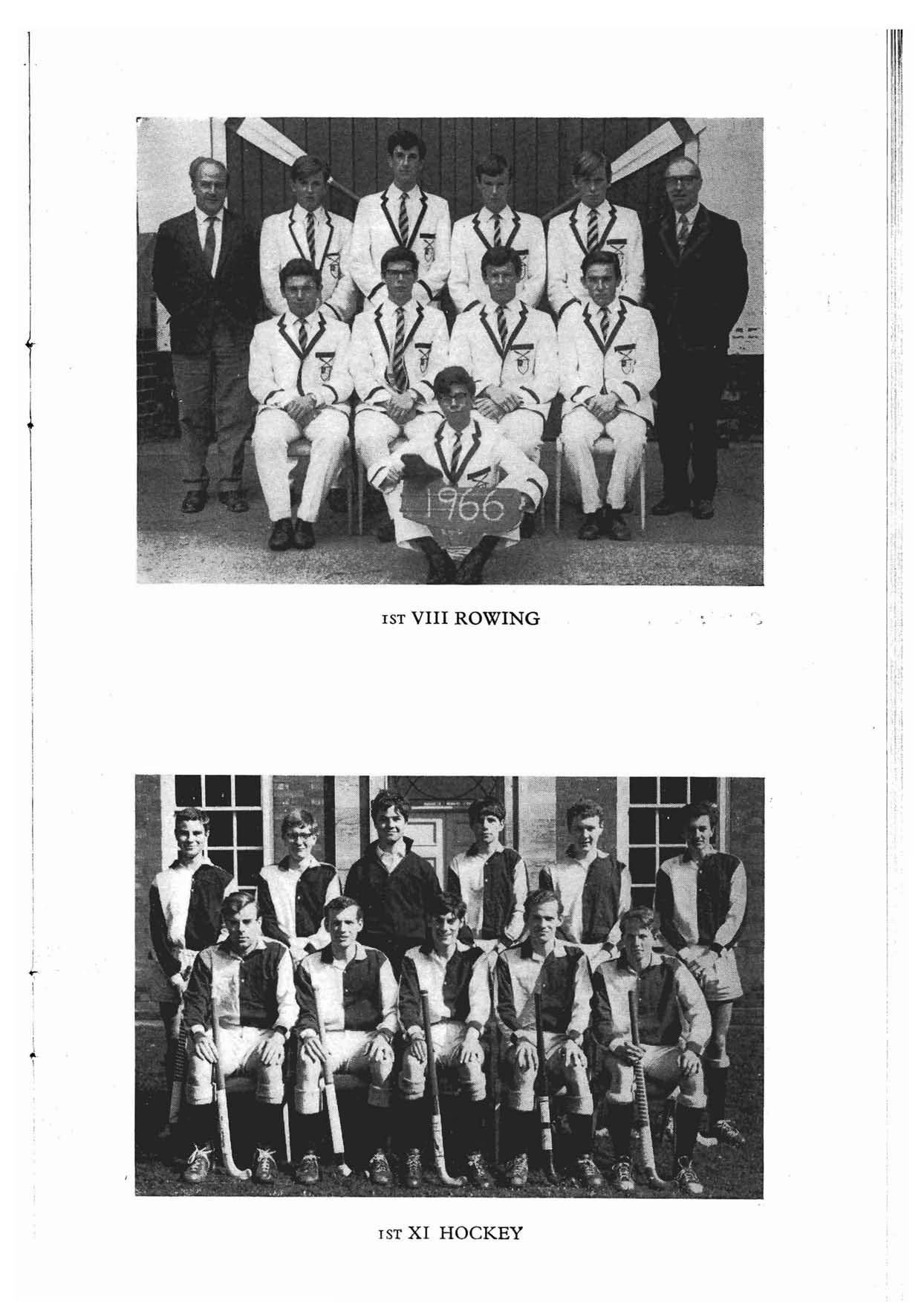
1ST XI HOCKEY
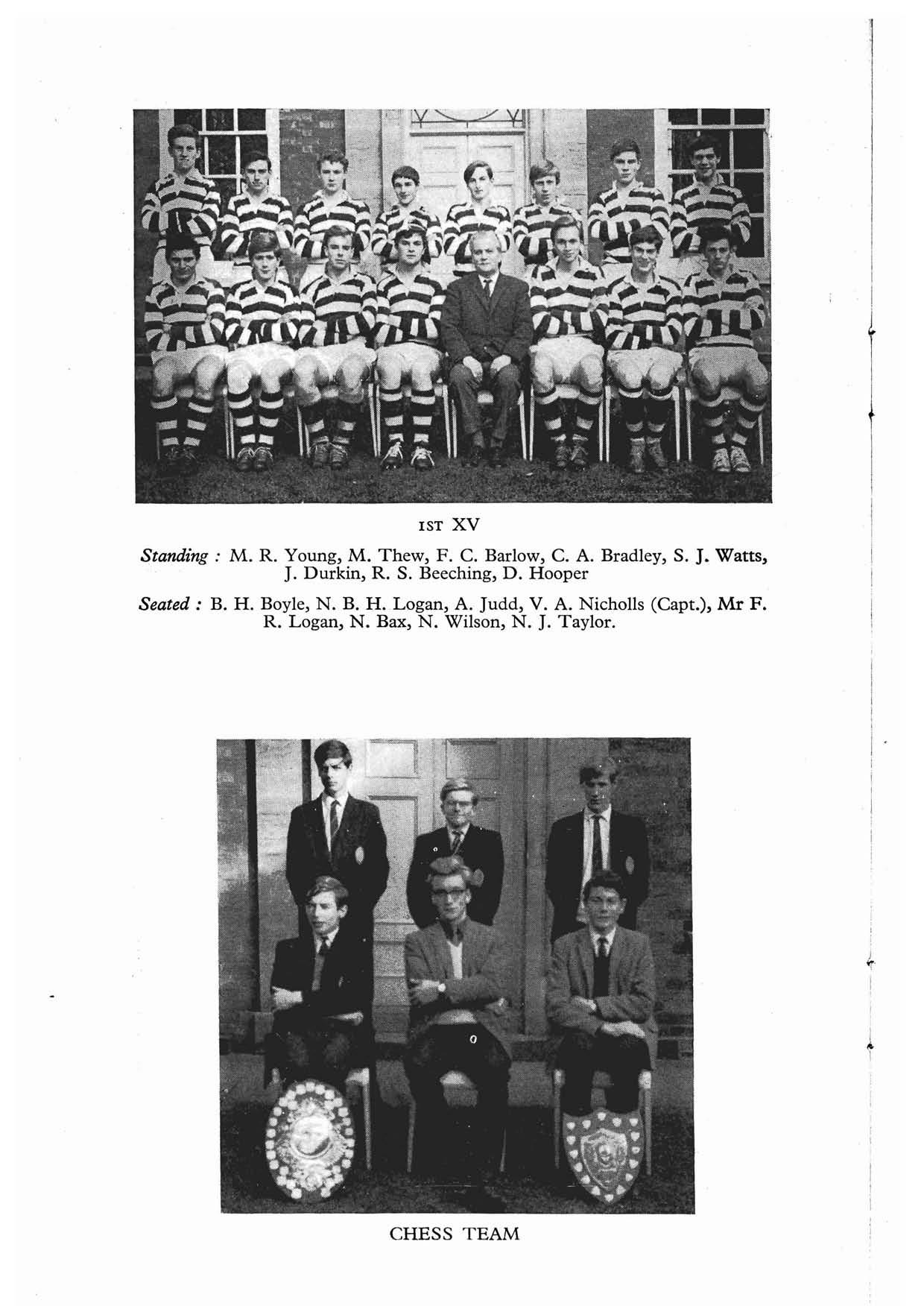
Standing: M. R. Young, M. Thew, F. C. Barlow, C. A. Bradley, S. J. Watts, J. Durkin, R. S. Beeching, D. Hooper
Seated: B. H. Boyle, N. B. H. Logan, A. Judd, V. A. Nicholls (Capt.), Mr F. R. Logan, N. Bax, N. Wilson, N. J. Taylor.
I suppose the most obvious factor of Florentine church architeCture that I experienced, was the natural progression in style from' ROmanesque to Michelangelo. This was partly due to the building materials. White and deep green-grey marbles, contrasting in simple and also complex patterns, appeared in Romanesque and Early Renaissance facades. The Roman tradition had never really been lost, the Gothic buildings being for the most part of simple proportions with equilateral arches and circles. The architects of the Early Renaissance thought the Romanesque buildings to be Roman. It was in this fifteenth century that the city "flowered," architects such as Brunelleschi the mathematician and Michelozzo with his graceful buildings favoured by Cosimo de Medici, building with clean lines of grey marble, contrasting against plain white walls, squares and circles, logic and claritz. When the great power of Michelangelo began to work an architecture in the city towards the end of the High Renaissance he followed the traditions of his predecessors closely.
The city from the top of Brunelleschi's Dome seemed to hang in the valley, su...,.ounded by dark !;Leen hills and turquoise distances. From up there I saw large expances of terra:-cotta biles, roasting under the hot sun,. punctuated here and there by the few large. buildings of stone or marble. These larger buildings were all close to the Cathedral square which, with the Piazza Signoria with the Palace of the Lords towering above, had the feeling of the heart of the city.
From the streets, the dry yellow-ochre seemed quite arid. In this way the, city contrasted with Rome, Venice and Sienna, these being more colourful with their deep reds, oranges and pinks. On wet days Florence became rather dull, almost drab, and the terrible flood, recently, must have made the city an absolute shambles. The buildings should not have been harmed too much but I despair, feeling dreadfully worried about Ghiberti's doors to the Baptistery and Cimabue's Crucifixion. These were two of the greatest treasures of the city. Florentine art (including architecture) has influenced the world. Some of. the carvings in the nineteenth century woodwork in· Worcester Cathedral bearing more relations to Florentinequattrocento work than. English (;othic. '
I am eternally grateful to the Cotnmittee of the McTurk Bursary for enabling me to make this study of worthwhile depth. A.J.D.

Visit to the Fame Islands
July 25th - August 1st, 1966
Under a grant from the McTurk Memorial Fund
With the help of a grant from the McTurk Memorial Fund, I visited the Fame Islands for a week this Summer. The Fame Islands are situated from two to four miles off the Northumberland coast, .and consist of about six or seven large islands, with numerous smaller ones, most of which are merely rock, with no vegetation.
1
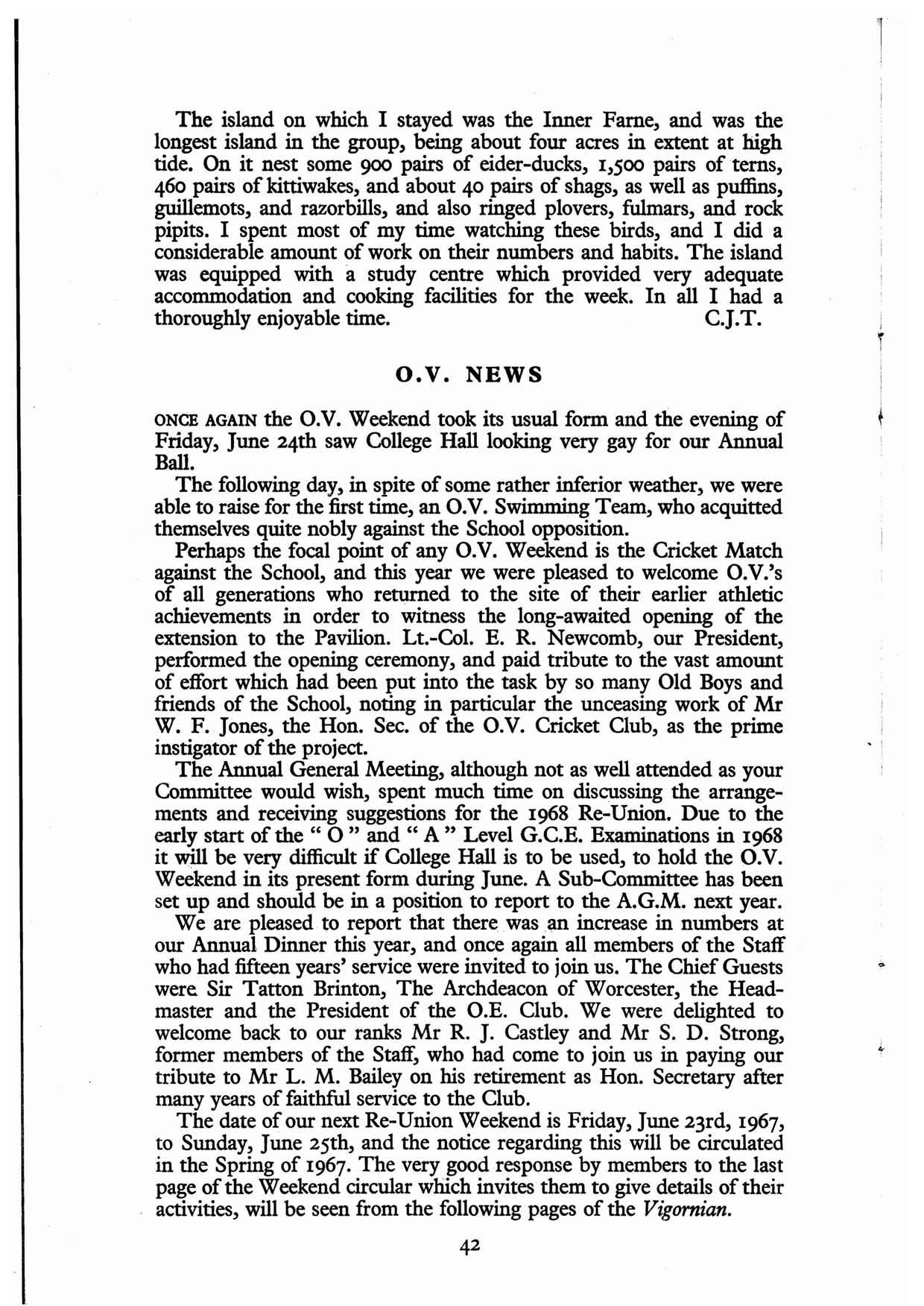
The island on which I stayed was the Inner Fame, and was the longest island in the group, being about four acres in extent at high tide. On it nest some 900 pairs of eider-ducks, 1,500 pairs of terns, 460 pairs of kittiwakes, and about 40 pairs of shags, as well as puffins, guillemots, and razorbills, and also ringed plovers, fulmars, and rock pipits. I spent most of my time watching these birds, and I did a considerable amount of work on their numbers and habits. The island was equipped with a study centre which provided very adequate accommodation and cooking facilities for the week. In all I had a thoroughly enjoyable time. C.J. T.
ONCE AGAIN the O.V. Weekend took its usual form and the evening of Friday, June 24th saw College Hall looking very gay for our Annual Ball.
The following day, in spite of some rather inferior weather, we were able to raise for the first time, an O.V. Swimming Team, who acquitted themselves quite nobly against the School opposition.
Perhaps the focal point of any O.V. Weekend is the Cricket Match against the School, and this year we were pleased to welcome O.V.'s of all generations who returned to the site of their earlier athletic achievements in order to witness the long-awaited opening of the extension to the Pavilion. Lt.-Col. E. R. Newcomb, our President, performed the opening ceremony, and paid tribute to the vast amount of effort which had been put into the task by so many Old Boys and friends of the School, noting in particular the unceasing work of Mr W. F. Jones, the Hon. Sec. of the O.V. Cricket Club, as the prime \ instigator of the project.
The Annual General Meeting, although not as well attended as your Committee would wish, spent much time on discussing the arrangements and receiving suggestions for the 1968 Re-Union. Due to the early start of the " 0" and " A " Level G.C.E. Examinations in 1968 it will be very difficult if College Hall is to be used, to hold the O.V. Weekend in its present form during June. A Sub-Committee has been set up and should be in a position to report to the A.G.M. next year.
We are pleased to report that there was an increase in numbers at our Annual Dinner this year, and once again all members of the Staff who had fifteen years' service were invited to join us. The Chief Guests were. Sir Tatton Brinton, The Archdeacon of Worcester, the Headmaster and the President of the O.E. Club. We were delighted to welcome back to our ranks Mr R. J. Castley and Mr S. D. Strong, ; former members of the Staff, who had come to join us in paying our tribute to Mr L. M. Bailey on his retirement as Hon. Secretary after many years of faithful service to the Club.
The date of our next Re-Union Weekend is Friday, June 23rd, 1967, to Sunday, June 25th, and the notice regarding this will be circulated in the Spring of 1967. The very good response by members to the last page of the Weekend circular which invites them to give details of their activities, will be seen from the following pages of the Vigornian.
It is very distressing that each time the Magazine and the Weekend agenda is circularised, at least 30 copies are returned" Address Unknown." This results in eventually many members complaining they have not received any literatUre regarding the Club. So once again it must be stressed that the only way a member can remain on our mailing list, is by notifying the Hon. Sec., Mr J. P. Pimley, I Bull Ring, Worcester, of any change of address.
Finally, we would like to congratulate all those who have gained admission to Universities or Colleges of Higher Education, and are I proud to record that this year 29 Old Boys have obtained this distinction.

IAt the Annual General Meeting it was proposed that in order to encourage O.V.'s to meet in the Provinces, local organisers for specific areas should have their names and addresses published in the Vigonian Magazine. This will enable any Old Boys to make contact with other members of the Club in their own area.
A. F. Drake, 118 Allport Lane, Bromborough, Cheshire offered his services for the Mersey-Side area, and Mr M. Gwynn of Flat 3, 26 Portland Road, Edgbaston, Birmingham, for the Birmingham area.
Volunteers in other areas would be most welcome.
The London Dinner this year was held on Friday, October 14th, 1966, at the Printers Devil, 98 Fetter Lane, E.C.4. The President of the Club, Lt.-Col. E. R. Newcomb, M.C., was in the chair, and in the unavoidable absence of the Headmaster, we were pleased to welcome Mr H. Ferrar.
The toast of" The School" was proposed by R. G. Meers, who, in the course of a most amusing speech, reminded us of the quality of cricket match teas, and bemoaned the rape of the City Centre. In reply, Mr Ferrar, in his usual inimitable style, dealt most ably with all the points raised by Mr Meers, and a few that he didn't !
At the conclusion of the proceedings, we decided that on the first Friday in each month, starting in December, but excluding January, O.V.'s could be found in the Printers Devil from 5.30 p.m. onwards. We hope that we shall see many old friends a little more often than we have in the past, and that these evenings will become a popular rendezvous for O.V.'s in London.
In spite of the fact that no new members were acquired over the past year, the Old Vigornians' Golf Club is still keeping its head well above water and the hard core of fifteen or so members who support every meeting are to be congratulated. If the Club eventually flourishes and it is to be hoped it will, it will be due entirely to their efforts in the early stages.
The Spring Meeting was held at Enville Golf Club, Stourbridge, on 22nd April, 1966, and was attended by ten members. In spite of torrential rain during the round everyone enjoyed the meeting which
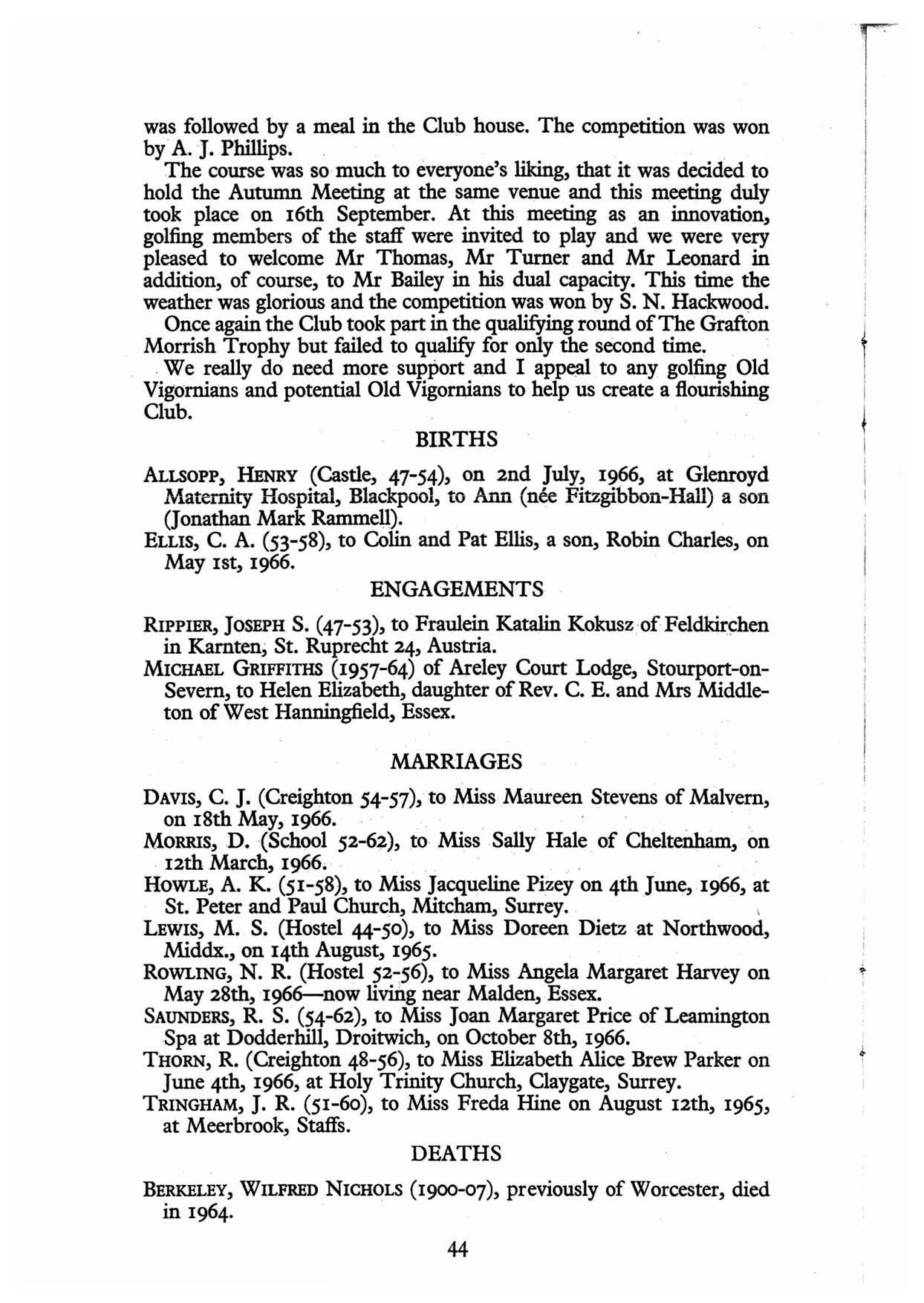
was followed by a meal in the Club house. The competition was won by A. J .Phillips.. .
The course was so'much to everyone's liking, that it was decided to hold the Autumn Meeting at the same venue and this meeting duly took place on 16th September. At this meeting as an innovation, golfing members of the staff were invited to play and we were very pleased to welcome Mr Thomas, Mr Turner and Mr Leonard in addition, of course, to Mr Bailey in his dual capacity. This time the weather was glorious and the competition was won by S. N. Hackwood.
Once again the Club took part in the qualifying round of The Grafton Morrish Trophy but failed to qualify for only the second time . We really do need more support and I appeal to any golfing Old
Vigornians and potential Old Vigornians to help us create a flourishing i Club.
ALLSOPP, HENRY (Castle, 47-54), on 2nd July, 1966, at Glenroyd
Maternity Hospital, Blackpool, to Ann (nee Fitzgibbon-Hall) a son
(Jonathan Mark RammeU).
ELLIs, C. A. (53-58), to Colin and Pat Ellis, a son, Robin Charles, on May 1st, 1966.
RIPPIER, JOSEPH S. (47-53), to Fraulein Katalin Kokusz'of Feldkirchen in Karnten; St. Ruprecht 24, Austria.
MICHAEL GRIFFITHS (1957-64) of Areley Court Lodge" Stourport-onSevern, to Helen Elizabeth, daughter of Rev. C. E. and Mrs Middleton of West Hanningfield, Essex.
DAVIS, C. J. (Creighton 54-57), to Miss Maureen Stevens of Malvern, on 18th May, 1966. '. . '.. .
MORRIs,D. (School to Miss Sally Hale of Cheltenham, on . 12th March, 1966. . ..' . . .. ' , .'
HOWLE, A. K. (51-58), to Miss Jacqu;eline Pizey on 4th June, 1966, at St. Peter and Paul Church, Mitcham, Surrey. . \
LEWIS, M. S. (Hostel 44-50), to Miss Doreen Dietzat Northwood, Middx., on 14th August, 1965.
ROWLING, N. R. (Hostel 52-:56), to Miss Angela Margaret Harvey on + May 28th, 1966-now liviD.g near Maiden, Essex.
SAUNDERS, R. S. (54-62), to Miss Joan Margaret Price of Leamington Spa at Dodderhi1l, Droitwich, on October 8th, 1966.
I THORN, R. (Creighton 48-56), to Miss Elizabeth Alice Brew Parker on June 4th, 1966, at Holy Trinity Church, Claygate, Surrey.
TRINGHAM, J. R. (51-60), to Miss Freda Hine on August 12th, 1965, at Meerbrook, Staffs.
BERKELEY, WILFRED NICHOLS (1900-°7), previously of Worcester, died in 1964. .
Ross, BRIG. J. (Castle 1908), died at Kenilworth in the Cape on Nov. 16th, 1965. He was at the King's School from 1908, having been a distinguished Cathedral Chorister. He joined the B.S.A.P. in 1913 and in 1914 they captured the German post of Schuckmansburg in S.W. Africa. He became Assistant Commissioner in 1941 and in 1945 assumed command of the B.S.A.P. as Commissioner. He was awarded King's Police Medal for Distinguished Service in 1945 and in 1947 was appointed a Commander of the Royal Victorian Order and in 1950 awarded the C.B.E. He retired in 1950 after 37 years' service and after a period as B. S.A.P. Recruiting Officer at Rhodesia House, London, returned to Rhodesia as Comptroller of the Governor's Household.
SMITH, ARTHUR P. G. (1895-°3) of Hatton, Warws. (No date of actual death).
TWEEDIE, DR. F. 1. G. (19°7-11), died May 29th, 1965.

ANDERTON, C. W. (Cr. 58-64) is now working in the Southwark Branch of the National Provincial Bank. Won the Bank Chess Championship first go last season and plans to play for the N .P. and Athenaeum Chess Clubs. Hopes to attend the London Dinners.
ANDREWS, R. P. (Castle 54-59) graduated from the University of Wales (Bangor) with his B.Sc. and is now reading for his Ph.D. at Aberdeen. He has now become engaged to Miss Margaret Meering, B.A., of Essex, and their marriage is to take place in April.
ARMSTRONG, D. E. (Choir 54-59). Mter 2 years with Lloyds Bank he left to continue his studies, passed his " A" levels and then read Physics and Maths. with statistics for B.Sc. General at London University. He is now with Vauxhall Motors as a systems analyst in a Manufacturing Systems Division. He is married with one son and living at 20 Porlock Drive, Luton. Any of his contemporaryO.V.'s are welcome visitors.
ATKIN, D. G. (School 54-59), admitted to the Institute of Chartered Accountants in England and Wales as an Associated Member in October, 1965, after serving articles with a firm in Preston. Is now the Assistant Accountant with Messrs Yates Bros. Wine Lodges of Manchester. He was married to Miss Penelope Wheeler of Fulwood, Preston, in April, 1965.
BARRETT, SGT. MAJOR JAMES. Although not a member of the O.V. Club, all members will be interested to learn that in June of this year when the Queen presented the Irish Guards with new Colours, Sgt. Major Barrett was one of the 40 members of the Irish Guards to be chosen to be presented to the Queen, and in the afternoon at a Garden Party in the grounds of the Royal Hospital, Chelsea, he presented his wife to the Queen. He was in the Guards for 22 years, and has lived in Worcester for 19l years, during which time, as we all know, he has been in charge of the Cadets Force of the School. His familiar face will be missed at the School as he retired at the end of the Summer Term.
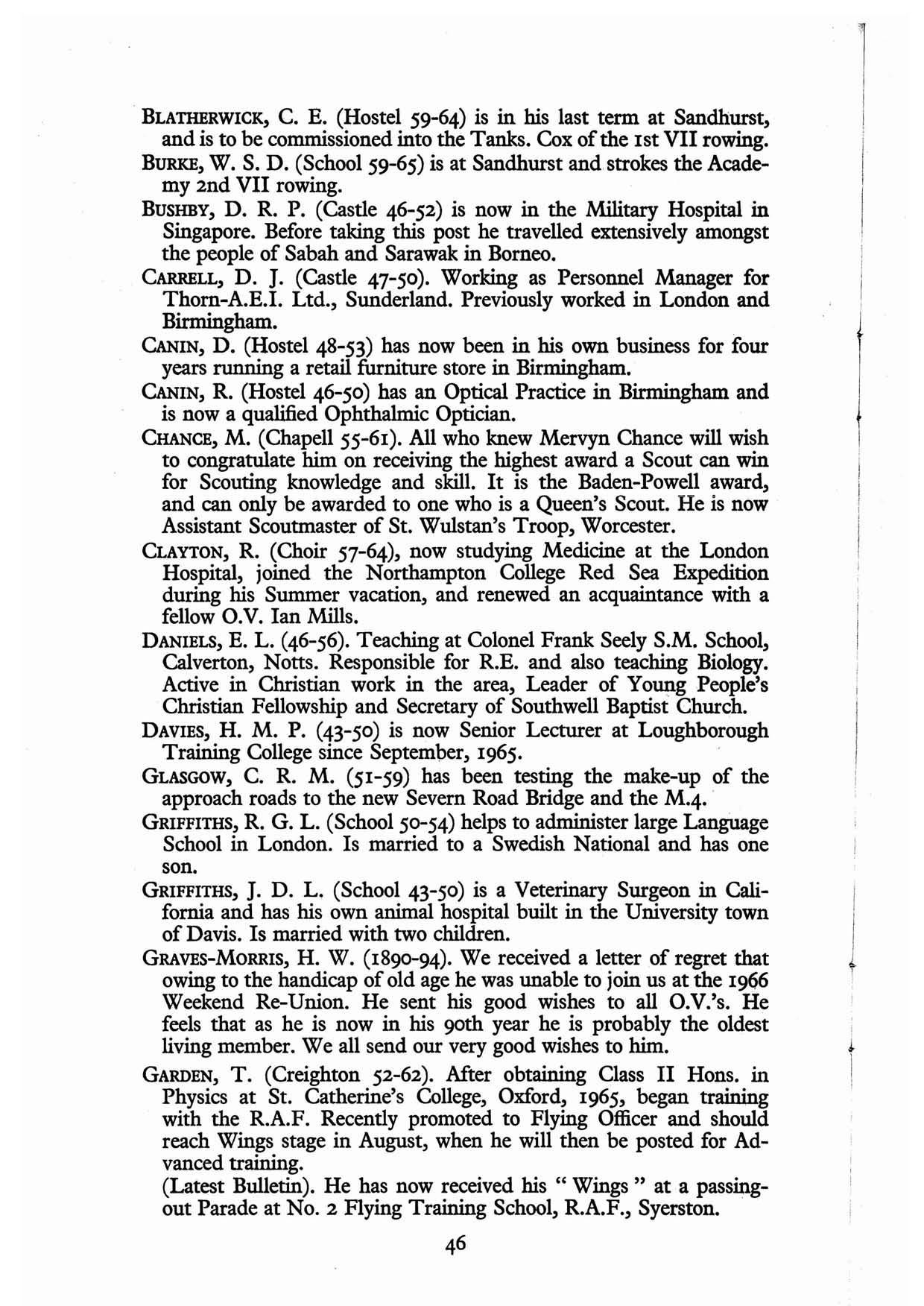
·
BLATHERWICK, C. E. (Hostel 59-64) is in his last term at Sandhurst, and is to be commissioned into the Tanks. Cox of the 1st VII rowing.
BURKE, W. S. D. (School 59-65) is at Sandhurst and strokes the Academy 2nd VII rowing.
BUSHBY, D. R. P. (Castle 46-52) is now in the Military Hospital in Singapore. Before taking this post he travelled extensively amongst the people of Sabah and Sarawak in Borneo.
CARRELL, D. J. (Castle 47-50). Working as Personnel Manager for Thorn-A.E.!. Ltd., Sunderland. Previously worked in London and Birmingham.
CANIN, D. (Hostel 48-53) has now been in his own business for four years running a retail furniture store in Birmingham.
CANIN, R. (Hostel 46-50) has an Optical Practice in Birmingham and is now a qualified Ophthalmic Optician.
CHANCE, M. (Chapell 55-61). All who knew Mervyn Chance will wish to congratulate him on receiving the highest award a Scout can win for Scouting knowledge and skill. It is the Baden-Powell award, and can only be awarded to one who is a Queen's Scout. He is now Assistant Scoutmaster of St. Wulstan's Troop, Worcester.
CLAYTON, R. (Choir 57-64), now studying Medicine at the London Hospital, joined the Northampton College Red Sea Expedition during his Summer vacation, and renewed an acquaintance with a fellow O.V. lan Mills.
DANIELS, E. L. (46-56). Teaching at Colonel Frank Seely S.M. School, Calverton, Notts. Responsible for R.E. and also teaching Biology. Active in Christian work in the area, Leader of Y Christian Fellowship and Secretary of Southwell Baptist Church.
DAVIES, H. M. P. (43-50) is now Senior Lecturer at Loughborough Training College since September, 1965. '
GLASGOW, C. R. M. (51-59) has been testing the make-up of the approach roads to the new Severn Road Bridge and the M.4 ..
GRIFFITHS, R. G. L. (School 50-54) helps to administer large Language School in London. Is married to a Swedish National and has one son.
GRIFFITHS, J. D. L. (School 43-50) is a Veterinary Surgeon in California and has his own animal hospital built in the University town of Davis. Is married with two children.
GRAVES-MORRIS, H. W. (1890-94). We received a letter of regret that owing to the handicap of old age he was unable to join us at the 1966 Weekend Re-Union. He sent his good wishes to all O.V.'s. ae feels that as he is now in his 90th year he is probably the oldest living member. We all send our very good wishes to him.
GARDEN, T. (Creighton 52-62). Mter obtaining Class 11 Hons. in Physics at St. Catherine's College, Oxford, 1965, began training with the R.A.F. Recently promoted to Flying Officer and should reach Wings stage in August, when he will then be posted for Advanced training.
(Latest Bulletin). He has now received his " Wings" at a passingout Parade at No. 2 Flying Training School, R.A.F., Syerston. .
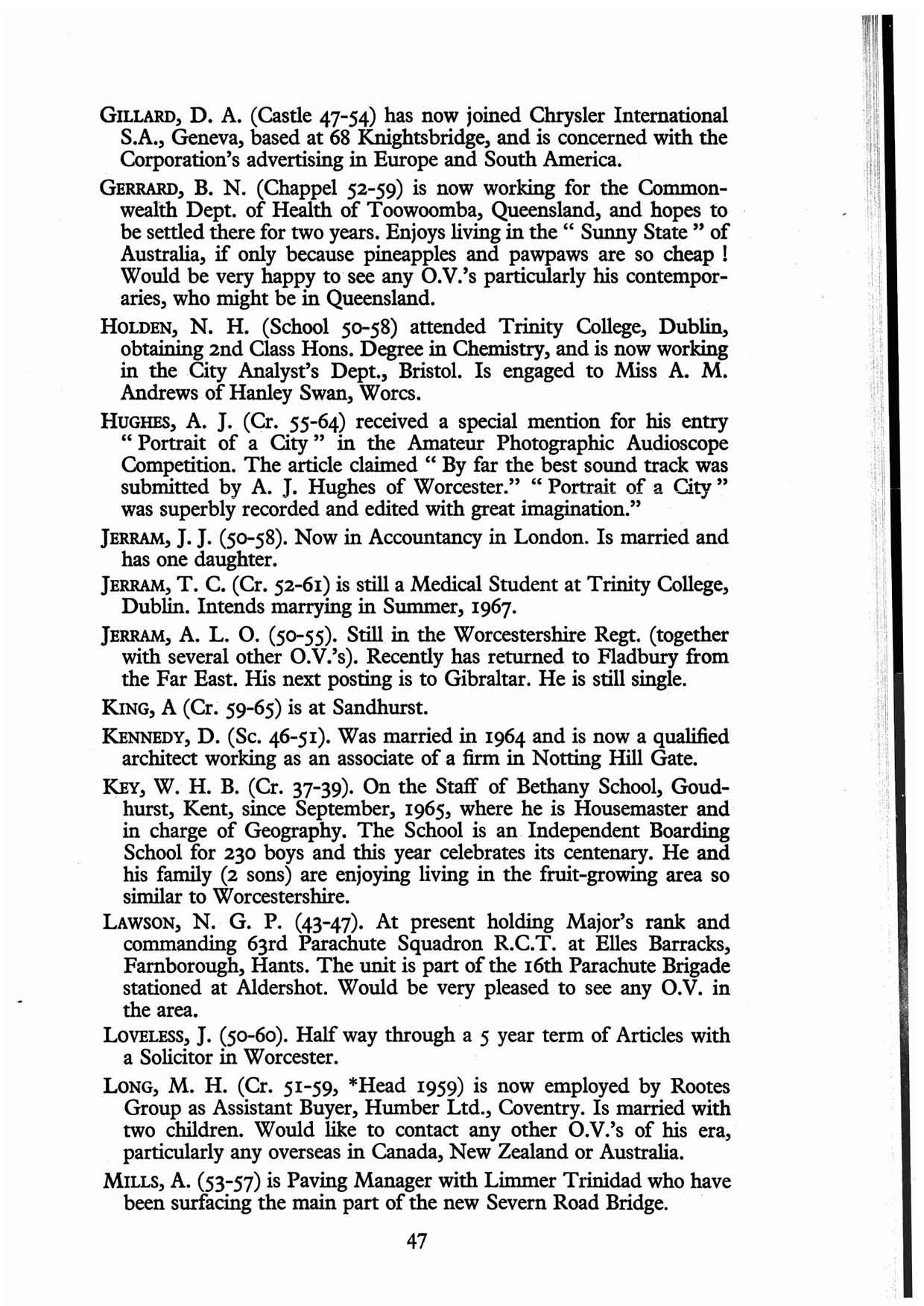
GILLARD, D. A. (Castle 47-54) has now joined Chrysler International S.A., Geneva, based at 68 Knightsbridge, and is concerned with the Corporation's advertising in Europe and South America.
GERRARD, B. N. (Chappel 52-59) is now working for the Commonwealth Dept. of Health of Toowoomba, Queensland, and hopes to be settled there for two years. Enjoys living in the " Sunny State " of Australia, if only because pineapples and pawpaws are so cheap ! Would be very happy to see any O.V.'s particularly his contemporaries, who might be in Queensland.
HOLDEN, N. H. (School 50-58) attended Trinity College, Dublin, obtaining 2nd Class Hons. Degree in Chemistry, and is now working in the City Analyst's Dept., Bristol. Is engaged to Miss A. M. Andrews. of Hanley Swan, Wores.
HUGHES, A. J. (Cr. 55-64) received a special mention for his entry "Portrait of a City" in the Amateur Photographic Audioscope Competition. The article claimed " By far the best sound track was submitted by A. J. Hughes of Worcester." "Portrait of a City" was superbly recorded and· edited with great imagination."
JERRAM, J. J. (50-58). Now in Accountancy in London. Is married and has one daughter.
JERRAM, T. C. (Cr. 52-61) is still a Medical Student at Trinity College, Dublin. Intends marrying in Summer, 1967.
JERRAM, A. L. O. (50-55). Still in the Worcestershire Regt. (together with several other O.V.'s). Recently has returned to Fladbury from the Far East. His next posting is to Gibraltar. He is still single.
KING, A (Cr. 59-65) is at Sandhurst.
KENNEDY, D. (Se. 46-51). Was married in 1964 and is now a qualified architect working as an associate of a firm in Notting Hill Gate.
KEY, W. H. B. (Cr. 37-39). On the Staff of Bethany School, Goud hurst, Kent, since September, 1965, where he is Housemaster and in charge of Geography. The School is an. Independent Boarding School for 230 boys and this year celebrates its centenary. He and his family (2 sons) are enjoying living in the fruit-growing area so similar to Worcestershire.
LAWSON, N. G. P. (43-47). At present holding Major's rank and commanding 63rd Parachute Squadron R.C.T. at Elles Barracks, Farnborough, Hants. The unit is part of the 16th Parachute Brigade stationed at Aldershot. Would be very pleased to see any O.V. in the area.
LOVELESS, J. (50-60). Half way through a 5 year term of Articles with a Solicitor in Worcester.
LONG, M. H. (Cr. 51-59, *Head 1959) is now employed by Rootes Group as Assistant Buyer, Humber Ltd., Coventry. Is married with two children. Would like to contact any other O.V.'s of his era, particularly any overseas in Canada, New Zealand or Australia.
MILLS, A. (53-57) is Paving Manager with Limmer Trinidad who have been surfacing the main part of the new Severn Road Bridge.
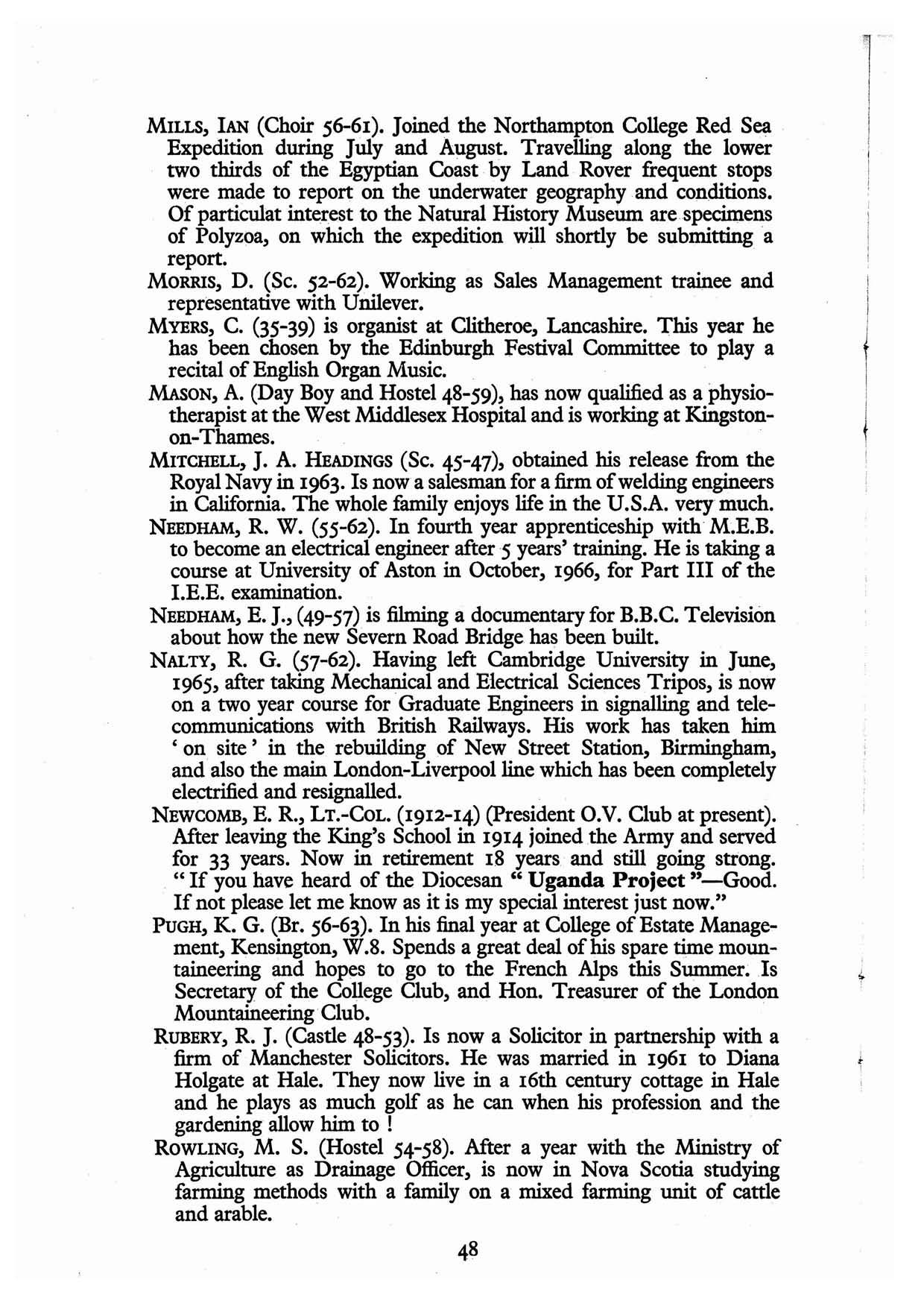
MILLS, IAN (Choir 56-61). Joined the Northampton College Red Sea Expedition during July and August. Travelling along the lower two thirds of the Egyptian Coast by Land Rover frequent stops were made to report on the underwater geography and conditions. Of particulat interest to the Natural History Museum are specimens of Polyzoa, on which the expedition will shortly be submitting a report.
MORRIS, D. (Se. 52-62). Working as Sales Management trainee and representative with Unilever.
MYERS, C. (35-39) is organist at Clitheroe, Lancashire. This year he has been chosen by the Edinburgh Festival Committee to play a recital of English Organ Music.
MAsON, A. (Day Boy and Hostel 48-59), has now qualified as a physiotherapist at the West Middlesex Hospital and is working at Kingstonon-Thames.
MITCHELL, J. A. HEADINGS (Se. 45-47), obtained his release from the Royal Navy in 1963. Is now a salesman for a firm of welding engineers in California. The whole family enjoys life in the U.S.A. very much.
NEEDHAM, R. W. (55-62). In fourth year apprenticeship with M.E.B. to become an electrical engineer after 5 years' training. He is taking a course at University of Aston in October, 1966, for Part III of the LE.E. examination.
NEEDHAM, E. J., (49-57) is filming a documentary for B.B.C. Television about how the new Severn Road Bridge has been built.
NALTY, R. G. (57-62). Having left Cambridge University in June, 1965, after taking Mechanical and Electrical Sciences Tripos, is now on a two year course for Graduate Engineers in signalling and telecommunications with British Railways. His work has taken him 'on site' in the rebuilding of New Street Station, Birmingham, and also the main London-Liverpool line which has been completely electrified and resignalled.
NEWCOMB, E. R., LT.-COL. (1912-14) (president O.V. Club at present). Mter leaving the King's School in 1914 joined the Army and served for 33 years. Now in retirement 18 years and still going strong. " If you have heard of the Diocesan "Uganda Project "-Good. If not please let me know as it is my special interest just now."
PUGH, K. G. (Br. 56-63). In his final year at College of Estate Management, Kensington, W.8. Spends a great deal of his spare time mountaineering and hopes to go to the French Alps this Summer. Is Secretary of the College Club, and Hon. Treasurer of the London Mountaineering Club.
RUBERY, R. J. (Castle 48-53). Is now a Solicitor in partnership with a firm of Manchester Solicitors. He was married in 1961 to Diana Holgate at Hale. They now live in a 16th century cottage in Hale and he plays as much golf as he can when his profession and the gardening allow him to !
ROWLING, M. S. (Hostel 54-58). Mter a year with the Ministry of Agriculture as Drainage Officer, is now in Nova Scotia studying farming methods with a family on a mixed farming unit of cattle and arable.
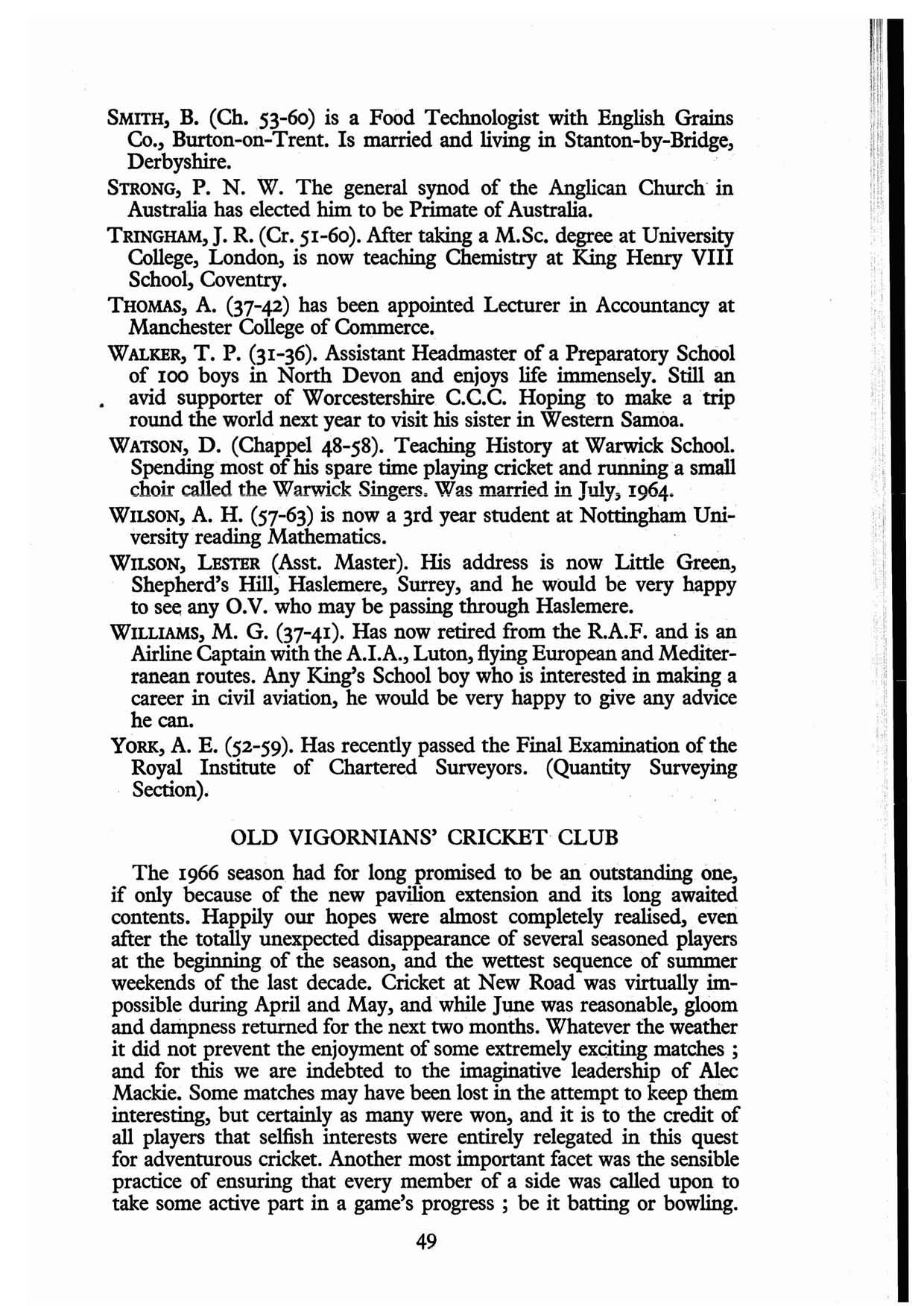
SMITH, B. (Ch. 53-60) is a Food Technologist with English Grains Co., Burton-on-Trent. Is married and living in Stanton-by-Bridge, Derbyshire.
STRONG, P. N. W. The general synod of the Anglican Church" in Australia has elected him to be Primate of Australia.
TRINGHAM, J. R. (Cr. 51-60). After taking a M.Sc. degree at University College, London, is now teaching Chemistry at King Henry VIII School, Coventry.
THOMAS, A. (37-42) has been appointed Lecturer in Accountancy at Manchester College of Commerce.
WALKER, T. P. (31-36). Assistant Headmaster of a Preparatory School of 100 boys in North Devon and enjoys life immensely. Still an avid supporter of Worcestershire C.C.C. Hoping to make a trip round the world next year to visit his sister in Westem Samoa.
WATSON, D. (Chappel 48-58). Teaching History at Warwick School. Spending most of his spare time playing cricket and running "a small choir called the Warwick Singers. Was married in !964
WILSON, A. H. (57-63) is now a 3rd year student at Nottingham Uni;. versity reading Mathematics.
WILSON, LESTER (Asst. Master). His address is now Little Green" Shepherd's Hill, Haslemere, Surrey, and he would be very happy to see any O.V. who may be passing through Haslemere.
WILLIAMS, M. G. (37-41). Has now retired from the R.A.F. and is an Airline Captain with the A.I.A., Luton, flying European and Mediterranean routes. Any King's School boy who is interested in making" a career in civil aviation, he would be very happy to give any advice he can.
YORK, A. E. (52-59). Has recendypassed the Final Examination of the Royal Institute of Chartered Surveyors. (Quantity Surveying Section).
The 1966 season had for long promised to be an outstanding one, if only because of the new pavilion extension and its long awaited contents. Happily our hopes were almost completely realised, even after the totally unexpected disappearance of several seasoned players at the beginning of the season, and the wettest sequence of summer weekends of the last decade. Cricket at New Road was virtually impossible during April and May, and while June was reasonable, gloom and dampness returned for the next two months. Whatever the weather it did not prevent the enjoyment of some extremely exciting matches ; and for this we are indebted to the imaginative leadership of Alec Mackie. Some matches may have been lost in the attempt to keep them interesting, but certainly as many were won, and it is to the credit of all players that selfish interests were entirely relegated in this quest for adventurous cricket. Another most important facet was the sensible practice of ensuring that every member of a side was called upon to take some active part in a game's progress ; be it batting or bowling.
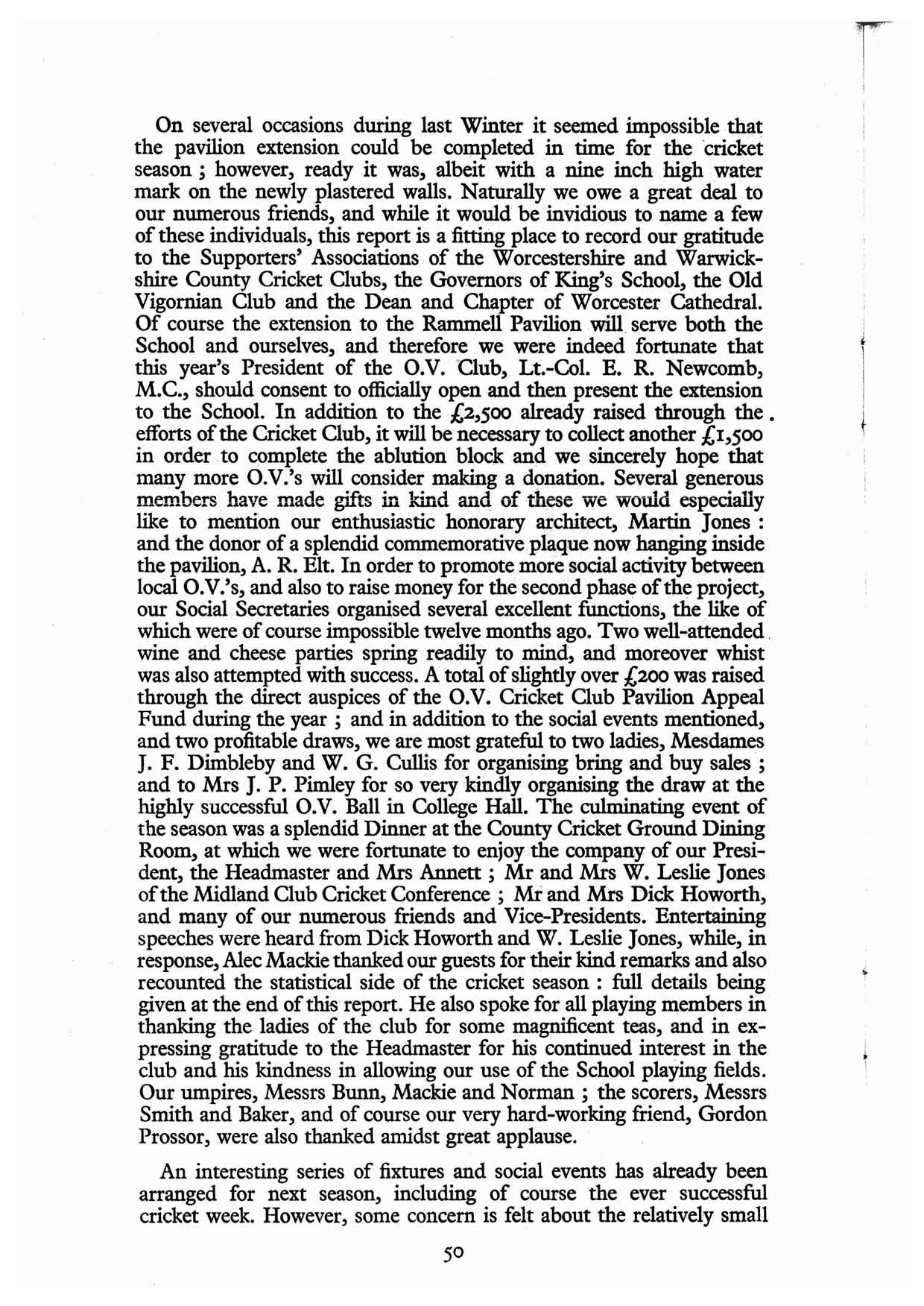
On several occasions during last Winter it seemed the pavilion extension could be cOIJlpleted ,in time for the 'cricket season ; however, ready it was, albeit with a nine inch. high water mark on the newly plastered walls. Naturally we owe a great deal to our numerous friends, and while it would be··invidious to name a few of these individuals, this report is a fitting place to record our gratitude to the Supporters' Associations of the Worcestershire and Warwickshire County Cricket Clubs, the Governors of King's School, the Old Vigornian Club and the Dean and Chapter of Worcester Cathedral. Of course the extension to the Rammell Pavilion will. serve both the School and ourselves, and therefore we were indeed fortunate that this year's President of the O.V. Club, Lt.-Col. E. R. Newcomb, M.C., should consent to officially open and then present the extension to the School. In addition to the £2,500 already raised through the. efforts of the Cricket Club, it will be necessary to collect another £1,500 in order. to complete the ablution block and we sincerely hope that many more O.V.'s will consider making a donation. Several generous members have made gi..fts in kind and of these we would especially like to mention our enthusiastic honorary aJ;chitect, Martin J ones : and the donor of a splendid commemorative·plaque now hanging inside the pavilion, A. R. Elt. In order to promote more social activity local O.V.'s, and also to raise money for the second of the project, our Social Secretaries organised several functions, the .like of which were of course impossible twelve months ago. Two well.;.attended wine and cheese parties spring readily to mind, and moreover whist was also attempted with success. A total of slightly over £200 was raised through the direct auspices of the O.V. Cricket Club Pavilion Appeal Fund during the year ; and in addition to the social events mentioned, and two profitable draws, we are most grateful to two ladies, Mesdames J. F. Dimbleby and W. G. Cullis for organising bring and buy sales ; and to Mrs J. P. Pimley for so very kindly organising the draw at the highly successful O.V. Ball in College Hall. The culminating event of the season was a splendid Dinner at the County Cricket Ground Dining Room, at which we were fortunate to enjoy.the company of our President, the Headmaster and Mrs Annett ; Mr and Mrs W. Leslie J ones of the Midland Club Cricket Conference; Mi and Mrs Dick Howorth, and many of our numerous friends and Vice-Presidents. Entertaining speeches were heard from Dick Howorth and W. Leslie Jones, while, in response, Alec Mackie thanked our guests for their kind remarks and also recounted the statistical side of the cricket season : full details being given at the end of this report. He also spoke for all playing members in thanking the ladies of the club for some magnificent teas, and in expressing gratitude to the Headmaster for his continued interest in the club and his kindness in allowing our use of the School playing fields. Our umpires, Messrs Bunn, Mackie and Norman; the scorers, Messrs Smith and Baker, and of course our very hard-working friend, Gordon Prossor, were also thanked amidst great applause.
An interesting series of fixtures and social events has already been arranged for next season, including of course the ever successful cricket week. However, some concern is felt about the relatively small
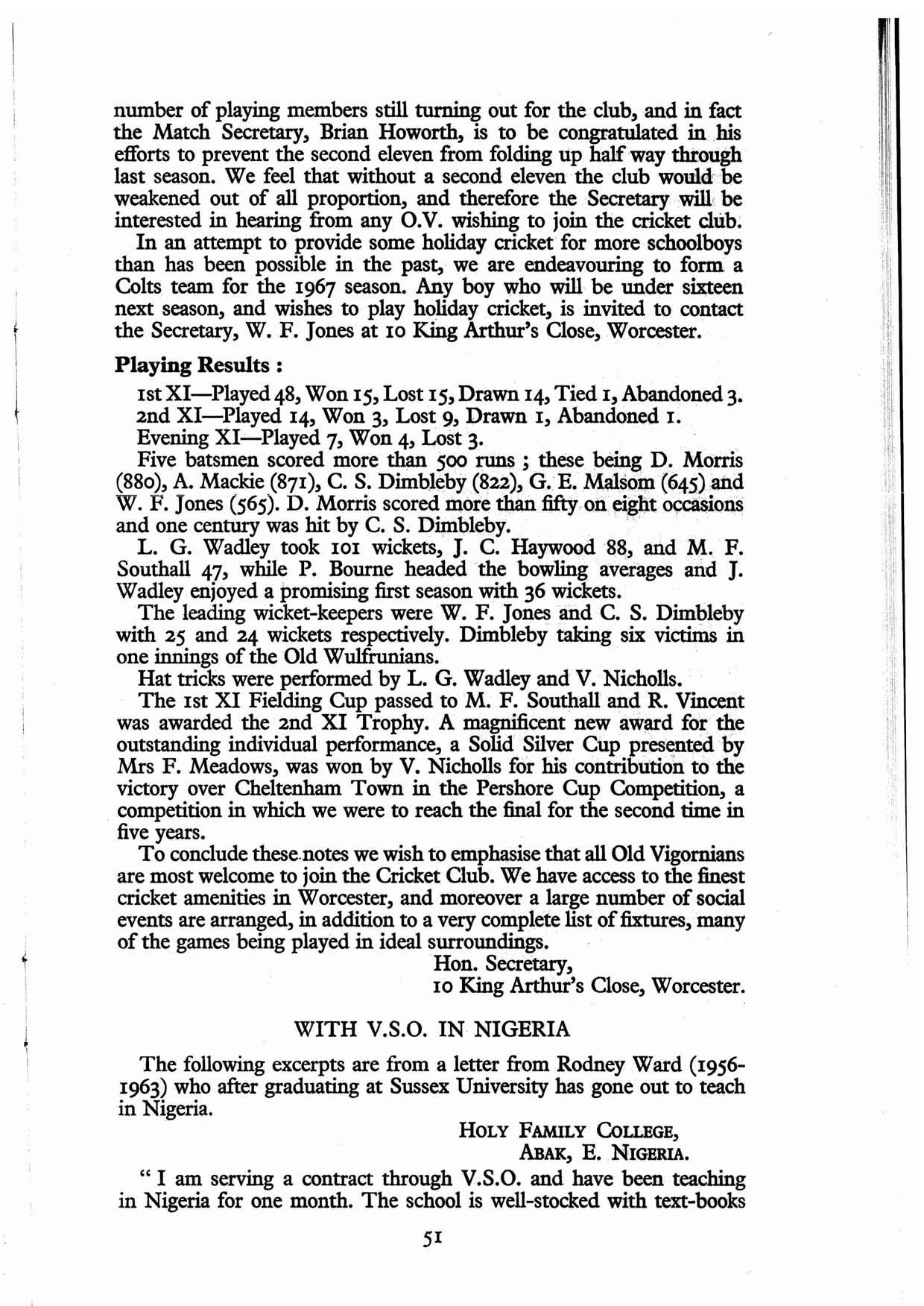
number of playing members still turning out for the' club, and in fact the Match Secretary, Brian Howorth, is to be congratulated in his efforts to prevent the second eleven from folding up halfway through last season. We feel that without a second eleven the club would::"be weakened out of all proportion, and therefore theSecretarywill( be interested in hearing from any O.V. wishing to join the cricket
In an attempt to provide some holiday cricket for moreschoolbQys than has been possible in the past, we are" endeavouring to form, a Colts team for the 1967 season. Any boy who will be under next season, and wishes to play holiday cricket, is invited to contact
the Secretary, W. F. Jones at 10 King Arthur's Close, Worcester.
1st XI-Played 48, Won 15, Lost 15, Drawn 14, Tied I, Abandoned 3.
2nd XI-Played 14, Won 3, Lost 9, Drawn I, Abandoned I.
Evening XI-Played 7, Won 4, Lost 3.
Five batsmen scored more than 500 ,runs,; these being, D. Morris (880), A. Mackie (871), C. S. G. E. MatsQt)J. (64S):an,d W. F. lones (565). D. Morris scored Dlore and one century was hit by C. S. Diptbleby. ","
L. G. Wadley took 101 wickets, J. C. HaywoodaS, alid M. F. Southall 47, while P. Bourne headed 'the bowling averages and J. Wadley enjoyed a promising first season with 36 wickets.
The leading wicket-keepers wereW. F. Jones S. with 25 and 24 wickets respectively. Dimbleby taking six victims in one innings of the Old Wulfrunians.
Hat tricks were performed by L. G. Wadley and V. Nicholls. '
The 1st XI Fielding Cup passed to M. F. Southall and R. Vincent was awarded the 2nd XI Trophy. A magnificent new fori'th.e outstanding individual performance, a Solid Silver Cup
Mrs F. Meadows, was won by V. Nicholls for his contributioh to the
victory over Cheltenham Town in the Pershore Cup Competition, a competition in which we were to reach the final for the second time in five years.
To conclude these.notes we wish to emphasise that all Old Vigornians are most welcome to join the Cricket Club. We have access to the finest cricket amenities in Worcester, and moreover a large number of social events are arranged, in addition to a very complete list of fixtures,many of the games being played in ideal surroundings.
Hon. Secretary, 10 King Arthur's Close, Worcester.
The following excerpts are from a letter from Rodney Ward (19561963) who after graduating at Sussex University has gone out to teach in Nigeria.
FAMILY CoLLEGE, ABAK, E. NIGERIA.
" I am serving a contract through V.S.O. and have been teaching in Nigeria for one month. The school is well-stocked with text-books
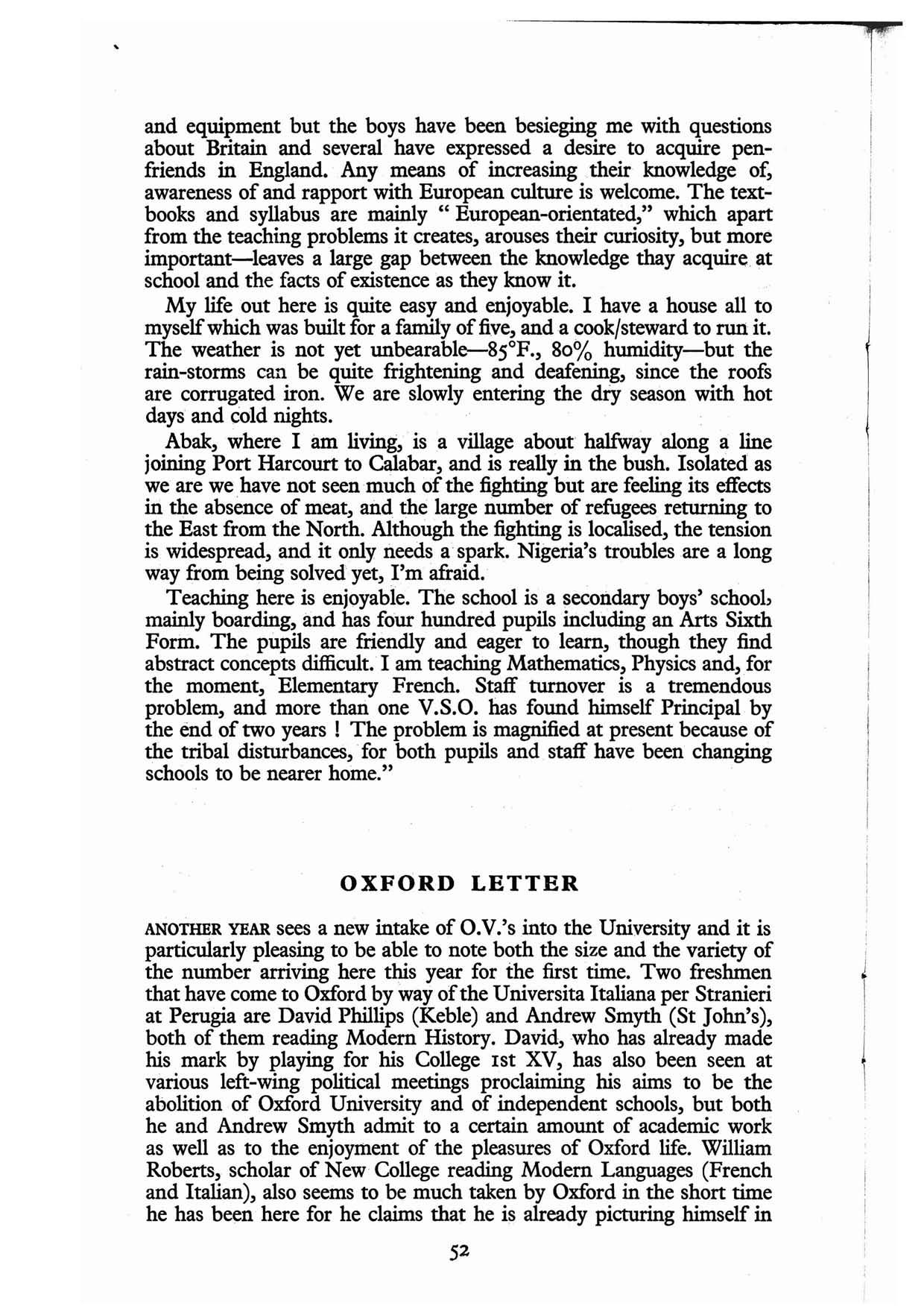
and equipment but the boys have been besieging me with questions about Britain and several have expressed a desire to acquire penfriends in England. Any means of increasing .. their knowledge of, awareness of and rapport with European culture is welcome. The textbooks and syllabus are mainly "European-orientated," which apart from the teaching problems it creates, arouses their curiosity, but more important-leaves a large gap between the knowledge thay acquire at school and the facts of existence as they know it.
My life out here is quite easy and enjoyable. I have a house all to myself which was built for a family of five, and a cook/steward to run it. The weather is not yet unbearable-85°F., 80% humidity-but the rain-storms can be quite frightening and deafening, since the roofs are corrugated iron. We are slowly entering the dry season with hot days and cold nights.
Abak, where I am living, is a village about halfway along a line joining Port Harcourt to Calabar, and is really in the bush. Isolated as we are we.have not seen·much of the fighting but are feeling itseffeets in the absence of meat, and the large number of refugees returning to the East from the North. Although the fighting is localised, the tension is widespread, and it only needs a· spark. Nigeria's troubles are a long way from being solved yet, I'm afraid.·
Teaching here is enjoyable. The school is a secondary boys' school, mainly boarding, and has four hundred pupils including an Arts Sixth Form. The pupils are friendly and eager to learn, though they find abstract concepts difficult. I am teaching Mathematics, Physics and,.for the moment, Elementary French. Staff turnover is a tremendous problem, and more than one V.S.O. has found himself Principal by the end of two years ! The problem is magnified at present because of the tribal disturbances, for both pupils and staff have been changing schools to be nearer home."
ANOTHER YEAR sees a new intake of O.V.'s into the University and it is particularly pleasing to be able to note both the size and the variety of the number arriving here this year for the first time. Two freshmen that have come to Oxford by way of the Universita Italiana per Stranieri at Perugia are David Phillips (Keble) and Andrew Smyth (St John's), both of them reading Modem History. David, who has already made his mark by playing for his College 1st XV, has also been seen at various left-wing political meetings proclaiming his aims to be the abolition of Oxford University and of independent schools, but both he and Andrew Smyth admit to a certain amount of academic work as well as to the enjoyItlent of the pleasures of Oxford life. William Roberts, scholar of New· College reading Modem Languages (French and Italian), also seems to be much taken by Oxford in the short time he has been· here for he claims that he is already picturing himself in
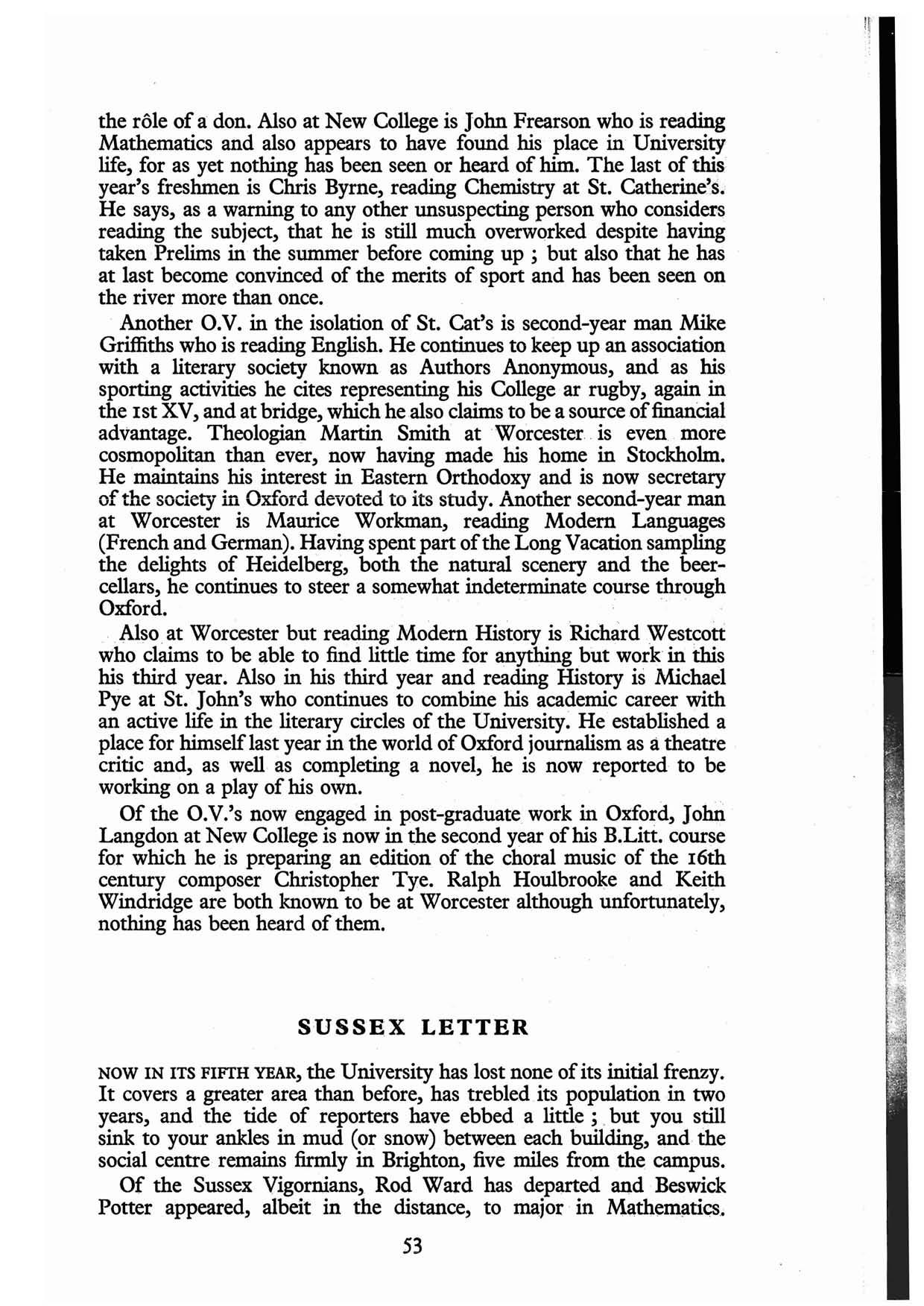
the role of a don. Also at New College is John Frearson who is reading Mathematics and also appears to have found his' place in University life, for as yet nothing has been seen or heard of him. The last of this, year's freshmen is Chris Byrne, reading Chemistry at St. Catherine':s. He says, as a warning to any other unsuspecting person who considers reading the subject, that he is still much overworked despite having taken· Prelims in the summer before coming up ; but also that he has at last become convinced of the merits of sport and has been seen on the river more than once.
Another O.V. in the isolation of St. Cat's is second-year man Mike Griffiths who is reading English. He continues to keep up an association with a literary society known as Authors Anonymous, and as his sporting activities he cites representing his College ar rugby, again in the 1st XV, and at bridge, which he also claims to be a source of financial advantage. Theologian Martin Smith at Worcester. is even more cosmopolitan than ever, now having made his home in Stockholm. He maintains his interest in Eastern Orthodoxy and is now secretary of the society in Oxford devoted to its study. Another second-year man at Worcester is Maurice Workman, reading Modem Languages (French and German). Having spent part of the Long Vacation sampling the delights of Heidelberg, both the natural scenery and the beercellars, he continues to steer a somewhat indeterminate course through Oxford.
Also. at Worcester but reading Modem History is RichardWestcott who claims to be able to find little time for anything but work in this his third year. Also in his third year and reading History is Michae1 Pye at St. John's who continues to combine his academic career with an active life in the literary circles of the University. He established a place for himself last year in the world of Oxford journalism as a theatre critic and, as well as completing a novel, he is now reported to be working on a play of his own.
Of the O.V.'s now engaged in post-graduate work in Oxford, John Langdon at New College is now in the second year of his B.Litt. course for which he is preparing an edition of the choral music of the 16th century composer Christopher Tye. Ralph Houlbrooke and Keith Windridge are both known to be at Worcester although unfortunately, nothing has been heard of them.
NOW IN ITS FIFfH YEAR, the University has lost none of its initial frenzy. It covers a greater area than before, has trebled its population in two years, and the tide of reporters have ebbed a little ; . but you still sink to your ankles in mud (or snow) between each building, and the social centre remains firmly in Brighton, five miles from the campus.
Of the Sussex Vigornians, Rod Ward has departed and Beswick Potter appeared, albeit in the distance, to major in Mathematics;
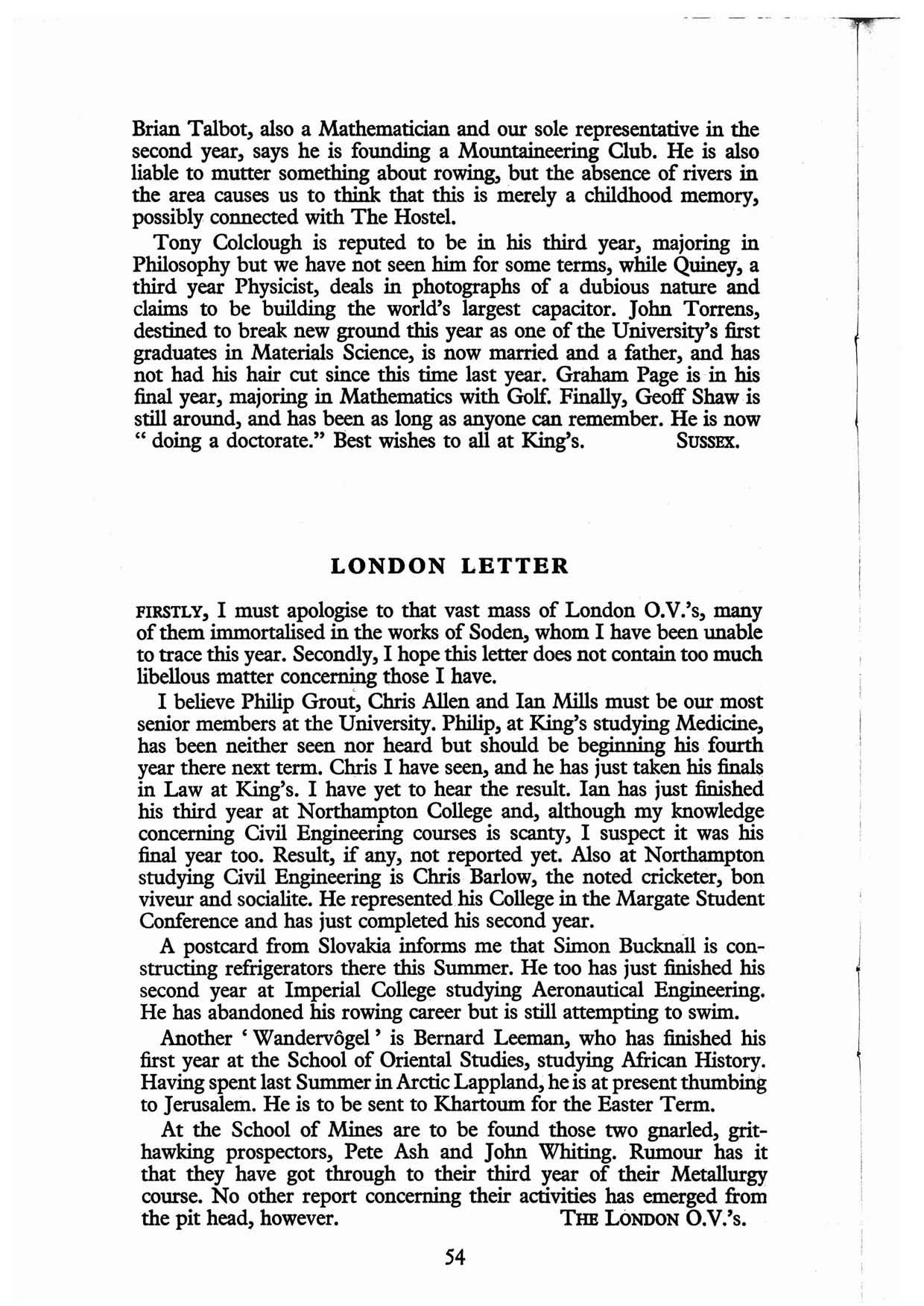
Brian Talbot, also a Mathematician and our sole representative in the second year, says he is founding a Mountaineering Club. He is also liable to mutter something about rowing, but the absence of rivers in the area causes us to think that this is merely a childhood memory, possibly connected with The Hostel.
Tony Colclough is reputed to be in his third year, majoring in Philosophy but we have not seen him for some terms, while Quiney, a third year Physicist, deals in photographs of a dubious nature and claims to be building the world's largest capacitor. John Torrens, destined to break new ground this year as one of the University's first graduates in Materials Science, is now married and a father, and has not had his hair cut since this time last year. Graham Page is in his final year, majoring in Mathematics with Golf. Finally, Geoff Shawis still around, and has been as long as anyone can remember. He is now " doing a doctorate." Best wishes to all at King's. SUSSEX.
FIRSTLY, I must apologise to that vast mass of London O.V.'s, many of them immortalised in the works of Soden, whom I have been unable to trace this year. Secondly, I hope this letter does not contain too much libellous matter concerning those I have.
I believe Philip Groui, Chrls AlIen and lan Mills must be our most senior members at the University. Philip, at King's studying Medicine, has been neither seen nor heard but should be beginning his fourth year there next term. Chris I have seen, and he has just taken his finals. in Law at King's. I have yet to hear the result. lan has just finished his third year at Northampton College and, although my knowledge concerning Civil Engineering courses is scanty, I suspect it was his final year too. Result, if any, not reported yet. Also at Northampton studying Civil Engineering is Chris Barlow, the noted cricketer, bon viveur and socialite. He represented.his College in the Margate Student Conference and has just completed his second year.
A postcard from Slovakia informs me that Simon BucknaIl is constructing refrigerators there this Summer. He too has just finished his second year at Imperial College studying Aeronautical Engineering. He has abandoned his rowing career but is still attempting to swim.
Another 'Wandervogel ' is Bemard Leeman, who has finished his first year at the School of Oriental Studies, studying African History. Having spent last Summer in Arctic Lappland, he is at present thumbing to Jerusalem. He is to be sent to Khartoum for the Easter Term.
At the School of Mines are to be found those two gnarled, grithawking prospectors, Pete Ash and John Whiting. Rumour has it that they have got through to their third year of their Metallurgy course. No other report concerning their activities has emerged from the pit head, however.
THE LONDON O.V/s.
Sir,

The O.V.'s at Keele now number three-Des Ryan, Paul Bunting . and Mike Robinson.Thegeneral public hears very little about· Keele except for the occasional paragraph in the Sunday 'newspapers, and so we thought it would be a good idea to give the true picture.
Keele is unique in that it provides a <;ommon first year for arts science students alike-the somewhat controversial Foundation Y course, consisting of lectures on an extremely wide range of topicS. Until recent cuts in building grants made the provision of further student accommodation impossible it was also unique in being. completely reSidential',for both staff and students. numbers have meant that a small percentage must live off campUS.'
The University is pleasantly situated on an estate of some 6,400 afIes, two miles from Newcastle-under-Lyme. The campus contains (apart from teaching facilities !) student accommodation, the Union building with bar, snack bar, lounges, etc., library, chapel, sports fields and large wooded areas. On the whole very pleasant. " May we' conclude by saying that if anyone who is thinking of coming to Keelecomes up here for an interview, we will be pleased to show him round if we know when to expect him.
Yours, etc., KEELE.
VAN MILDERT COLLEGE, DURHAM.
Dear Sir, . Sat., 5th Nov.
There has been a shortage of O.V.'s in Durham for the last few years, which is surprising for Durham has expanded rapidly in the past two years with two new Colleges founded and the Faculty of Science having· had several new buildings.
We have here five O.V.'s. Peter Clarke, formerly ofCreightonHouse, ha.s just obtained his. Ph.D. at Hull and is Lecturing in Thermodynamics in the newly-foUnded Engineering Science Department. Charles Garland (Wulstan) is in St. Cuthbert's Society studying Arts. He has not been seen much and we must assume he is hibernating and working for his finals. Martin Branch (Wulstan) has just joined Van Mildert College (the newest men's College) and is studying Physics. He also does a little mountaineering. Also in Van Mildert College is Simon Scott (Hostel) who, it is said, ,was with Engineering Science as a subsiduary, but this year has to do them the other way round. Another;ro'Wing O.V. in Durhamis R. H. "Kim" MetcaKe (Hostel) who works in"Banking, rows for Durham City Rowing Club and coaches one of College VIII's.
We hope to see some more O.V.'s here next year to swell the ranks (oarsmen most welcome in Van Mildert 1).
Yours, etc., DUNELM.
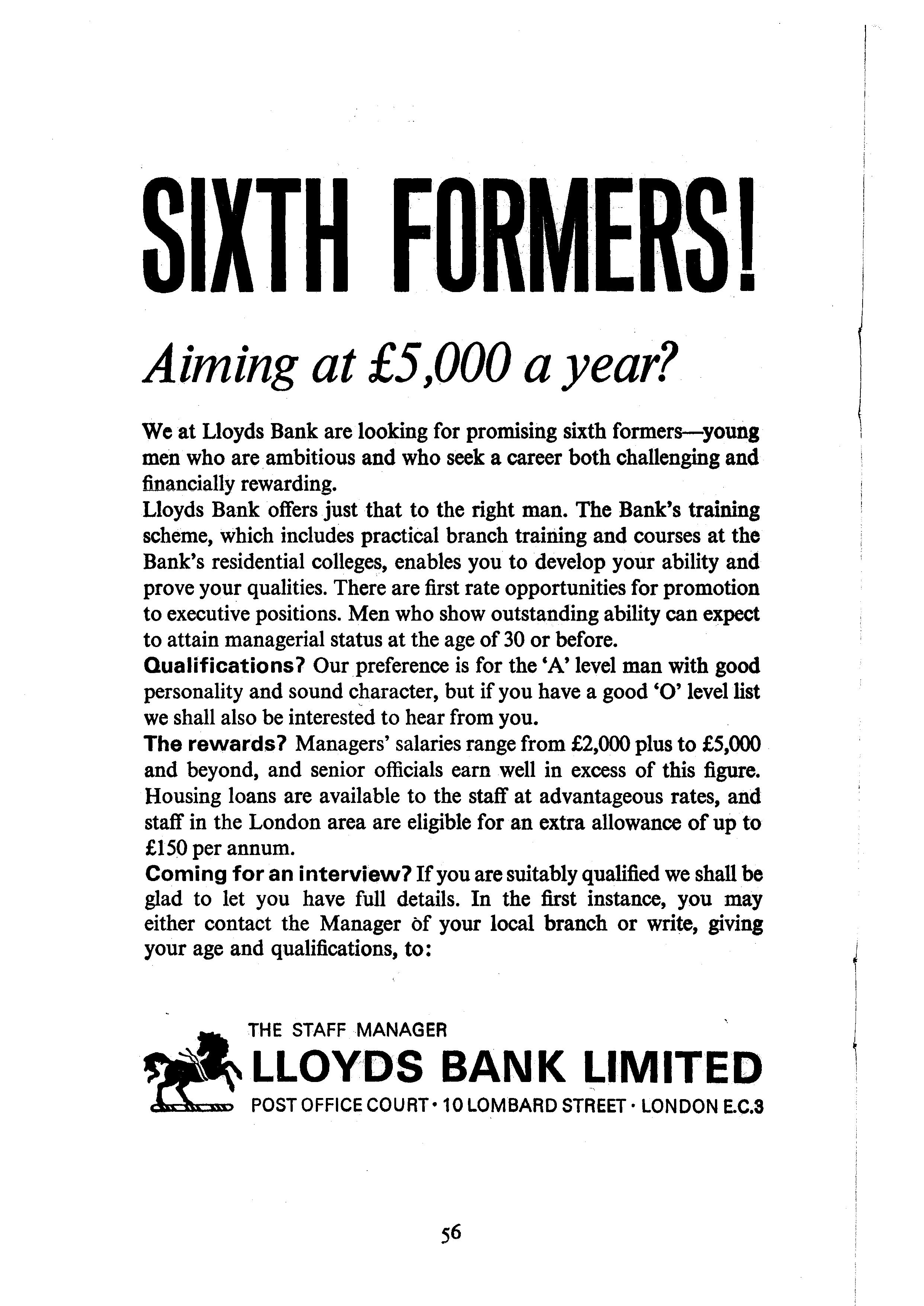
We at Lloyds Bank are looking for promising sixth formers-young men'who are ,ambitious and who seek a career both challenging and financiaIlv rewarding. -." -
Lloyds Ba·nk 'offers just that to the right man. The Bank's training -scheme, which includes practical branch traiIiingand courses at the Bank's residential colleges, enables you to develop your ability and prove your qualities. There are first rate opportunities for promotion to executive positions. Men who show outstanding ability can to attain managerial status at the age of 30 or before.
Qualifications? Our ,preference is for the 'A' level man with good personality and sound c!laracter, but if you have a good '0' level list we shall also be interested to hear from you.
There\Nards 1 Managers' salaries range from £2,000 plus to £5,000and beyond, and senior officials earn -well in excess of this figure. Housing loans are available to the staff at advantageous rates, and staff in the London area are eligible for an extra allowance of up to' £150 per annum.
Coming foran interview? If you are suitably qualified we shall be glad to let you have full details. In the first instance, you may either contact the Manager of your local branch or write, giving your age and qualifications, to:

WE ARE OFFICIAL OUTFITTERS TO MANY UNIVERSITIES, COLLEGES AND SCHOOLS THROUGHOUT THE COUNTRY AND WE ARE PARTICULARLY PLEASED TO INCLUDE AMONG THEM KING'S SCHOOL, WORCESTER
Durham University Shenstone Training -College City of Leeds Training College Carnegie College of Physical Education, etc•
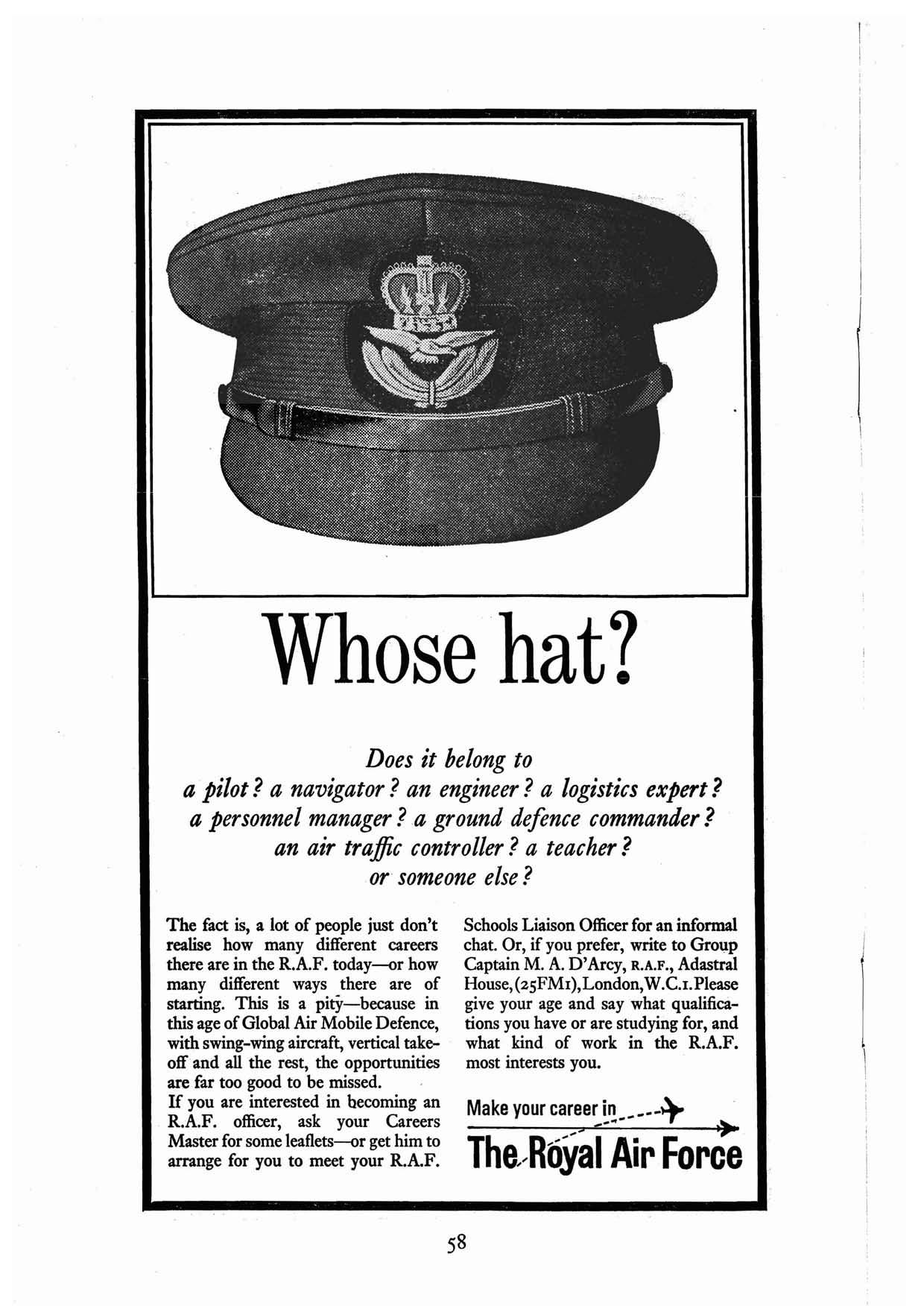
Does it belong to a pilot ? a navigator? an engineer? a logistics expert? a personnel manager ?a ground defence commander? an air traffic controller? a teacher? or someone else?
The fact is, a lot of people just don't Schools Liaison Officer for an informal realise how many different careers chat. Or, if you prefer, write to Gro\lp there are in the R.A.F. today-or how Captain M. A. D' Arcy, R.A.F., Adastral many different ways there are of House, (2SFMI ),London,W. C.I. Please starting. This is a pitY-because in give your age and say what qualificathis age of Global Air Mobile Defence, tions you have or are studying for, and with swing-wing aircraft, vertical take what kind of work in the R.A.F. off and all the rest, the opportunities most interests you. are far too good to be missed. If you are interested in becoming an
Make your career in _---.\... R.A.F. officer, ask your Careers - T ... Master for some leaflets-or get him to arrange for you to meet your R.A.F.

In District Bank we Bet you on the road to a promising career -a career that puts you in the centre of the business life of your community.
We are looking for young men who hold or expect to obtain a good G.C.E., preferably including English and mathematics. Those who join us from the sixth form, with suit able "A" level passes, receive special re cogDition by way of higher commencing salaries. Older applicants, up to age 25, .hould have business experience or qualifi cations such as a University Degree.
We run a comprehensive training scheme for all oUr new entrants. You will be able to attend special courses on practical banking at our Staff Training Centres. H you come straight from school, you will be granted daytime study leave to prepare for the examinations of the Institute of Bankers.
District Bank Club provides a wide range of activities for our staff-football, golf, photography, dramatics and a host of others. There are special benefits, such as help in buying ahouse and a good pension on retirement.
Prospects are good-Branch Managers' salaries range from over £2,000 to around £5,000 and there are opportunities for ad vancement to the higher administrative positions with much greater rewards.
H you want to know more about a career in District Bank, have a word with the manager of your local branch-or write to the Staff Manager, District Bank Limited, Head Office, 17 Spring Gardens, Manchelter2.
Some of our managers are older than David Barber.
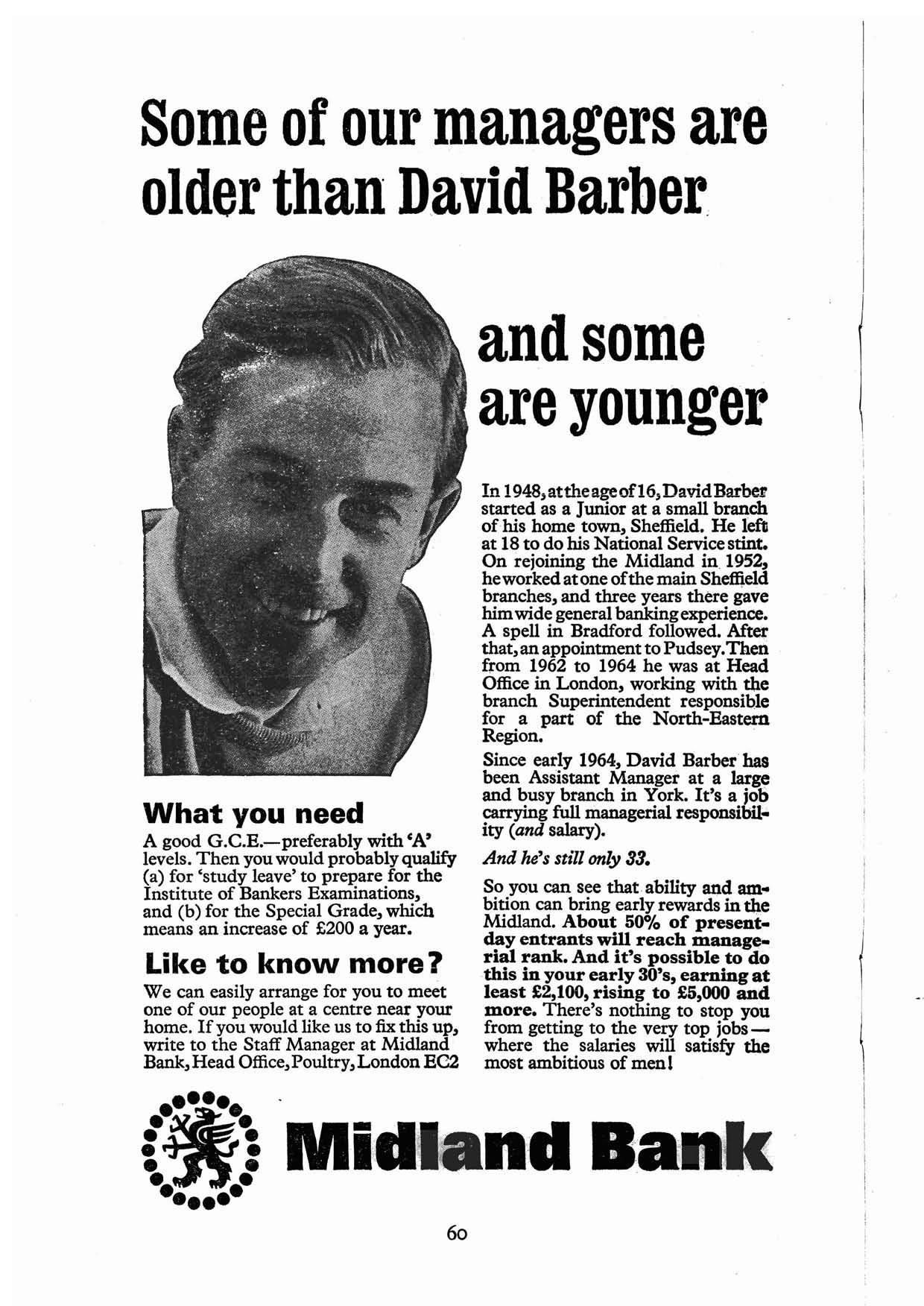
A good G.C.E.-preferably with cA' levels. Then you would probably qualify (a) for 'study leave' to prepare for the Institute of Bankers Examinations, and (b) for the Special Grade, which means an increase of £200 a year.
We can easily arrange for you to meet one of our people at a centre near your home. If you would like us to :fix this up, write to the Staff Manager at Midland Bank, Head Office, Poultry, London EC2
In 1948, at the ageof16, David Barber started as a Junior at a small branch of·his home town, Sheffield. He leti at 18 to do his National Service stint. On rejoining the Midland in 1952, he worked at one of the main Sheffield branches, and three years there gave him wide general banking experience. A spell in Bradford followed. After that, an appointment to Pudsey. Then from 1962 to 1964 he was at Head Office in London, working with the branch Superintendent responsible for a part of the North-Eastern Region.
Since early 1964, David Barber has been Assistant Manager at a large and busy branch in York. It's a job carrying full managerial responsibU" ity (and salary).
And he's still only 33.
So you can see that. ability and am bition can bring early rewards in the Midland. About 50% of presentday entrants will reach managerial rank. And it's possible to do this in your early 30's, earning at least £2,100, rising to £5,000 and more. There's nothing to stop you from getting to the very top jobs-where the salaries will satisfy the most ambitious of men
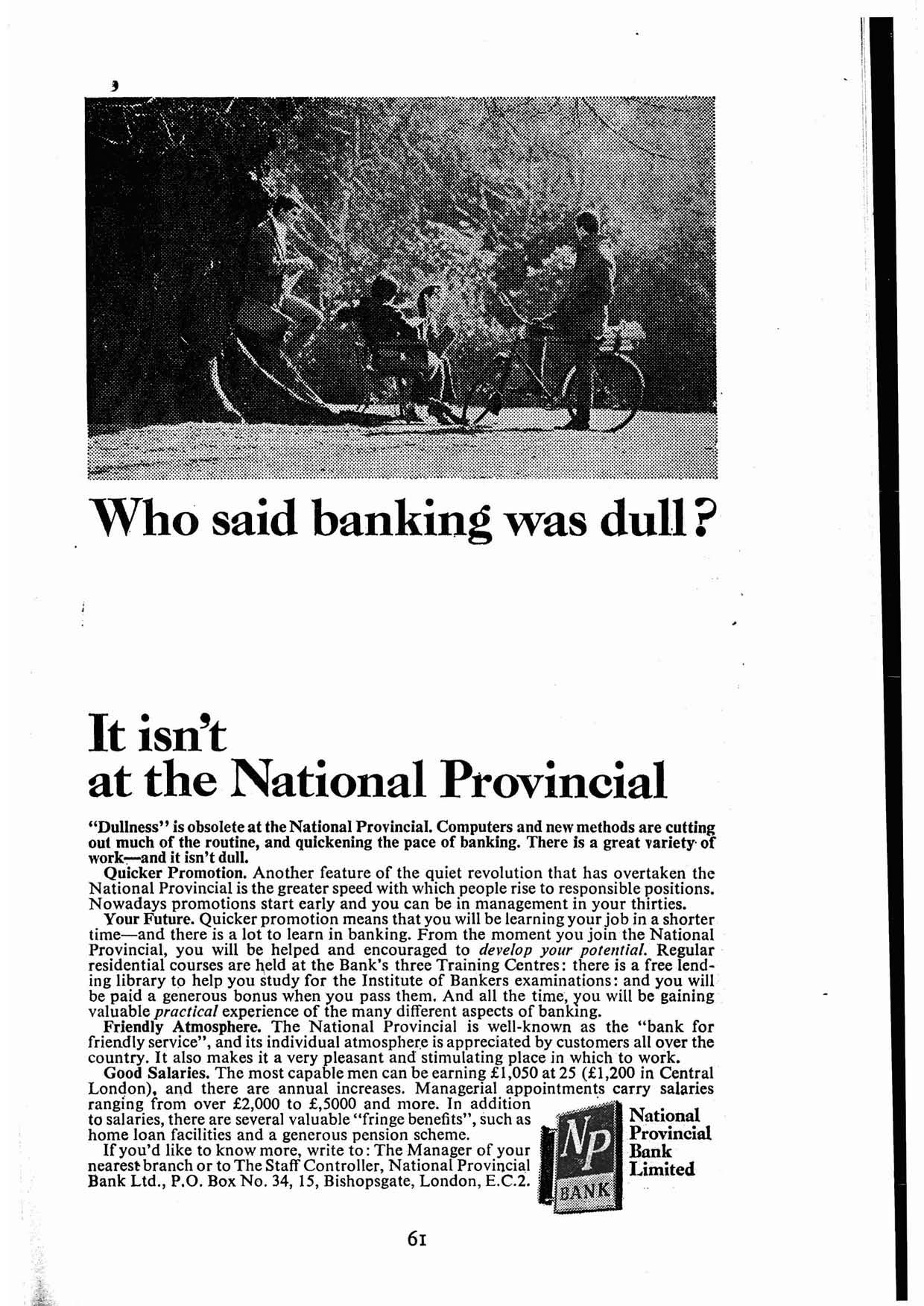
"Dullness" is obsolete at the National Provincial. Computers and new methods are cutting out much of the routine, and quickening the pace of banking. There is a great variety' of work-and it isn't dull.
Qu·icker Promotion. Another feature of the quiet revolution that has overtakenthe National Provincial is the greater speed with which people rise to responsible positions. Nowadays promotions start early and you can be in management in your thirties. Your Future. Quicker promotion means that you will be learning yourjob in a shorter time-and there is a lot to learn in banking. From the moment you join the National Provincial, you will be helped and encouraged to develop your potential. Regular residential courses are h,eld at the Bank's three Training Centres: there is a free lending library t() help you study for the Institute of Bankers examinations: and you will be paid a generous bonus when you pass them. And all the time, you will be gaining valuable practical experience of the many different aspects of bankIng.
Friendly Atmosphere. The National Provincial is well-known as the "bank for friendly service", and its individual atmosphere is appreciated by customers all over the country. It also makes it a very pleasant and stimulating place in which to work. Good Salaries. The most capable men can be earning £1,050 at 25 (£1,200 in Central London), and there are annual increases. Managerial appointments carry salaries ranging from over £2,000 to £,5000 and more. In addition ,,', .. • to salaries, there are several valuable "fringe benefits", such as : Nahonal home loan facilities and a generous pension scheme. Provincial
If you'd like to know more, write to: The Manager of your .• "Bank nearest branch or to The Staff Coo!roller, National ProvinciaJ
Bank Ltd., p.a. Box No. 34, 15, Blshopsgate, London, E.C.2..
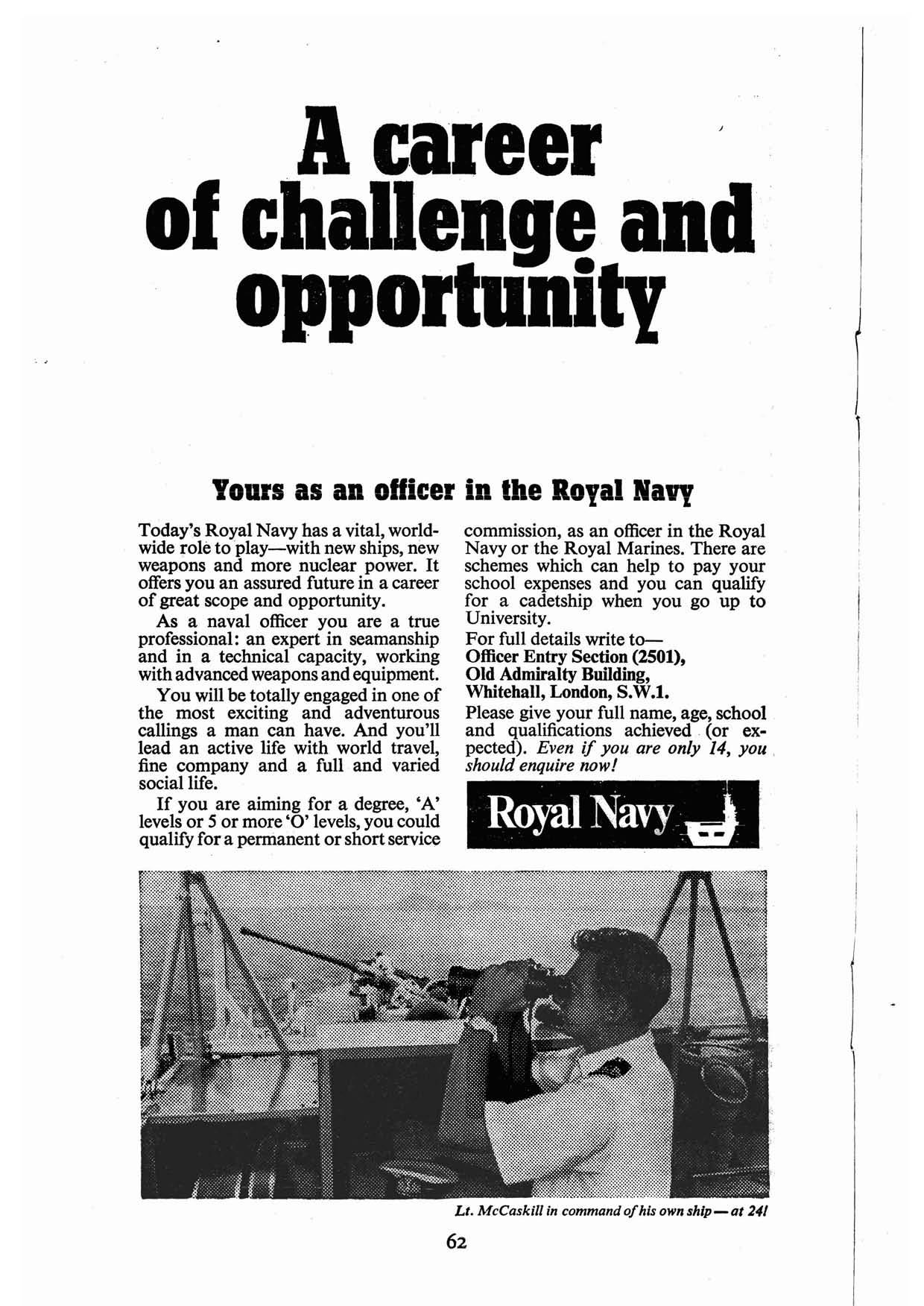
Today's Royal Navy has a vital, worldwide role to play-with new ships, new weapons and more nuclear power. It offers you an assured future in a career of great scope and opportunity.
As a naval officer you are a true professional: an expert in seamanship and in a technical capacity, working with advanced weapons and equipment. You will be totally engaged in one of the most exciting and adventurous callings a man can have. And you'll lead an active life with world travel, fine company and a full and varied social life.
If you are aiming for a degree, 'A' levels or 5 or more '0' levels, you could qualify for a permanent or short service
commission, as an officer in the Royal Navy or the Royal Marines. There are schemes which can help to pay your school expenses and you can qualify for a cadetship when you go up to University.
For full details write toOfficer Entry Section (2501), Old Admiralty Building, Whitehall, London, S.W .1.
Please give your full name, age, school and qualifications achieved. (or expected). Even if you are only 14, you should enquire now!
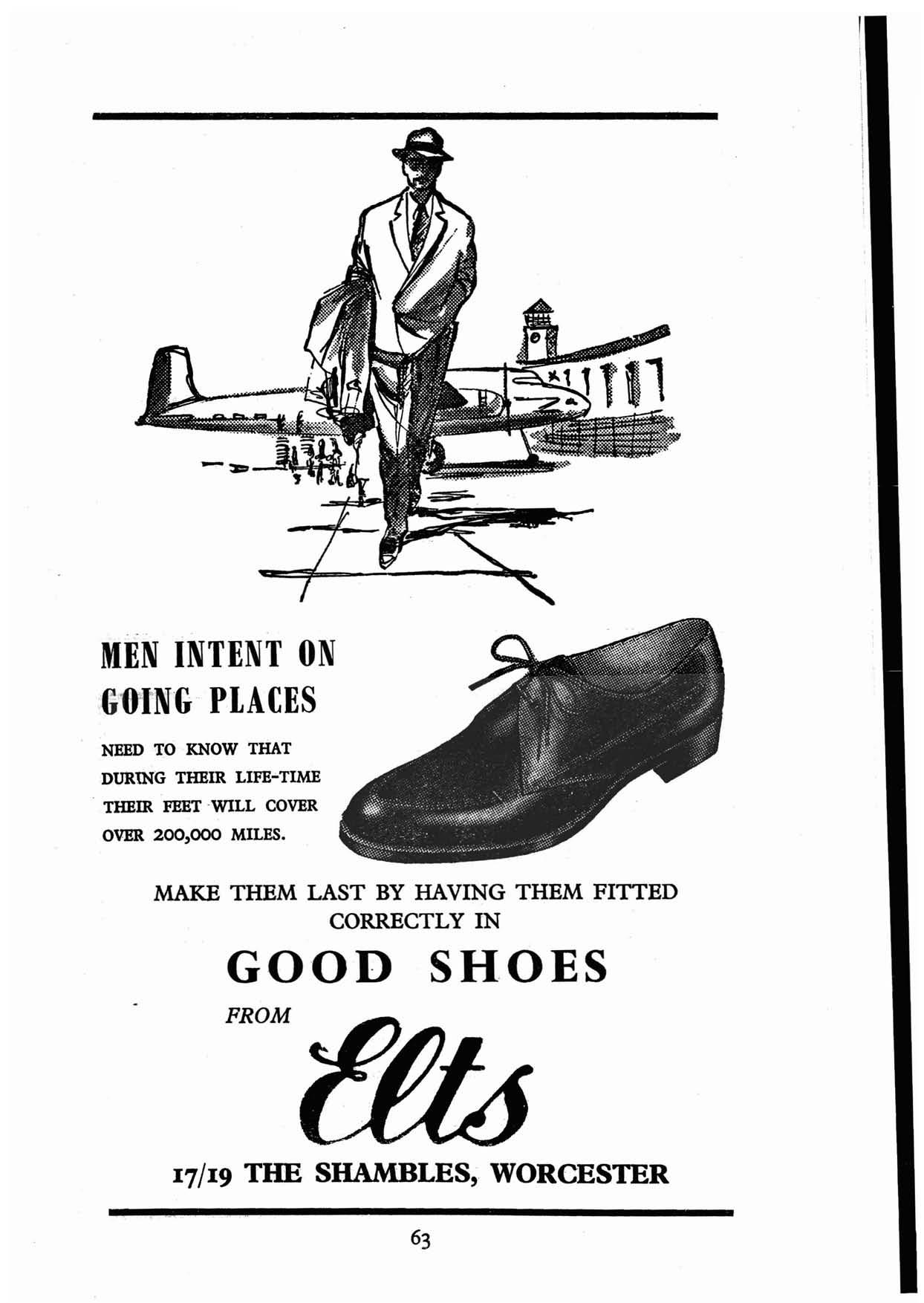
NEED TO KNOW THAT DURING THEIR LIFE-TIME . THEIR FEET -WILL COVER OVER 200,000 MILES.
MAKE THEM LAST BY HAVING THEM FITTED CORRECTLY IN
CLOSE TO KING'S SCHOOL AND CATHEDRAL
AA & RAC GUEST HOUSE
EXCELLENT ACCOMMODATION
Comfortable Lounge and separate TV Room
CAR P ARK ADJACENT
Telephone: Worcester 23721
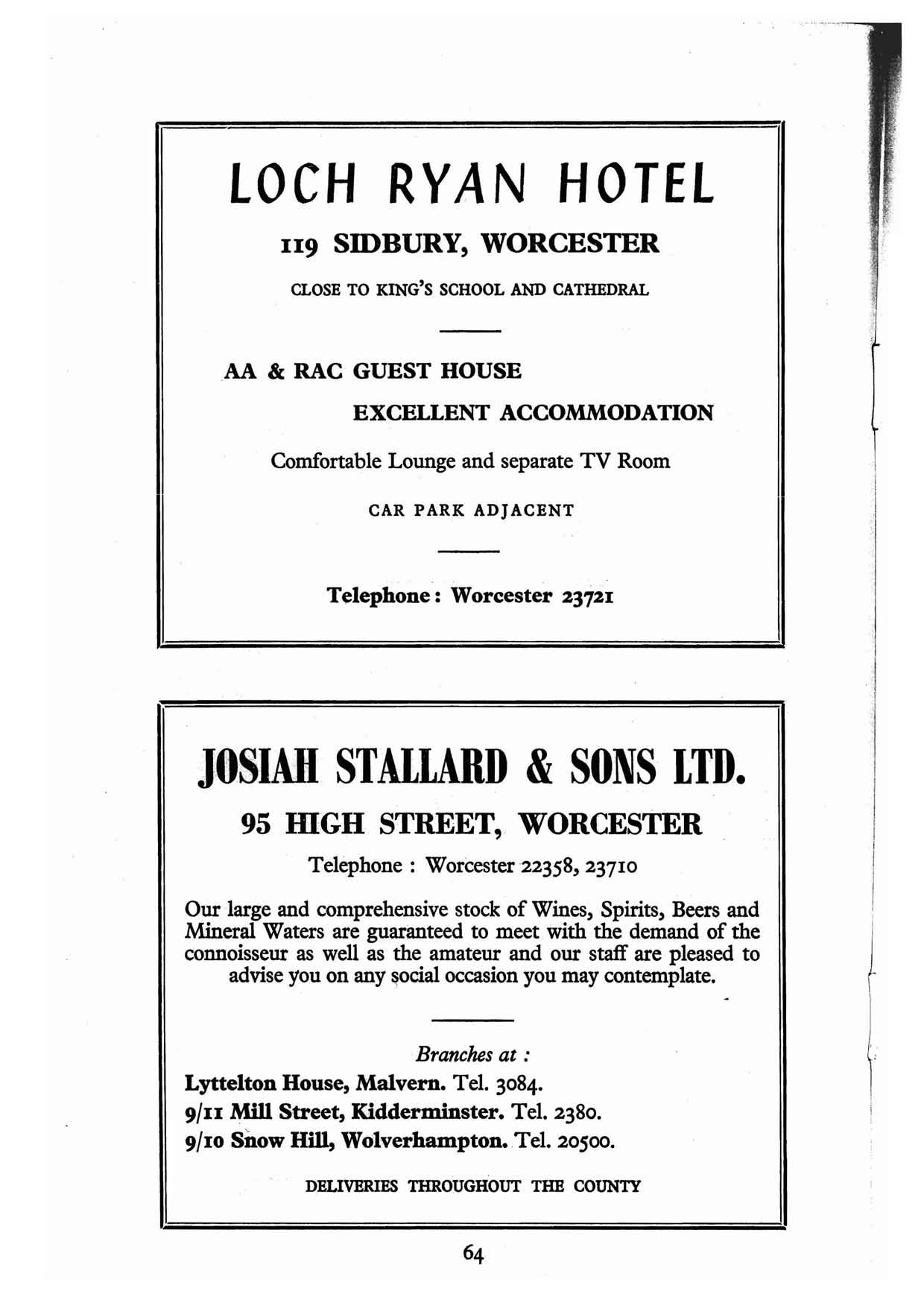
Telephone: Worcester-22358,23710
Our large and comprehensive stock of Wines, Spirits, Beers and
I Mineral Waters are guaranteed to meet with ·the demand of the connoisseur as well as the amateur and our staff are pleased to advise you on any occasion you may contemplate.
Branches at : Lyttelton House, Malvern. Tel. 3084. 9/11 Mill Street, Kidderminster. Tel. 2380. 9110 Snow Hill, Wolverhampton.Tel. 20500.
THROUGHOUT THE COUNTY